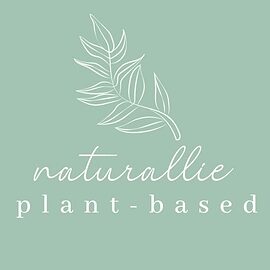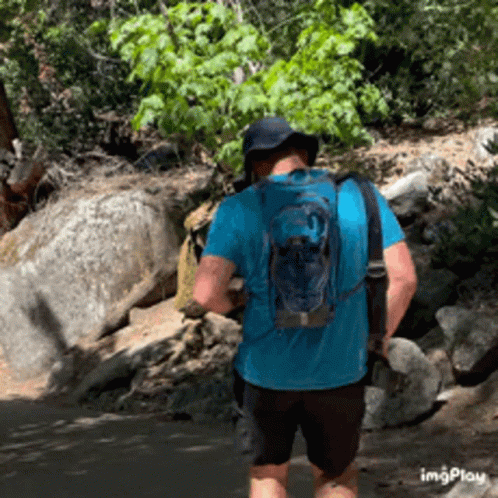
How to Survive and Thrive on the Trail as a Vegan Hiker
Hiking is one of life's simple pleasures—fresh air, scenic views, and a little adventure with every step. However, for vegan hikers, hitting the trail comes with its own set of challenges: packing plant-powered meals, staying fueled, and ensuring your outdoor adventure is as compassionate as it is exhilarating.
Whether you're a seasoned trekker or a weekend wanderer, this guide will show you how to survive and thrive on the trail while keeping your vegan lifestyle front and center.
Grab your boots, pack your snacks, and let's turn every hike into a mischief-filled, plant-powered adventure!

20 Great Vegan-Friendly Foods for Hiking
Heading out on the trail? Fuel your adventure with plant power! These vegan-friendly hiking foods are lightweight, energizing, and trail-tested to keep you going mile after mile.
1. Trail Mix
A classic hiking staple, trail mix combines crunchy nuts, protein-rich seeds, naturally sweet dried fruit, and a few dark chocolate chips for a touch of indulgence.
It's lightweight, easy to pack, and provides a perfect balance of carbs, protein, and healthy fats to keep your energy steady on long hikes. Additionally, you can customize it to your taste. Add coconut flakes, cacao nibs, or even a sprinkle of sea salt for an extra flavor boost. Make these trail mixes now.
5 Vegan Trail Mix Recipes
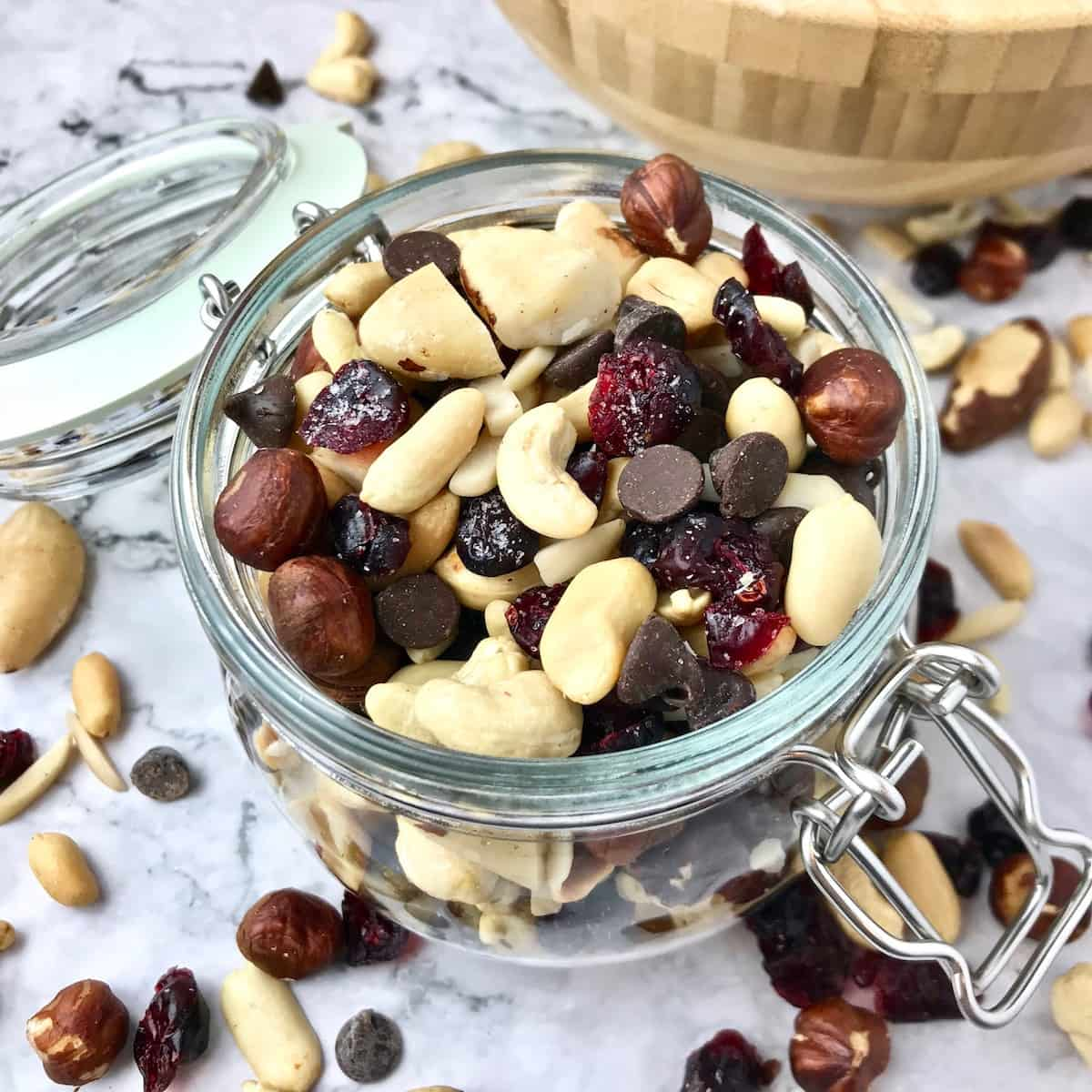
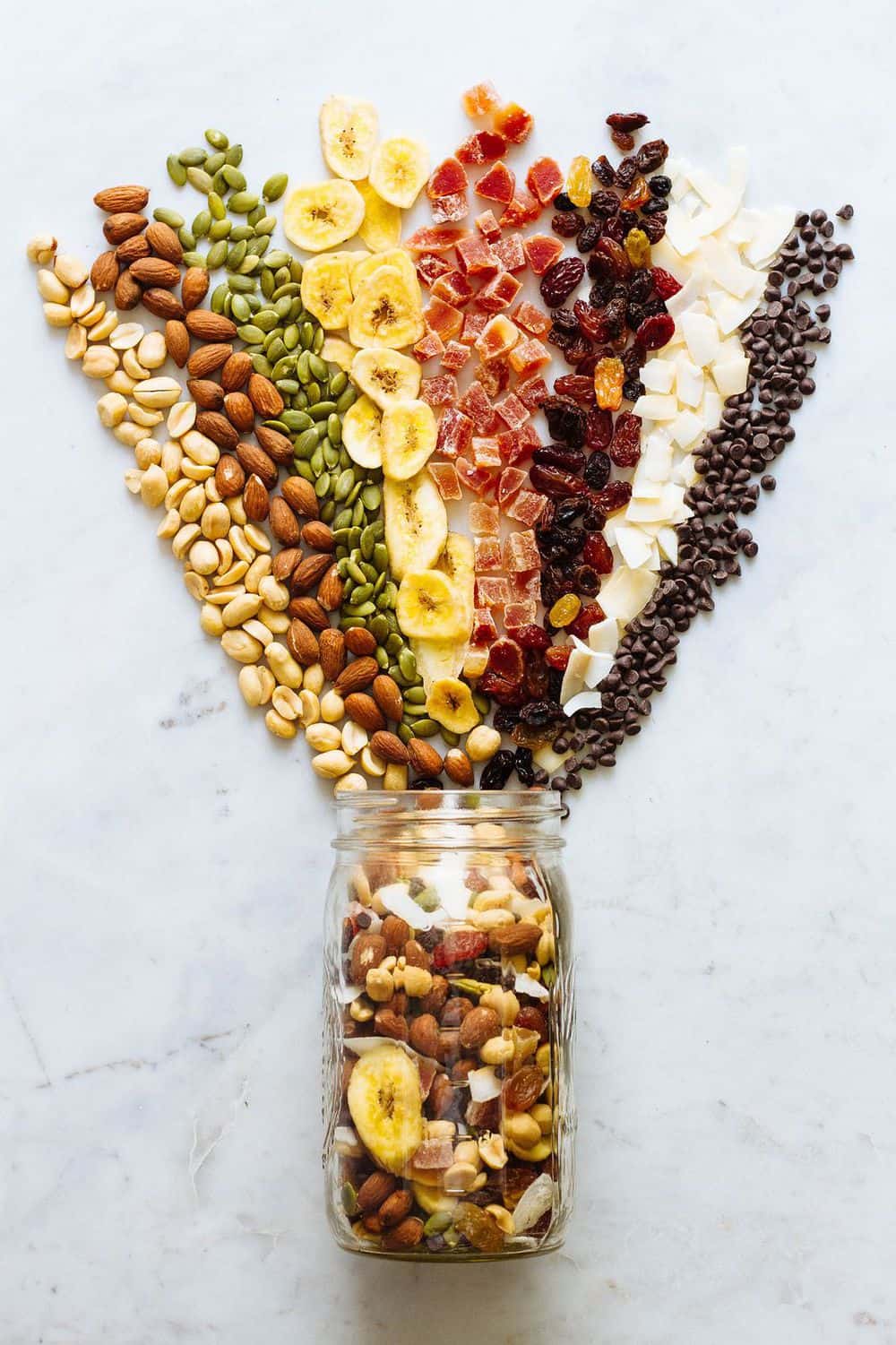
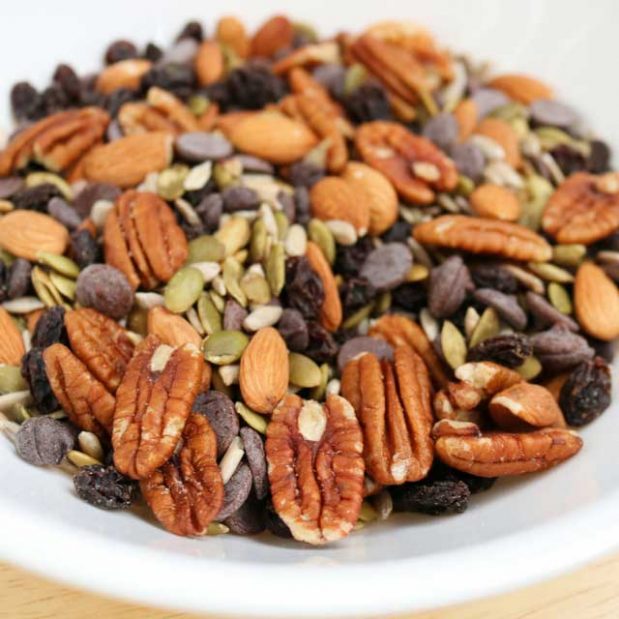
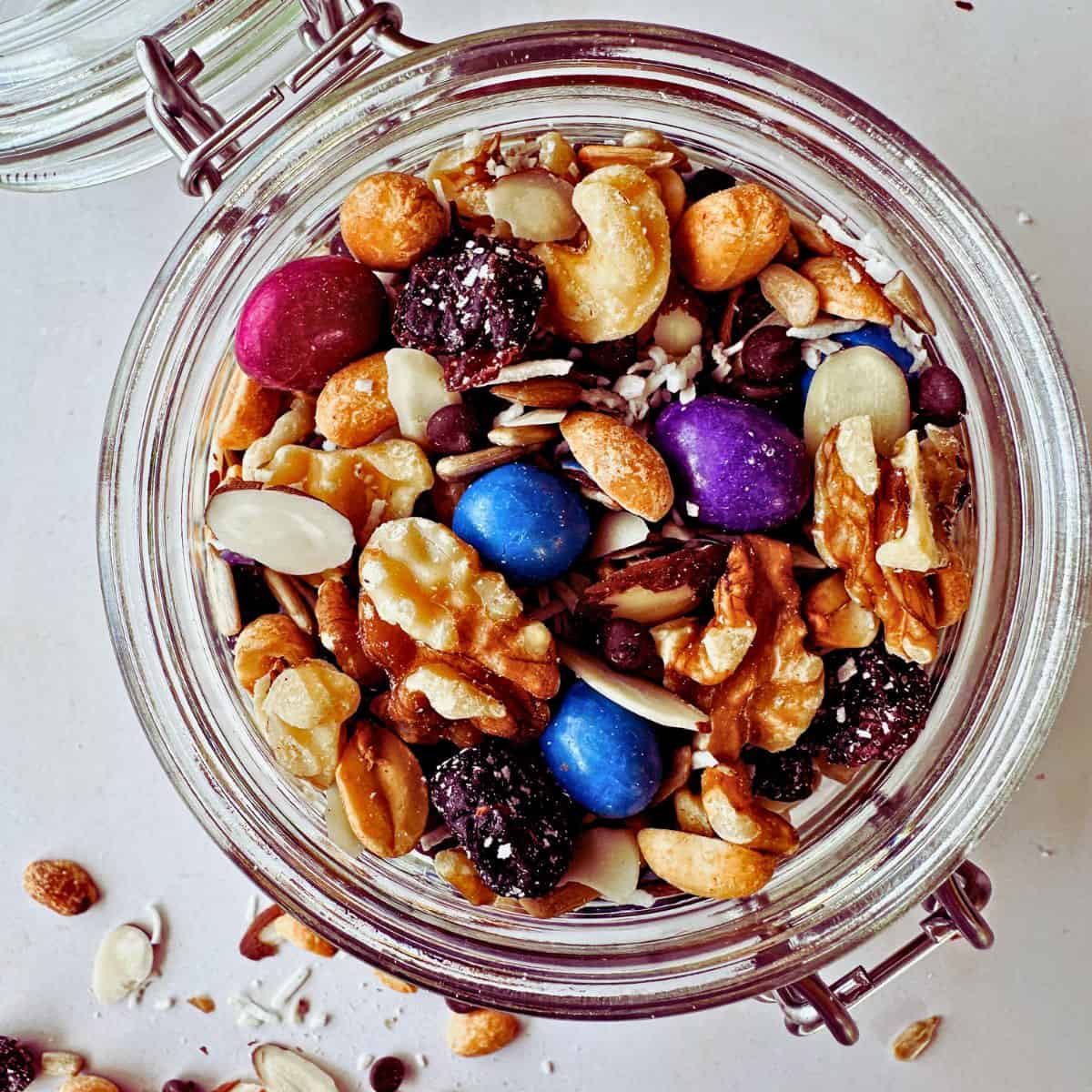
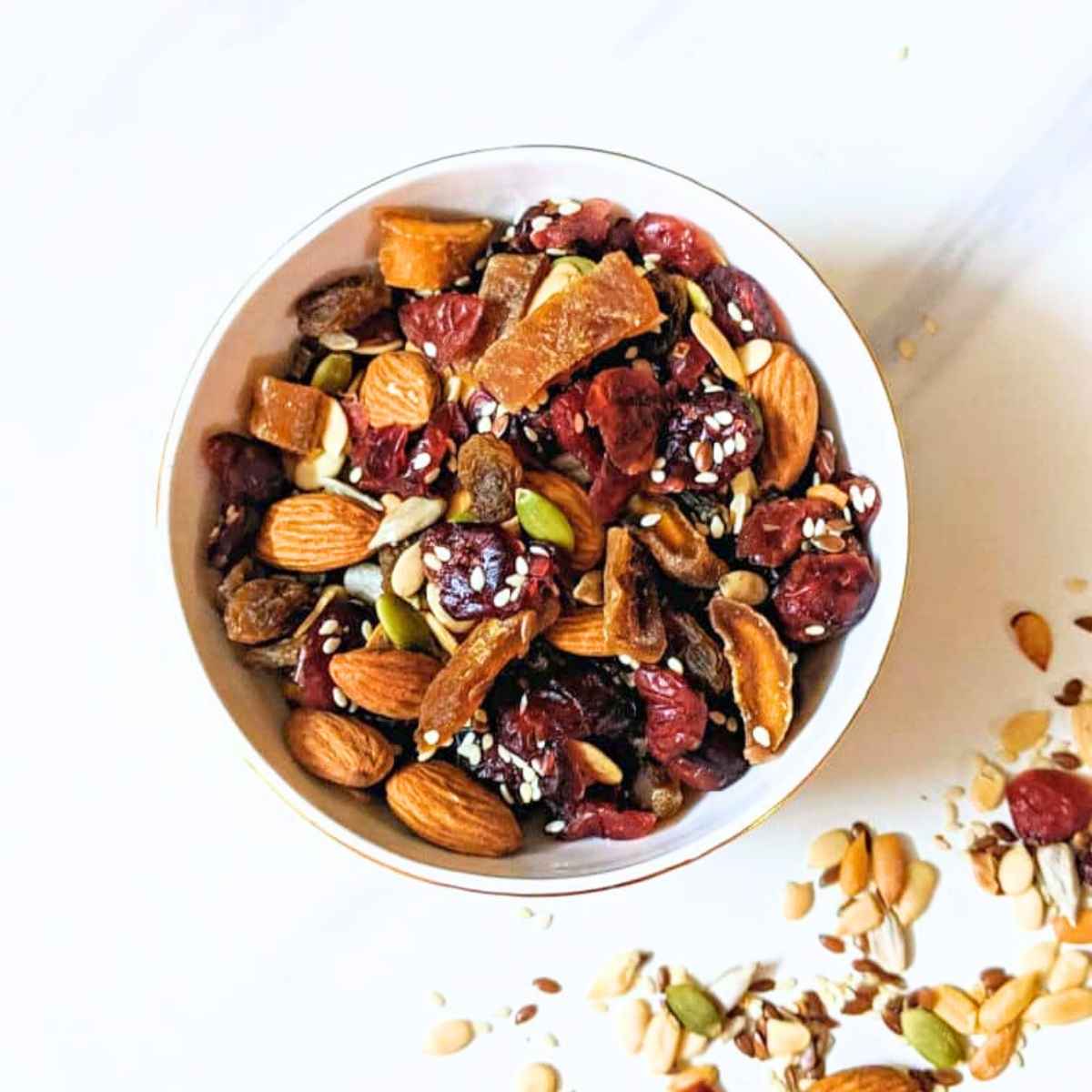
2. Energy Bars
Vegan energy bars are a convenient, portable snack designed to fuel your hikes with minimal fuss. Packed with oats, nuts, seeds, and natural sweeteners like dates, maple syrup, or agave, they provide a balanced mix of carbohydrates, protein, and healthy fats for sustained energy.
Many bars also include extras like dried fruit, cacao nibs, vegan chocolate chips, or superfoods such as chia or flax seeds, making them nutrient-dense and satisfying. Perfect for munching on the trail or as a quick pre-hike boost, these bars are customizable, easy to pack, and mess-free. Give these energy bars a try.
5 Vegan Energy Bar Recipes
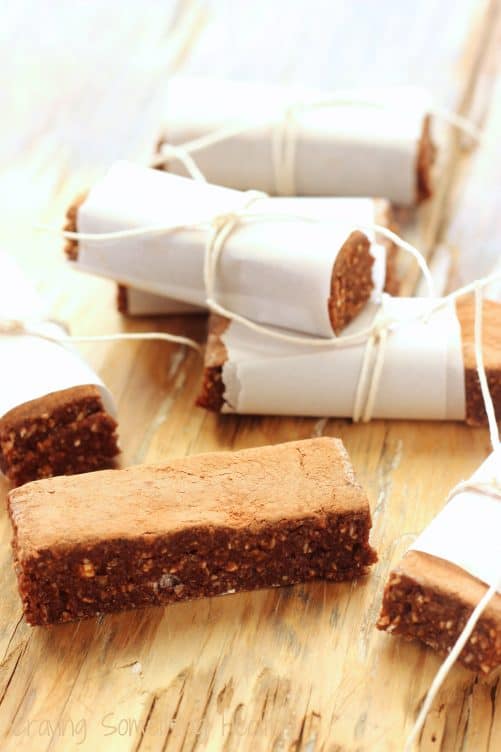
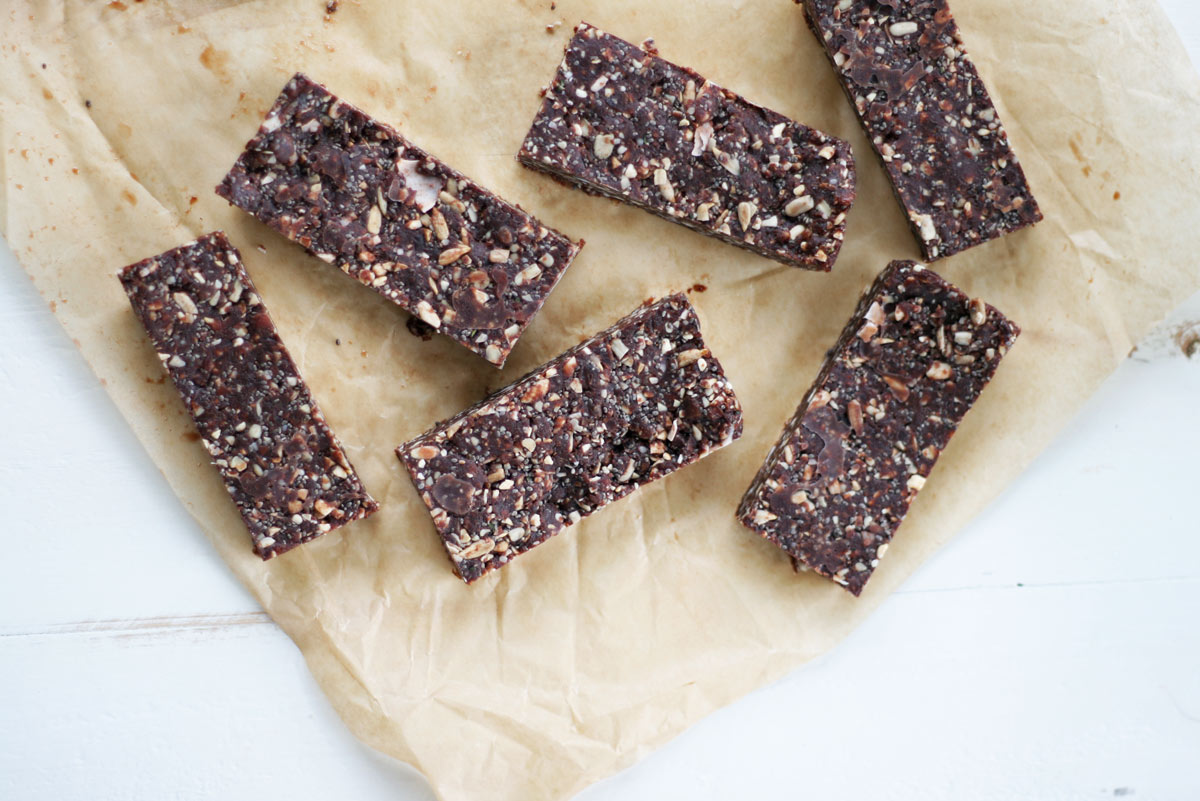
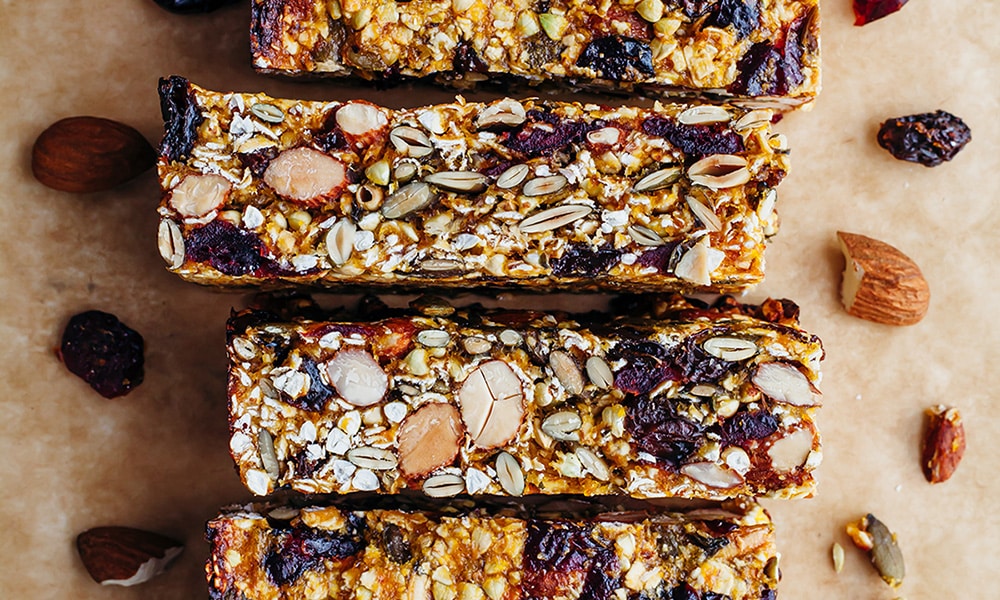
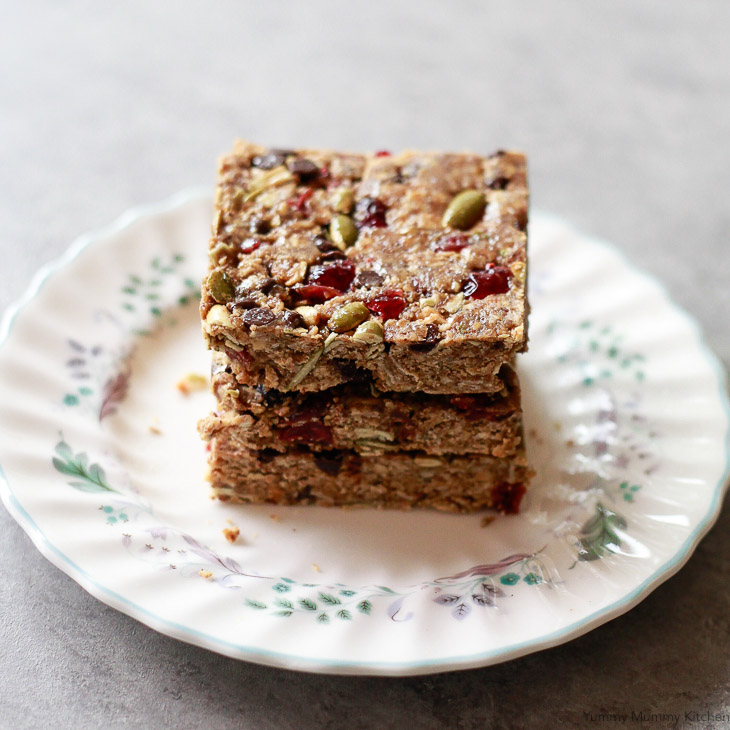

3. Energy Balls
These bite-sized powerhouses are perfect for on-the-go fuel. Whether homemade or store-bought, energy balls are usually made with a simple blend of dates, nuts, and oats—rolled into convenient little bites.
Naturally sweetened and packed with protein, fiber, and healthy fats, they deliver a quick burst of energy without weighing you down. You can also mix in extras like cocoa powder, coconut flakes, or chia seeds for variety and extra nutrients.
Lightweight and mess-free, they're a great option for snacking mid-hike or even sharing on the trail. Don't get tired. Make these energy balls today!
5 Vegan Energy Ball Ideas

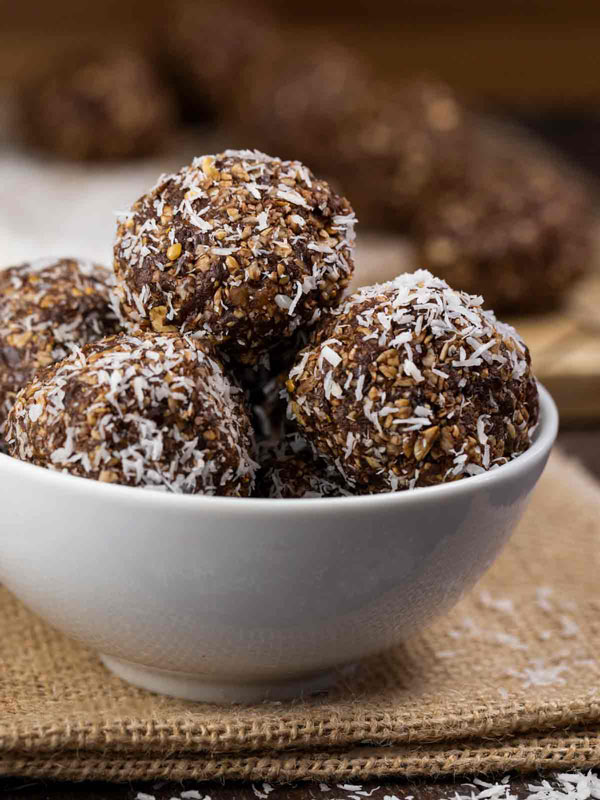
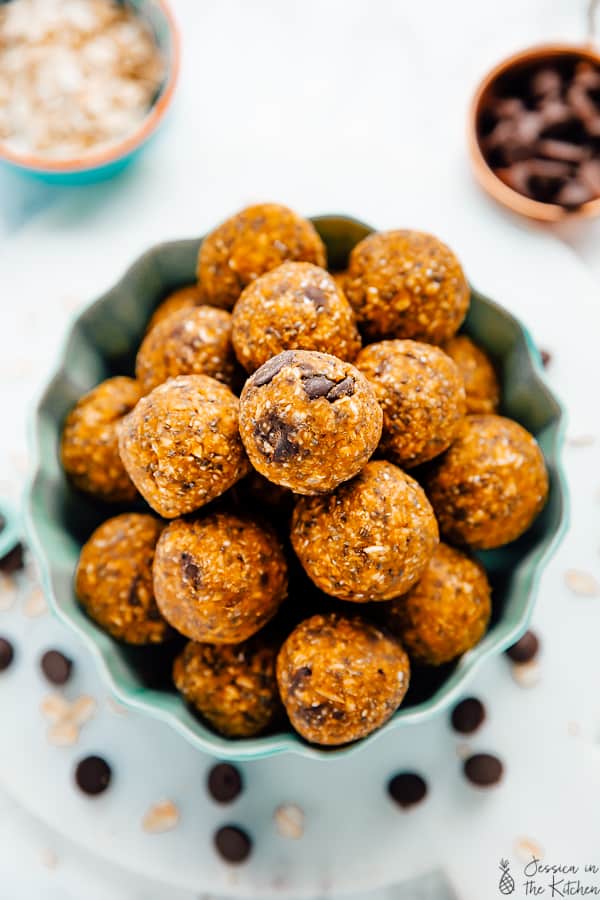
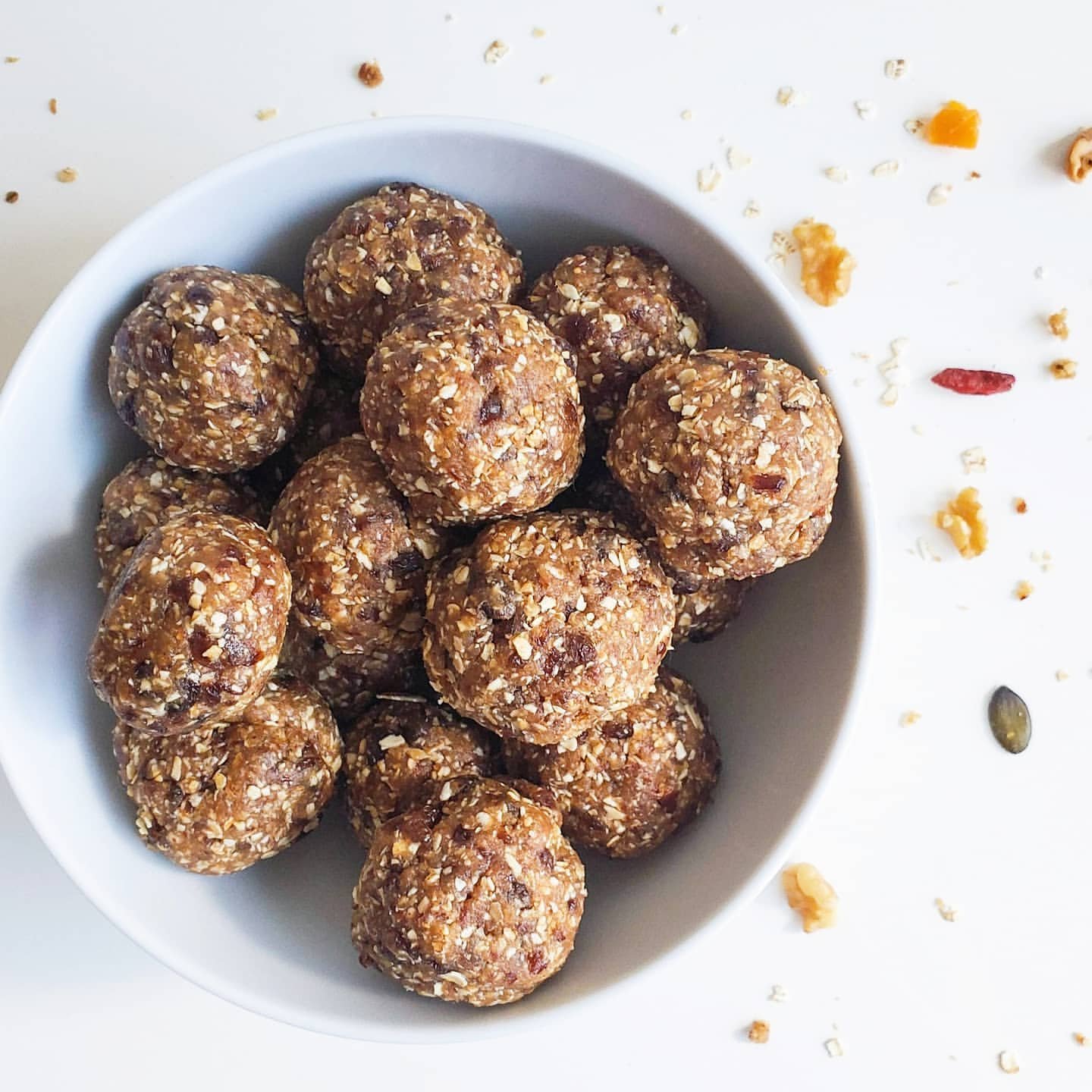
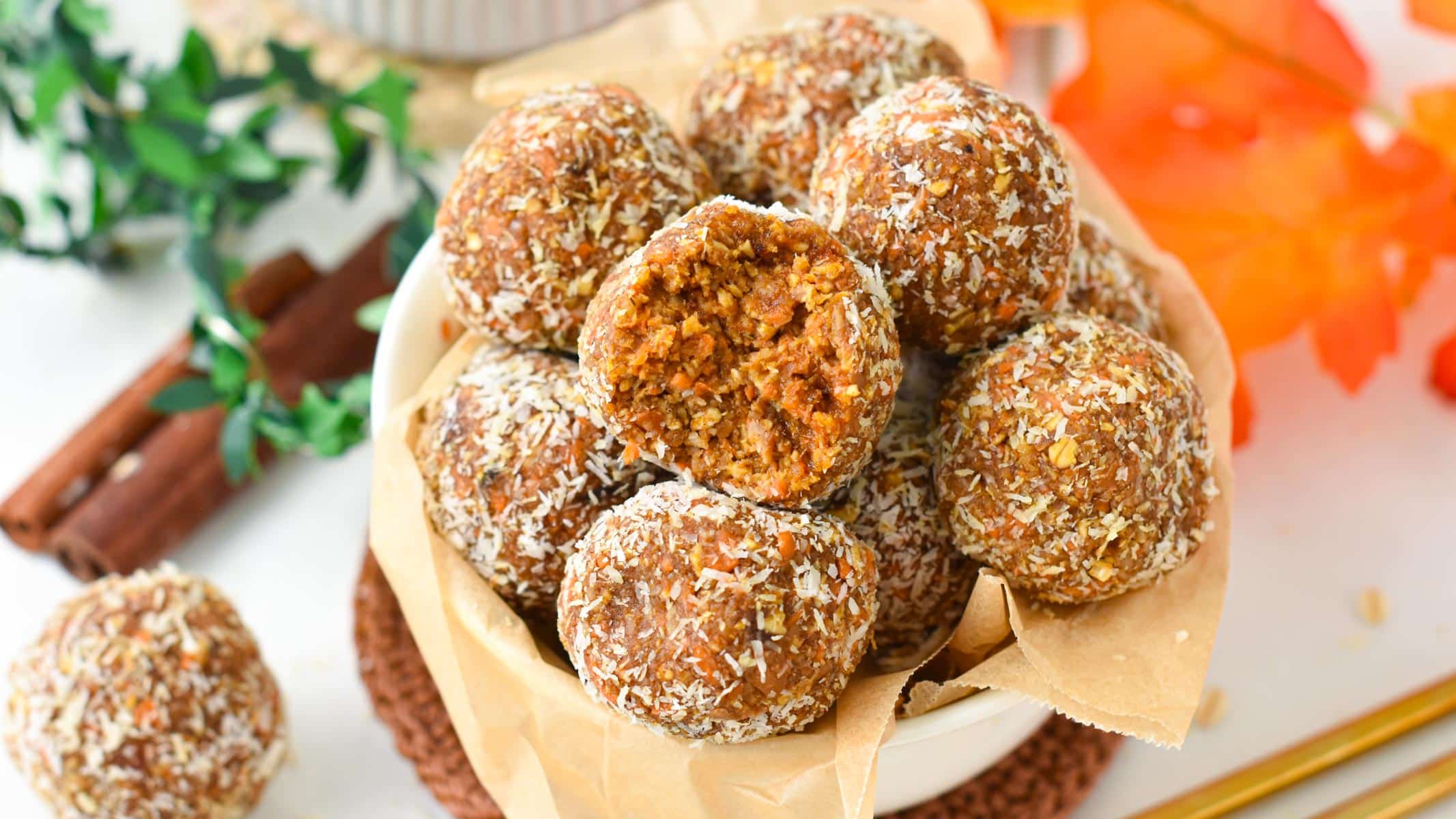
4. Fruit Salad
A colorful fruit salad is a refreshing way to pack in hydration and natural sugars on the trail. Mix sturdy fruits like apples, oranges, and grapes with softer picks like bananas or berries for a balance of crunch, juiciness, and sweetness. The variety provides quick energy, potassium to fight off muscle cramps, and vitamin C for a natural boost.
To keep things fresh, prep your salad in a leakproof container or mason jar and add a squeeze of lemon juice to prevent browning. Fruit salad is not only nourishing but also a mood-lifter—a bright burst of flavor that feels like a treat after a few miles on the trail.
Orange you glad it's fruit o'clock? Eat some today!
5 Vegan Fruit Salads
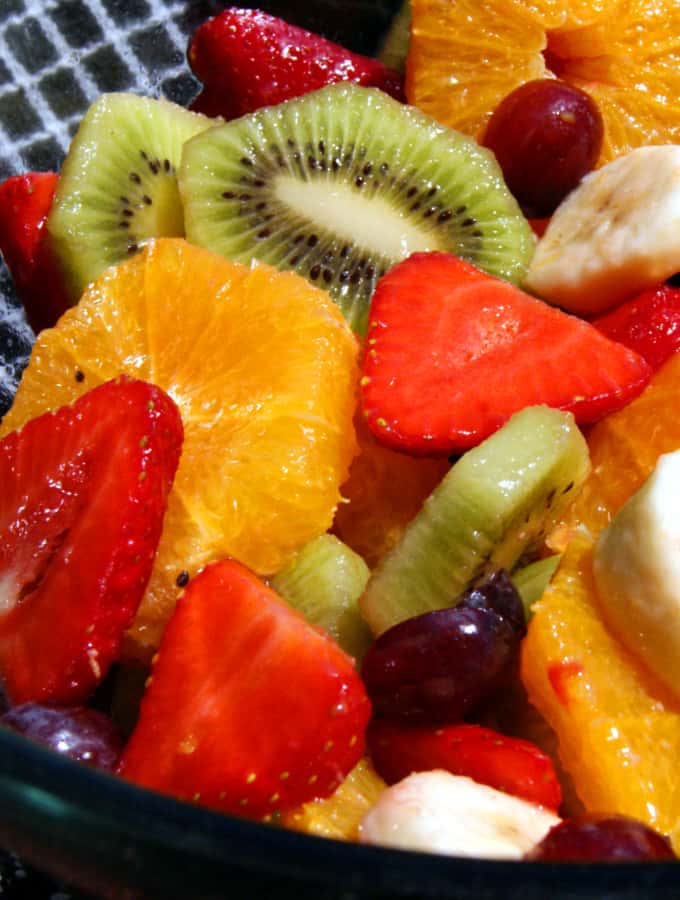
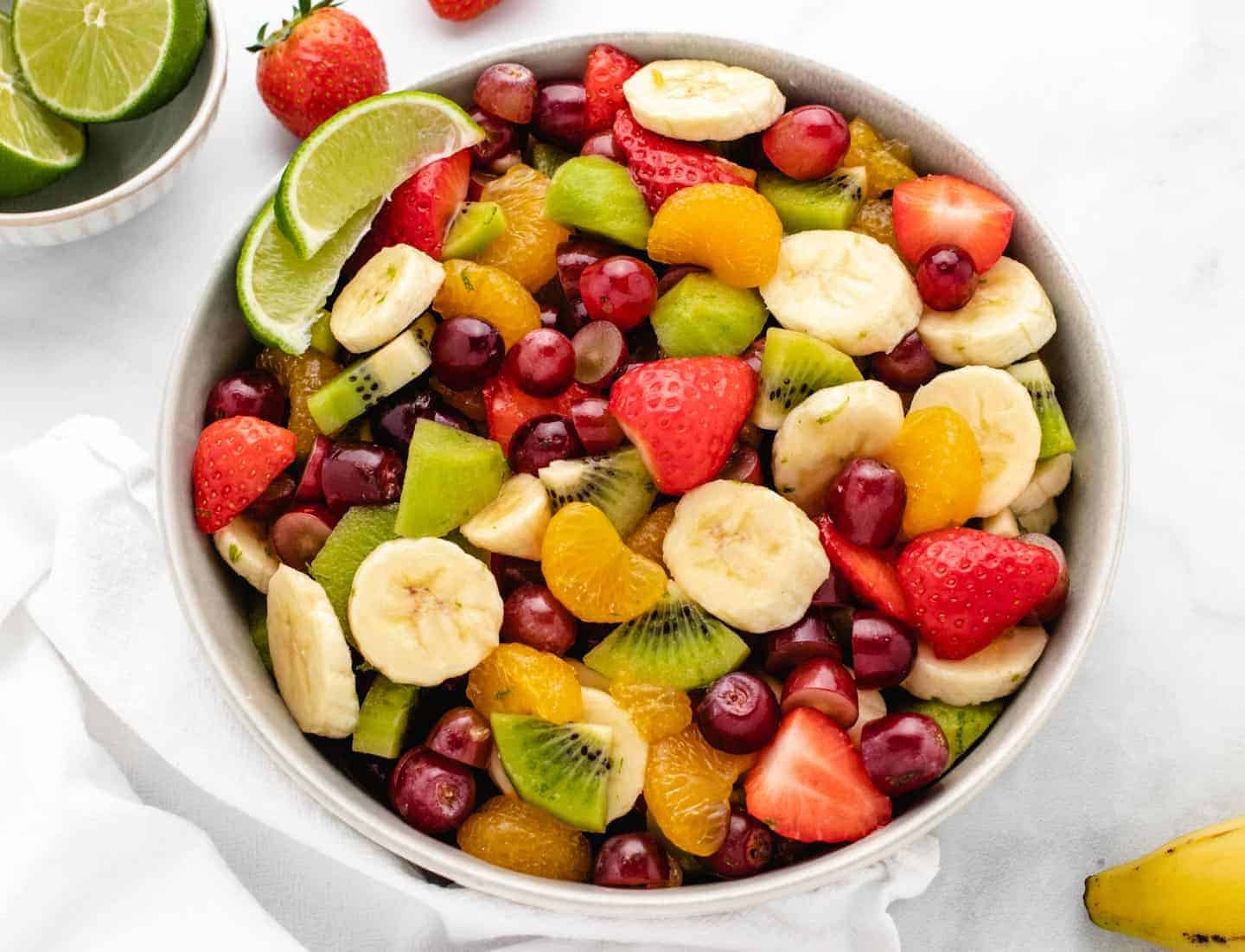
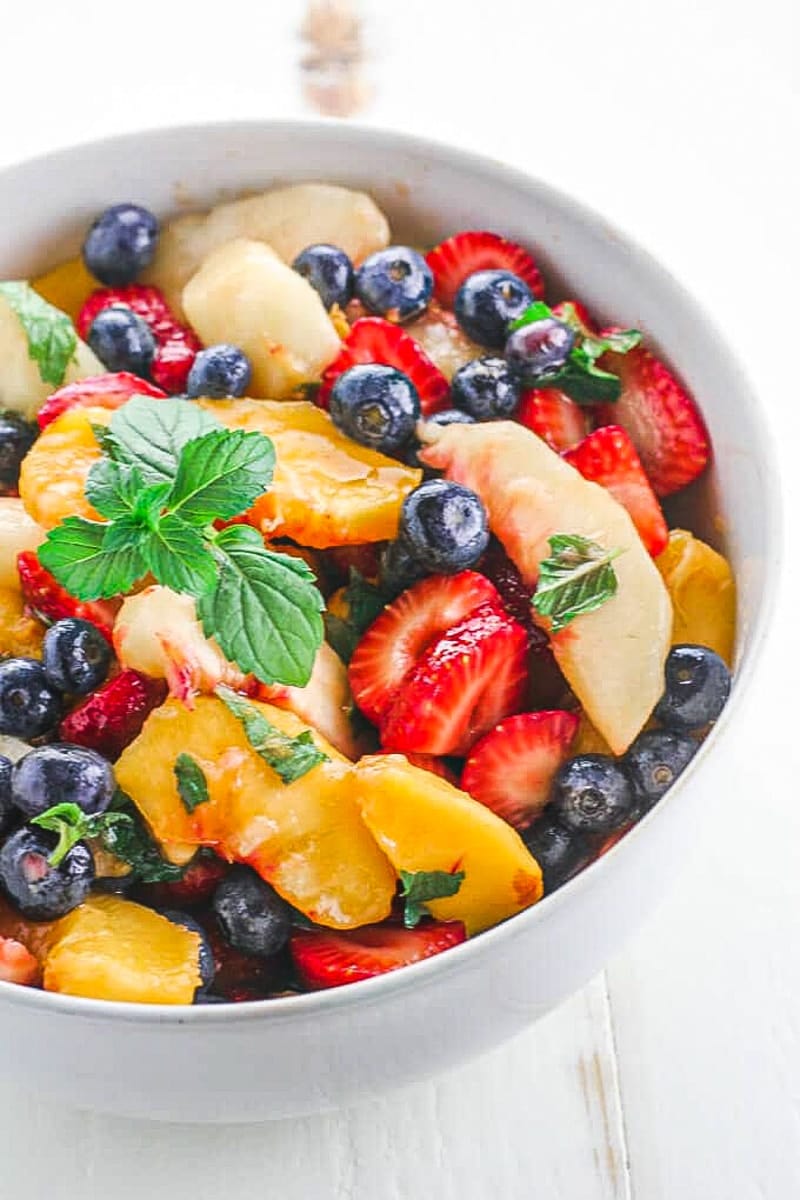
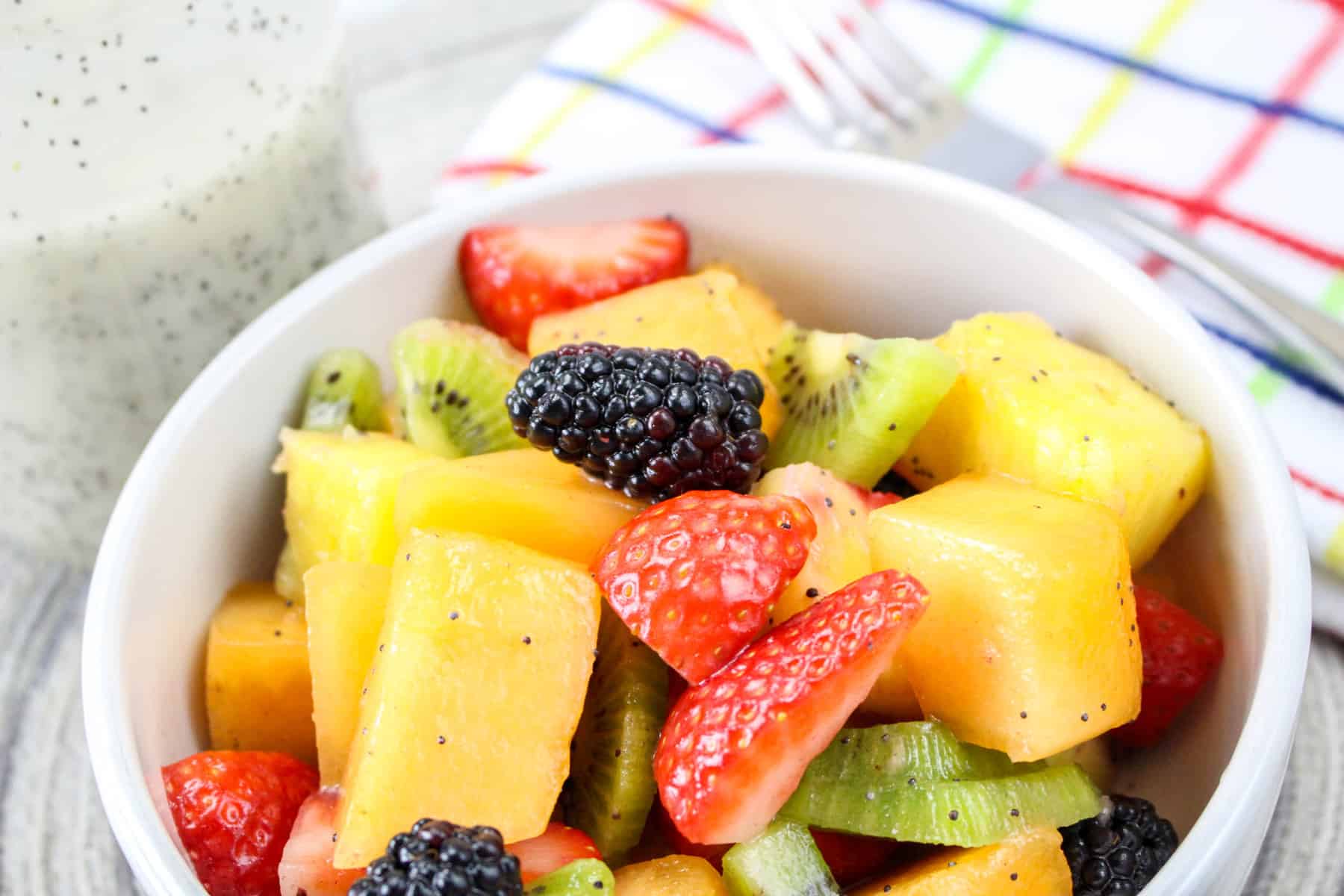
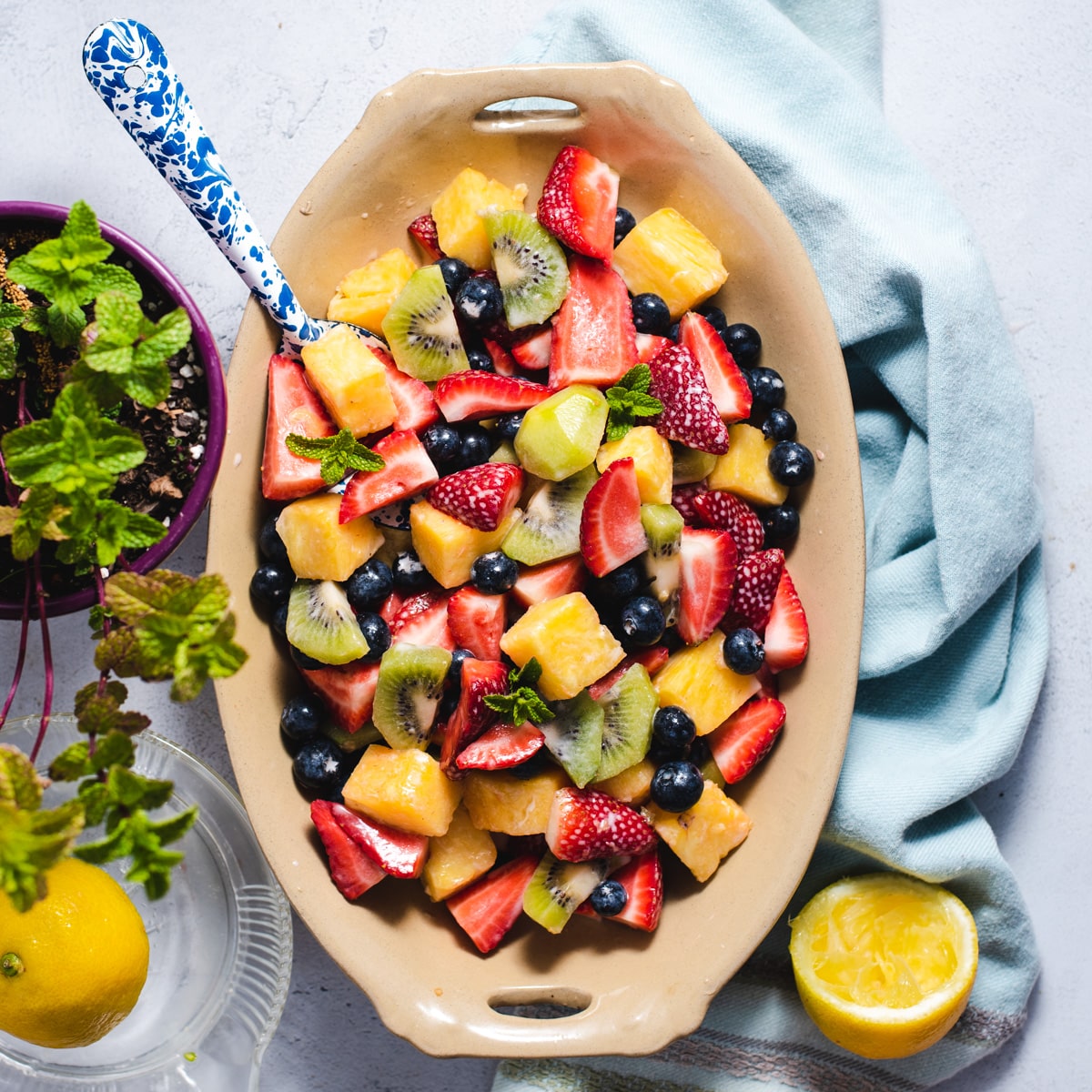
5. Dried Fruit
Lightweight, calorie-dense, and naturally sweet, dried fruit is a classic hiking snack for good reason. Options like raisins, apricots, figs, and mango slices deliver quick, easily digestible energy that can power you through steep climbs and long stretches on the trail.
They're also rich in essential nutrients:
- Apricots provide potassium for muscle support.
- Figs add a dose of fiber.
- Raisins are packed with iron.
- Mangoes bring a tangy burst of vitamin A.
Unlike fresh fruit, dried varieties won't bruise or spoil in your pack, making them perfect for longer treks. Pair dried fruit with nuts or seeds for a balance of carbs, protein, and healthy fats, or enjoy them on their own for a chewy, satisfying pick-me-up.
Don't go bananas. Go dried! Pack a fruity punch for your hike.
5 Dried Fruit Ideas
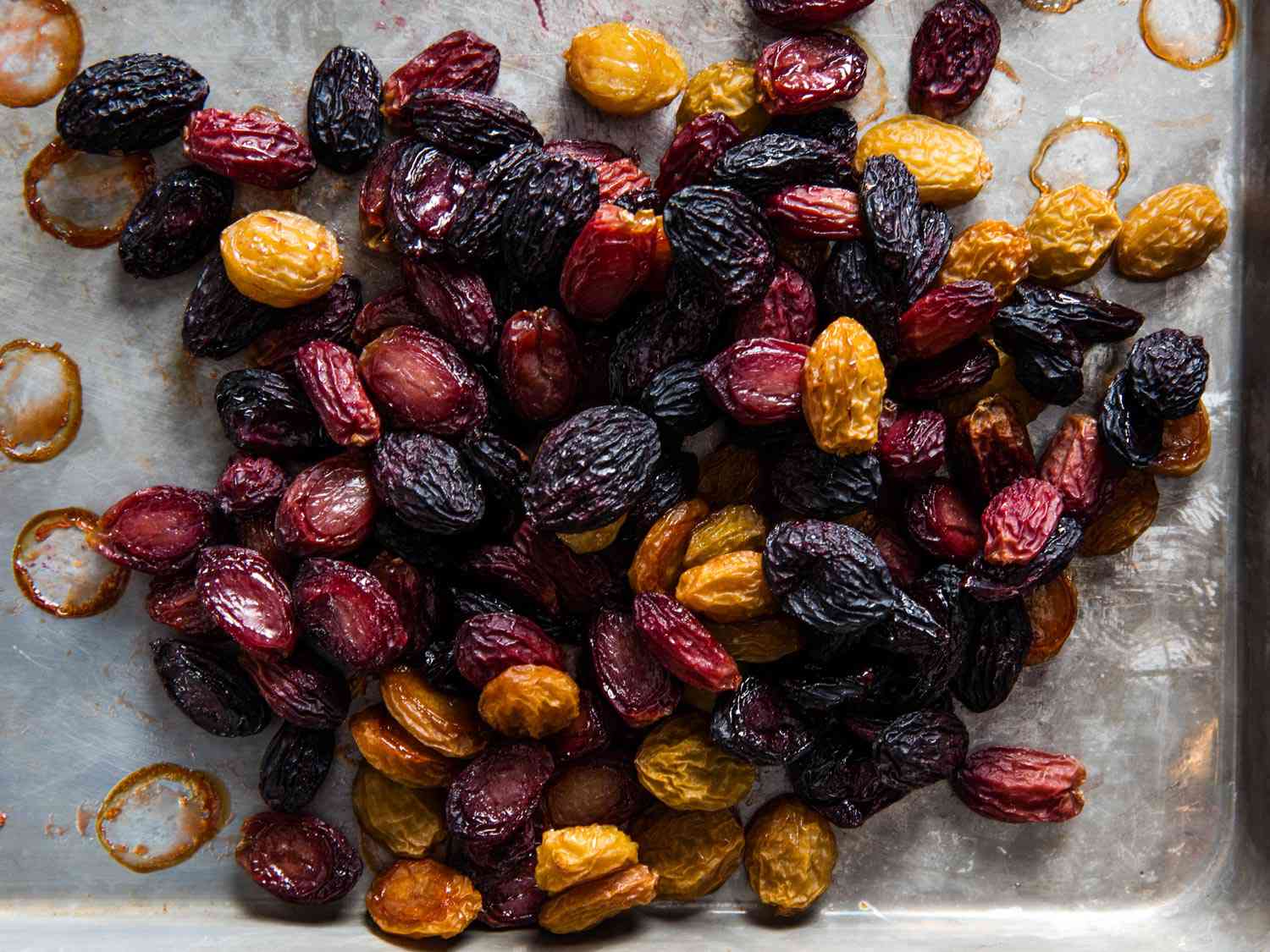

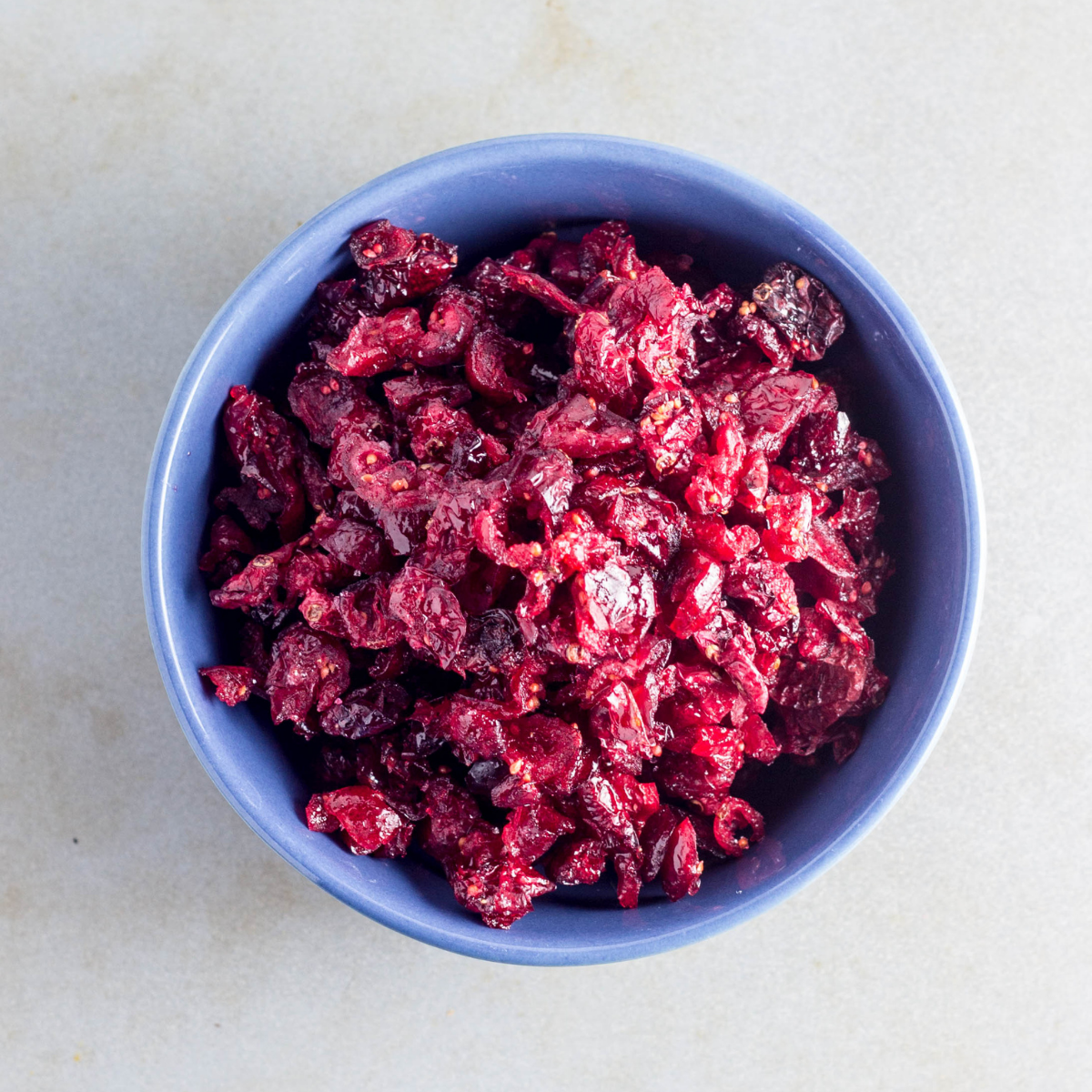


6. Nut Butter
Single servings of almond, peanut, or cashew butter are a hiker's secret weapon. Packed with protein, healthy fats, and calories, nut butter provides long-lasting energy that keeps you feeling full and fueled during tough climbs.
The creamy texture makes it an easy pairing with apple slices, bananas, or whole-grain crackers, but it's just as satisfying eaten straight from the packet when you need a quick pick-me-up.
Unlike jars, single servings of nut butter are lightweight, mess-free, and perfectly portioned for the trail, so you can enjoy the benefits without weighing down your backpack. Plus, the combination of protein and fat helps stabilize blood sugar, preventing the dreaded energy crash after carb-heavy snacks.
Spread the love. Pack some nut butter for your next hike.
5 Vegan Nut Butter Recipes
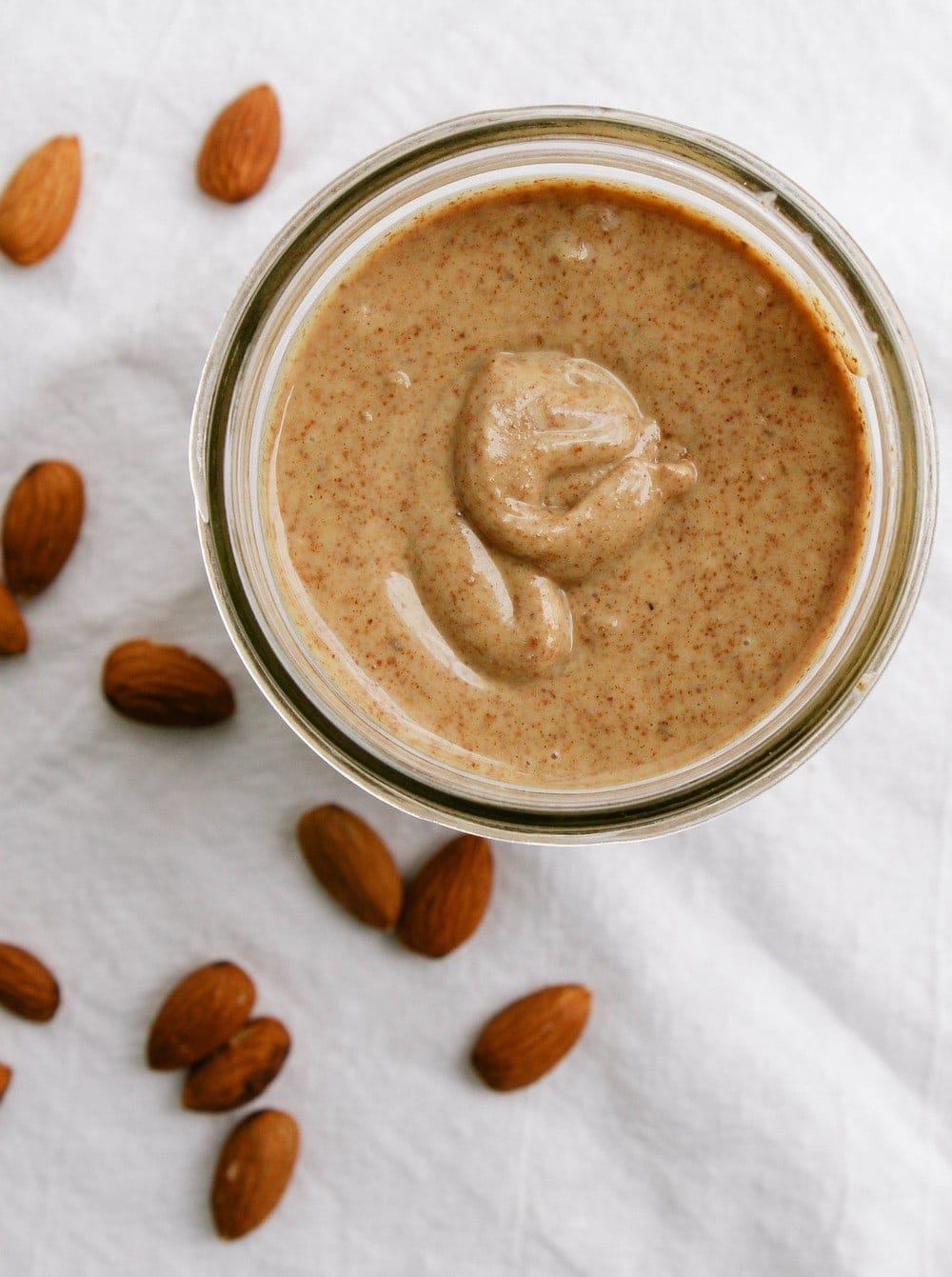
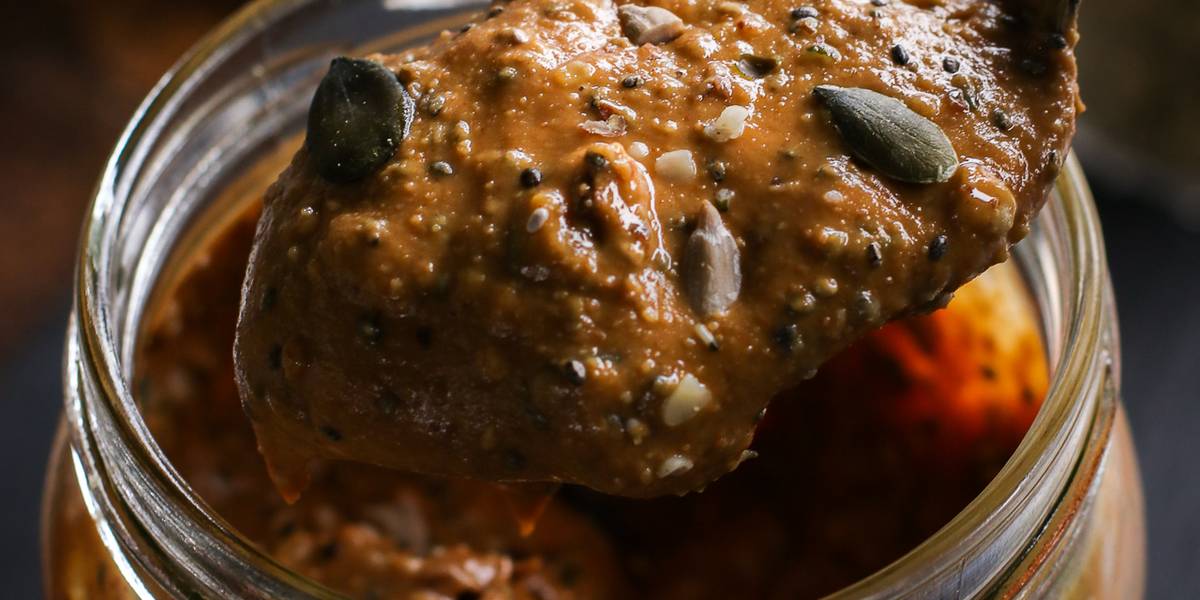
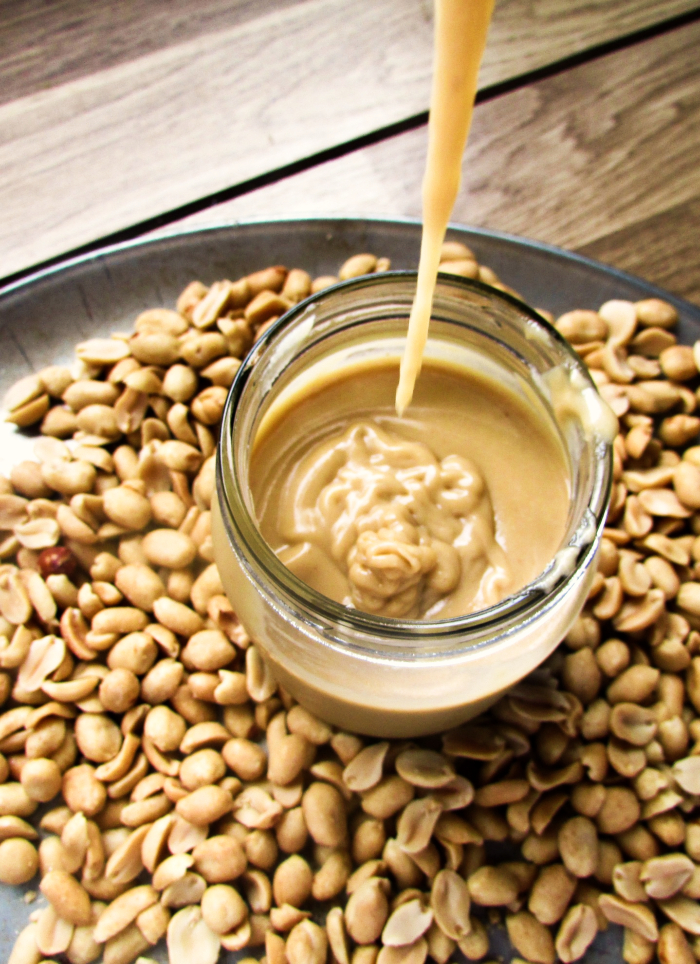
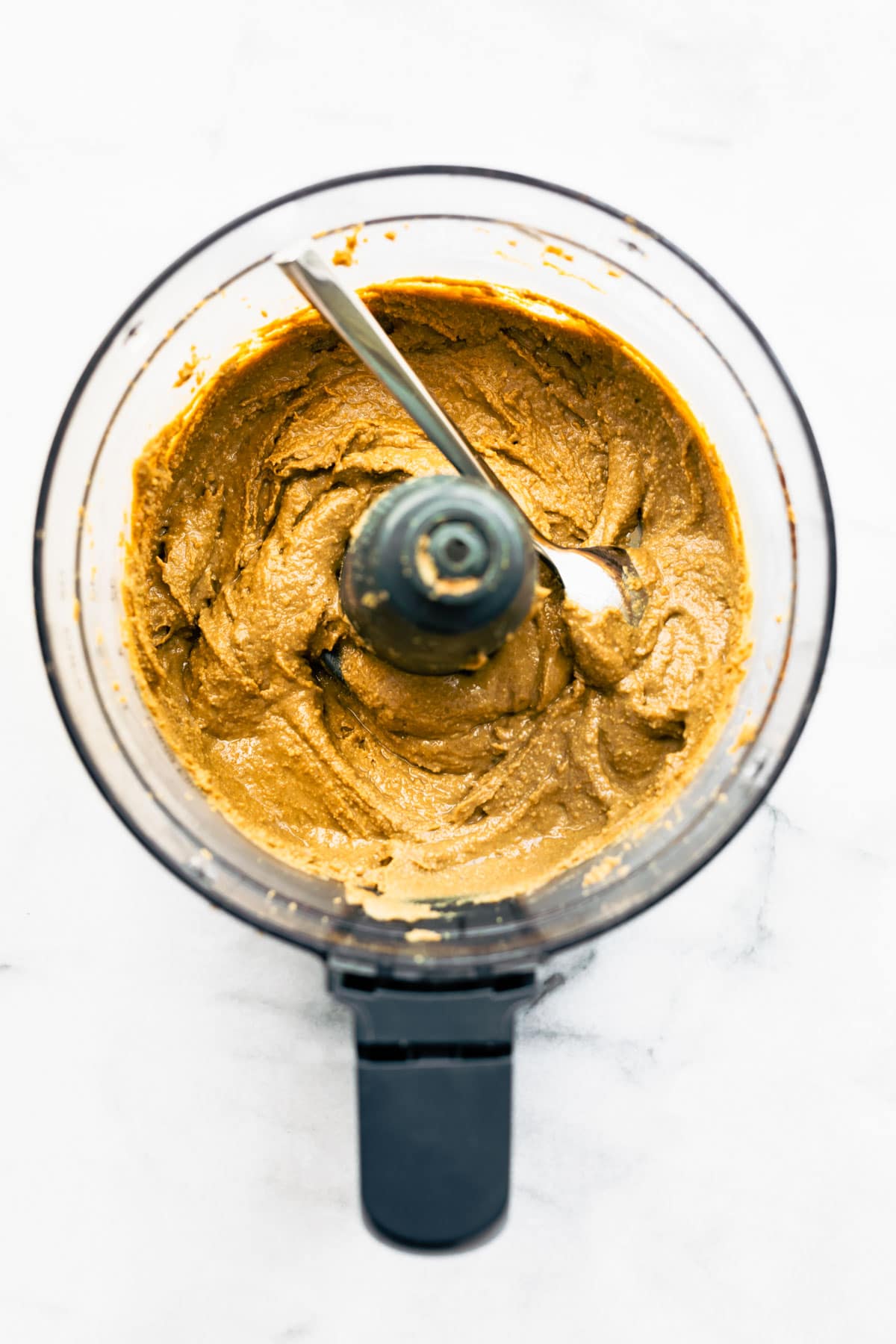
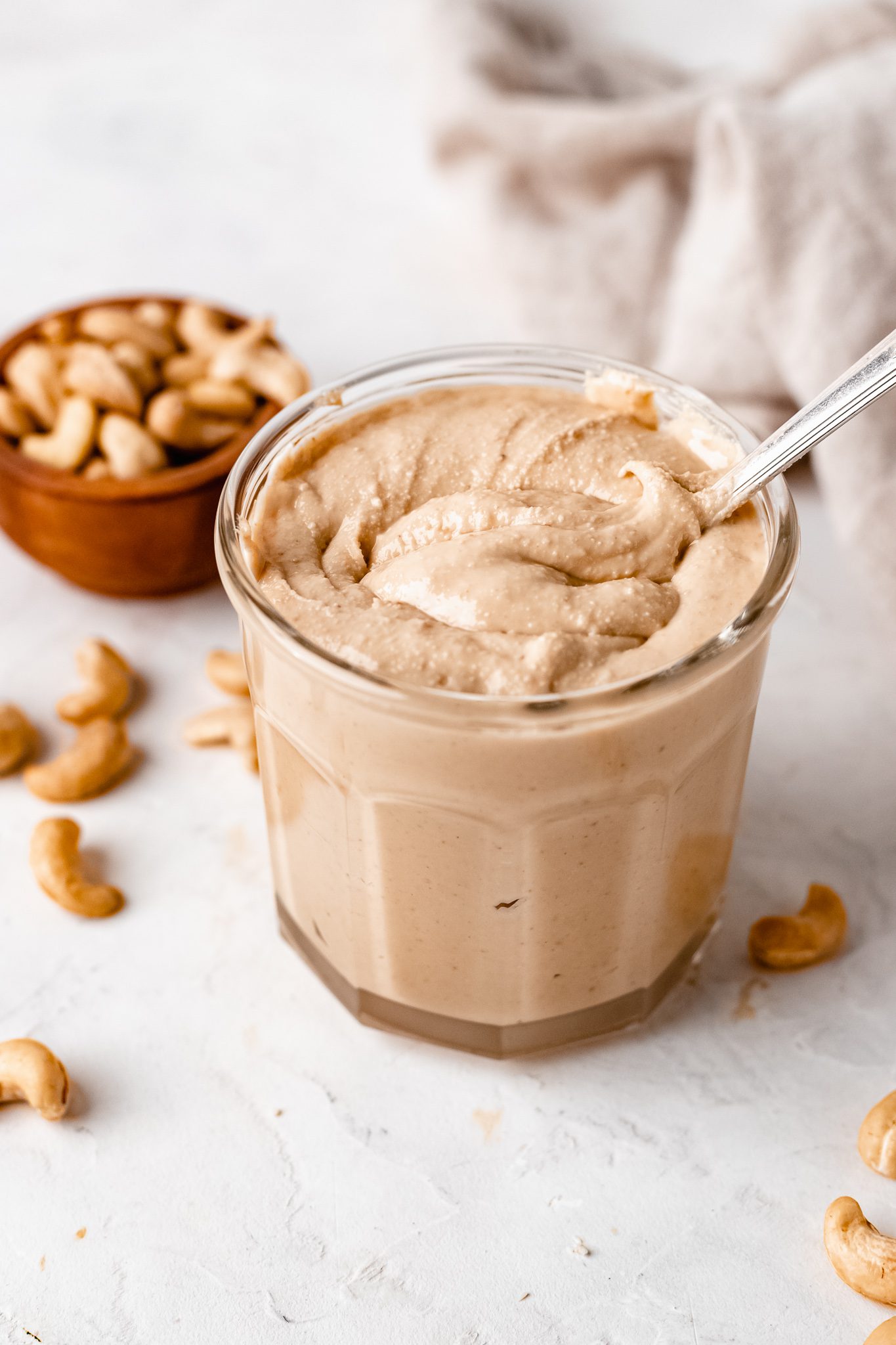
7. Roasted Chickpeas
Light, crispy, and endlessly snackable, roasted chickpeas are a powerhouse hiking food. They're packed with plant-based protein, fiber, and complex carbs that keep your energy levels steady on the trail.
Their salty crunch makes them a satisfying alternative to chips, while seasonings like smoked paprika, garlic, or chili lime add extra flavor to keep snack time exciting. Best of all, they're lightweight and travel well—no refrigeration needed—so you can toss a bag into your pack without worry.
Whether you make them at home or grab a store-bought version, roasted chickpeas are a crunchy, crave-worthy way to fuel your adventure. Chick it out. Crunch into some roasted chickpeas today!
5 Vegan Roasted Chickpea Recipes




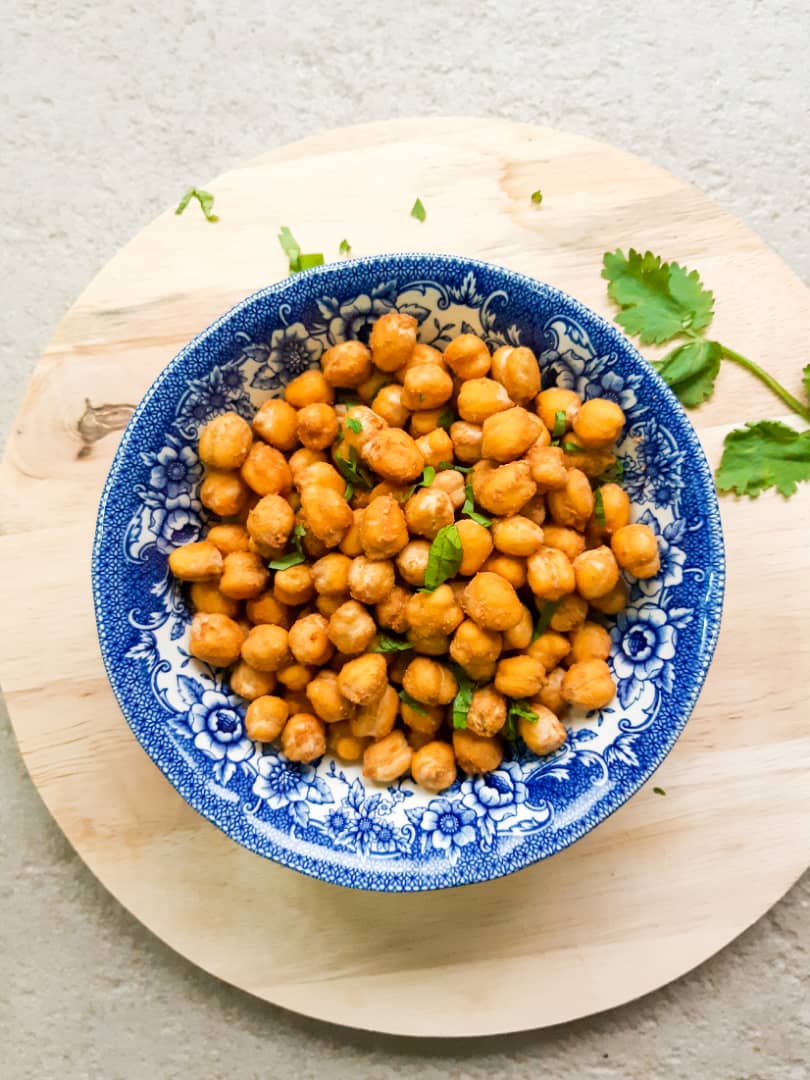
8. Plant-Based Jerky
For hikers who crave something savory, plant-based jerky is a trail MVP. Made from mushrooms, soy, seitan, or jackfruit, it delivers that chewy, satisfying bite and bold flavor you'd expect from traditional jerky—without the meat.
It's loaded with protein and often seasoned with smoky, spicy, or teriyaki-style marinades that make every bite feel like a treat. Beyond flavor, plant-based jerky is lightweight, non-perishable, and easy to stash in a side pocket of your backpack for quick, on-the-go fuel.
Whether you buy it pre-made or experiment with DIY versions at home, it's a hearty, savory snack that balances out all the sweet trail foods. Don't go bacon your heart. Pack some plant-based jerky instead!
5 Vegan Jerky Recipes
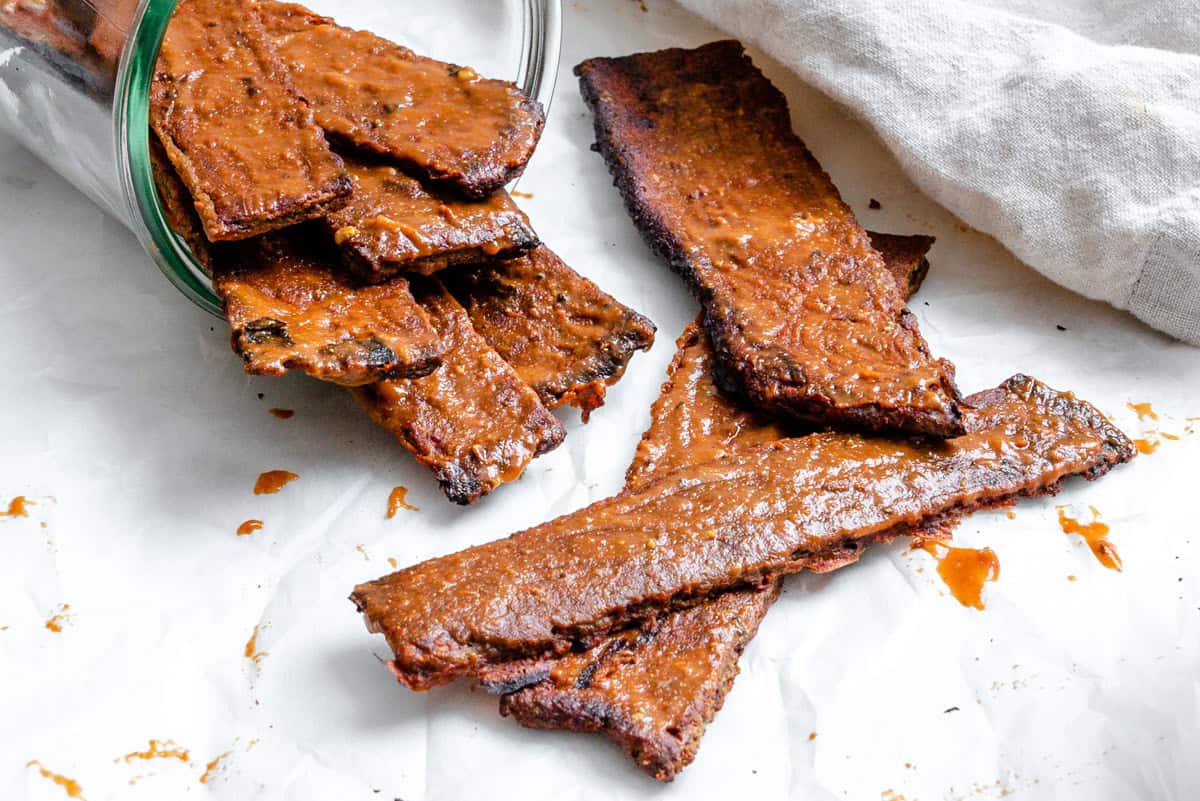


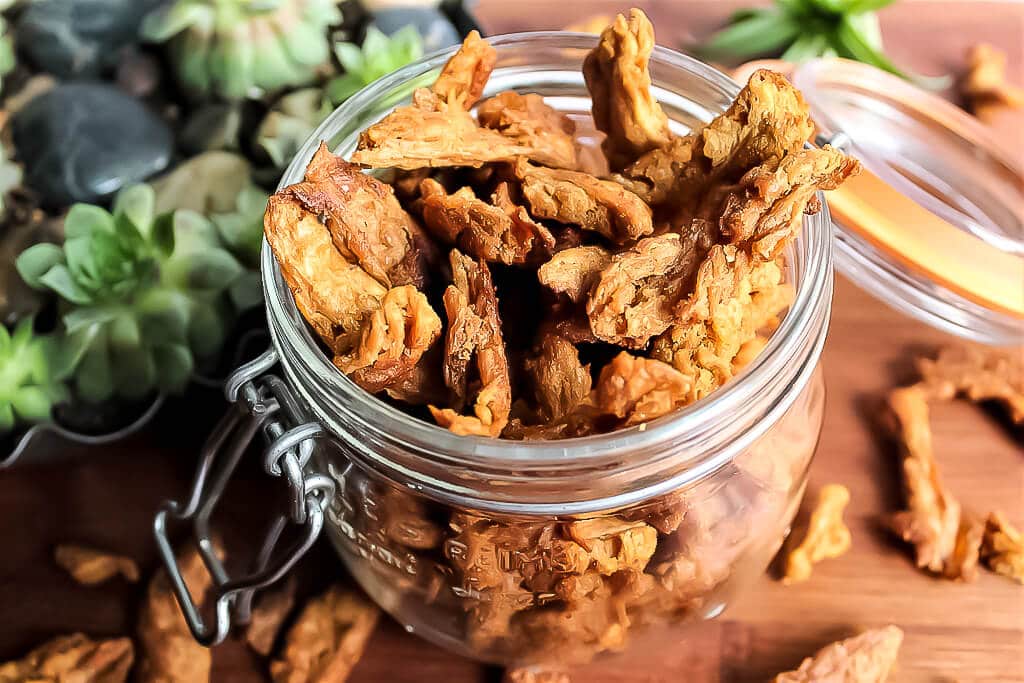

9. Crackers
Simple, crunchy, and versatile, crackers are a hiker's secret weapon for building quick, filling snacks on the go. Pair them with single-serve nut butter packs for a protein boost, or mash up an avocado to spread on top if you're carrying fresh produce for a day hike.
Whole-grain or seeded varieties offer extra fiber and staying power, while lighter rice or corn crackers are easy to pack and won't weigh down your bag. They also double as a great base for trail-friendly toppings like hummus, vegan cheese, or roasted chickpeas for a mini "hiking charcuterie."
Crackers may seem humble, but on the trail, they're a crunchy canvas for creativity and fuel. Crack into adventure. Pack some crunchy crackers today!
5 Vegan Cracker Recipes

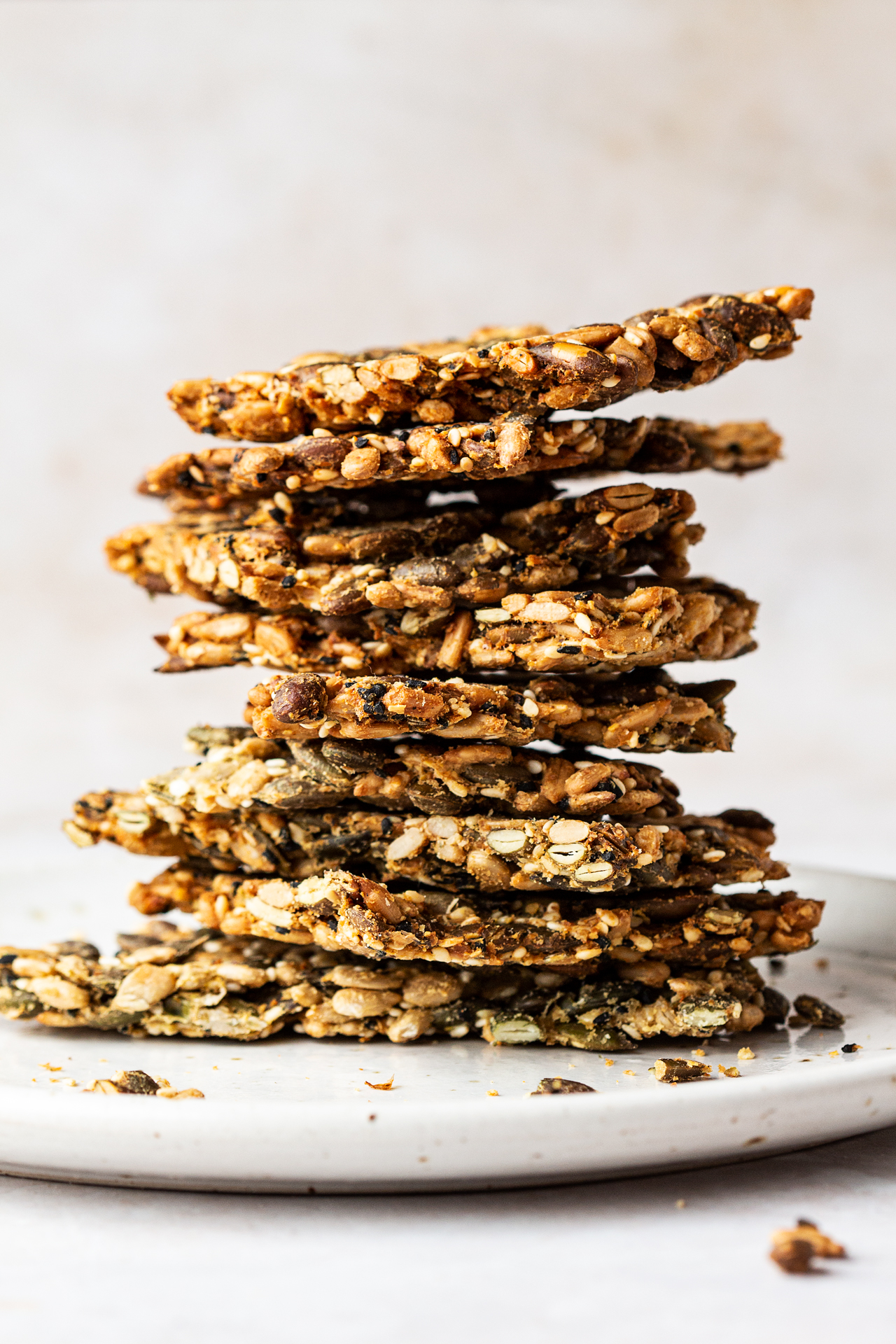


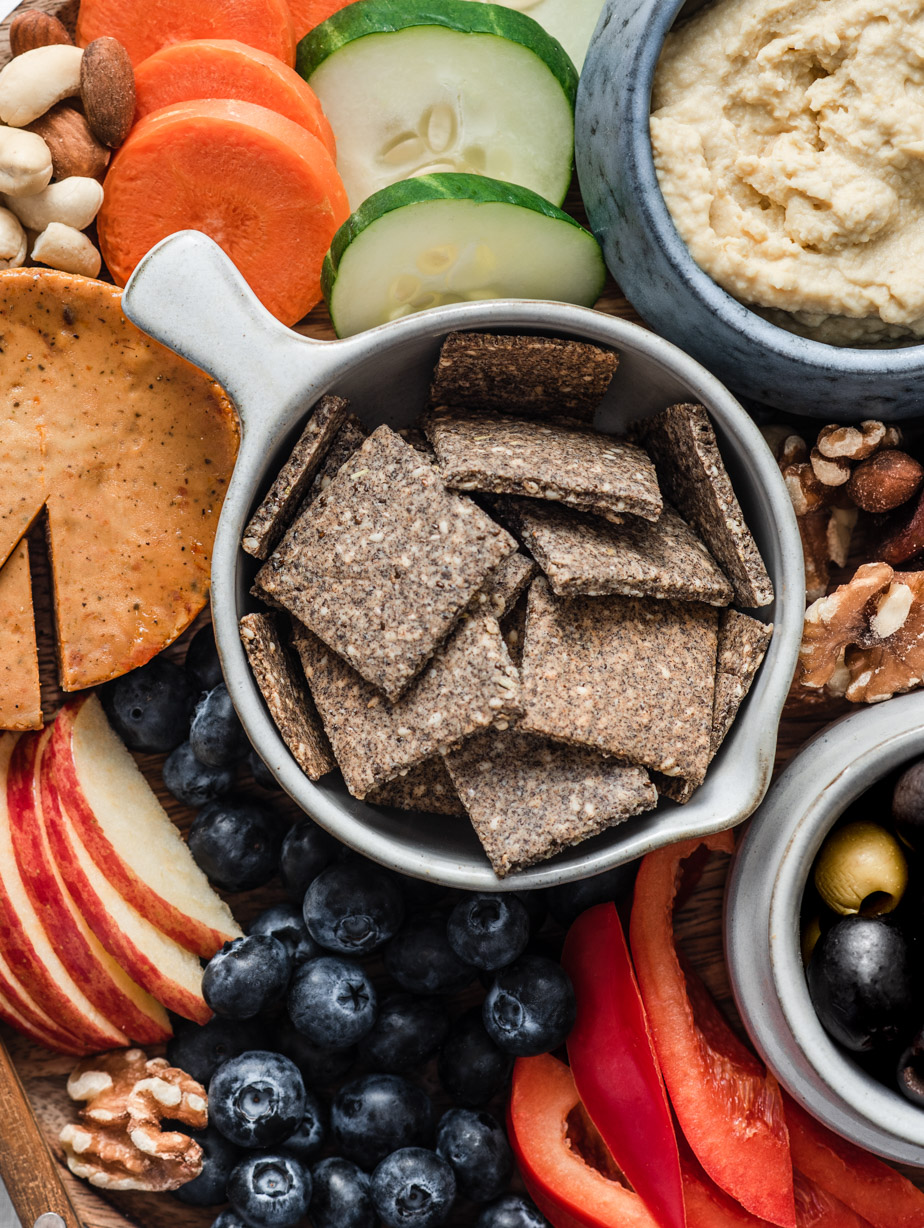
10. Popcorn
Light, airy, and endlessly munchable, popcorn is a trail snack that doesn't weigh you down—literally or figuratively. It's naturally low in calories but still satisfies that craving for something crunchy and salty on long hikes.
Air-popped popcorn is the lightest option, while seasoning it with nutritional yeast, smoked paprika, or garlic powder adds a savory kick (and a little extra B-vitamin boost). Pack it in a reusable bag to keep it fresh, and you'll have a snack that feels indulgent without slowing you down.
Unlike chips, popcorn won't get crushed as easily, making it a surprisingly practical option for your backpack. Pop on the trail. Bring popcorn for your next hike!
5 Vegan Popcorn Recipes



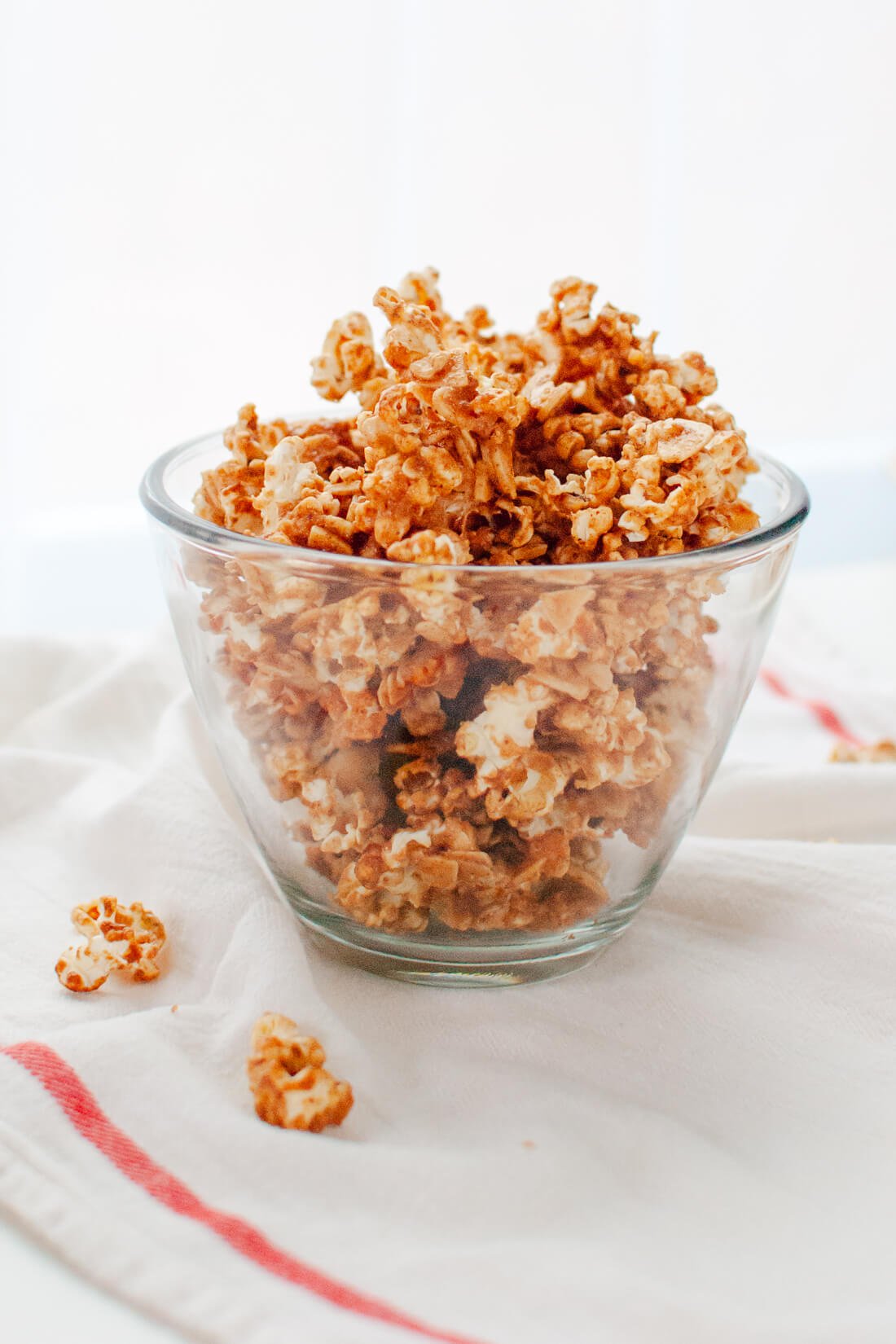

11. Hummus and Veggies
Creamy, savory, and packed with plant-powered protein, hummus is a hiker's best friend. Pair it with crisp veggies like carrot sticks, cucumber slices, bell pepper strips, or even snap peas for a refreshing crunch that balances out the richness of the dip.
Not only does hummus deliver fiber, protein, and healthy fats, but it's also versatile enough to keep snack time exciting. You can go classic with garlic and lemon, try a smoky roasted red pepper version, or even spice things up with a jalapeño hummus.
For the trail, pack single-serve hummus cups or portion homemade hummus into a small reusable container. Pair it with your veggies of choice, and you've got a satisfying, hydrating snack that fuels your hike while tasting indulgent.
Try these fun hummus recipes and bring them along with your favorite veggies on your next hike. You'll thank yourself later!
5 Vegan Hummus Ideas
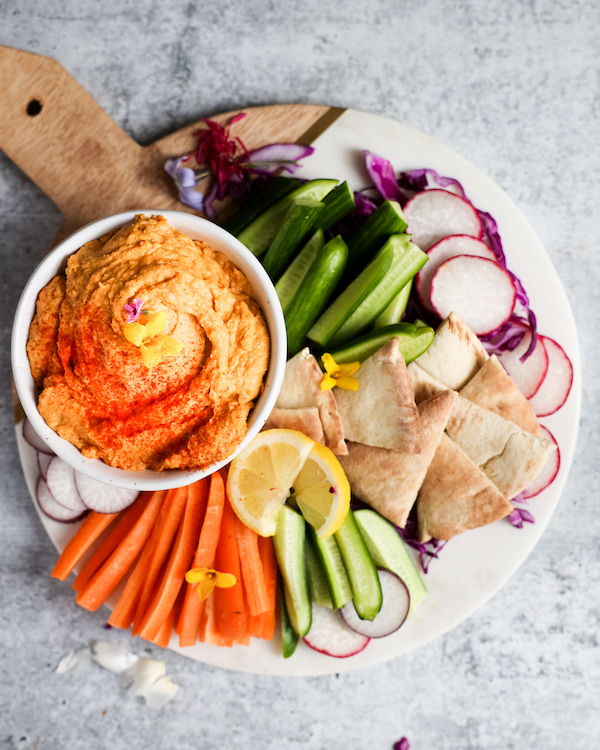
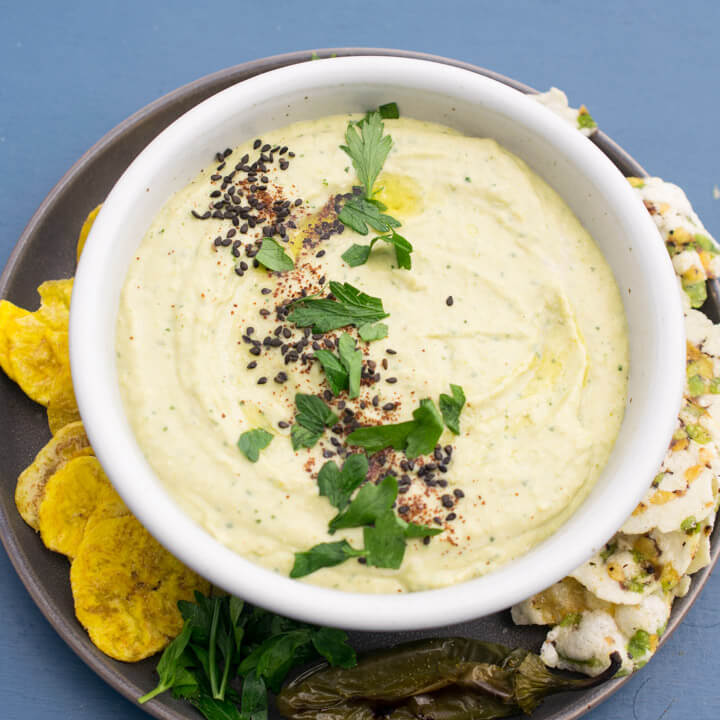
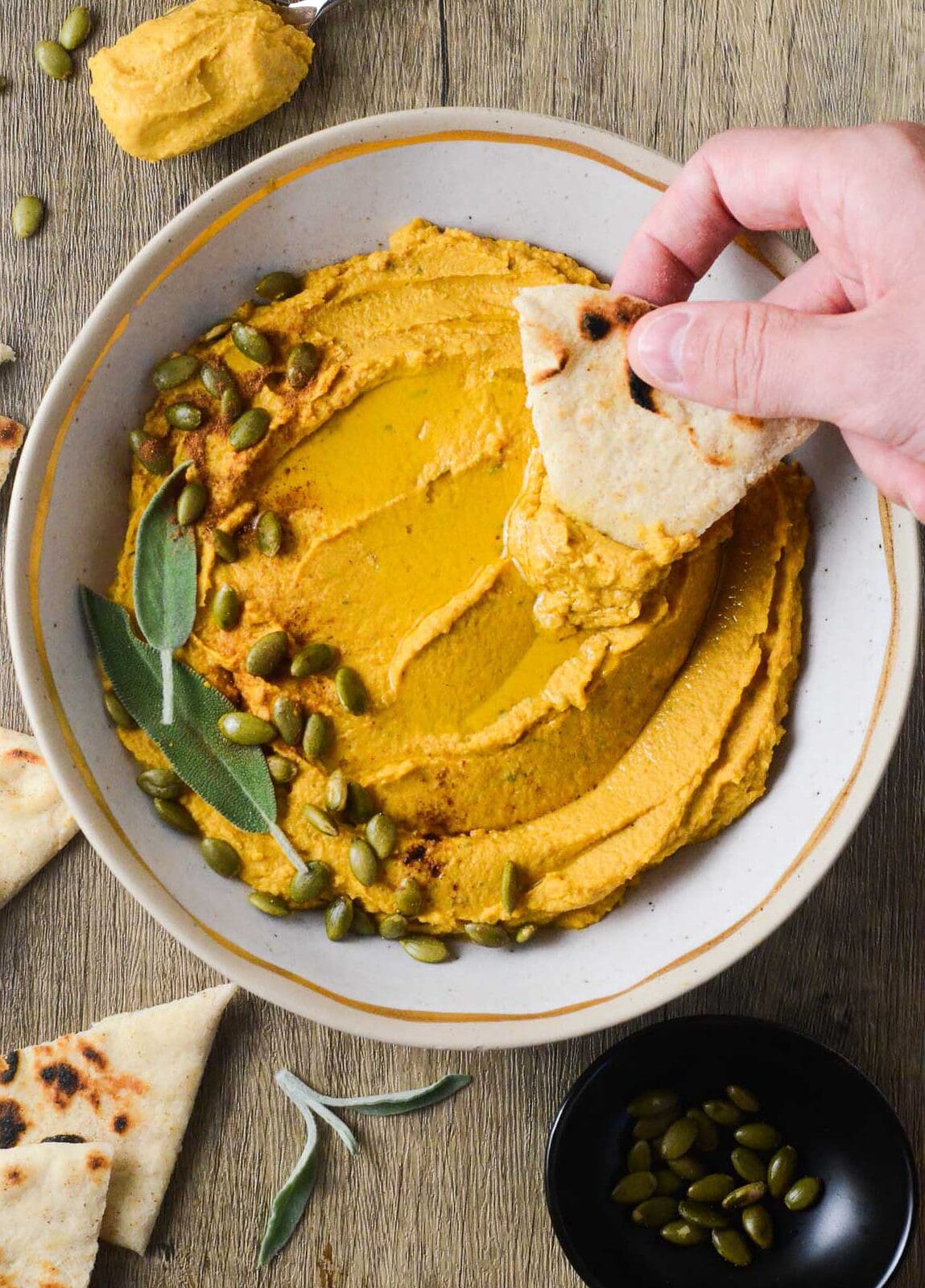


12. Wraps
Portable, versatile, and endlessly customizable, wraps are a vegan hiker's dream meal-on-the-go. They pack neatly into foil or reusable containers, hold up well in a backpack, and can be eaten with one hand on the trail—no utensils required.
For quick and energizing options, try stuffing a whole-grain or spinach tortilla with hummus, roasted veggies, and leafy greens. Peanut butter and banana wraps make a sweet, protein-packed option, while lentil or chickpea salad wraps give you a hearty, savory boost of plant-based protein. If you want extra staying power, layer in avocado for healthy fats or quinoa for long-lasting energy.
Because wraps are so adaptable, you can prep a few different variations before your hike so you never get bored. They're basically trail burritos—fun, filling, and ready to fuel your adventure. Just make sure you wrap tightly in foil or parchment so they stay fresh and easy to grab without the mess.
That's a wrap on boring trail food. Try a vegan wrap the next time you hike!
5 Vegan Wrap Ideas
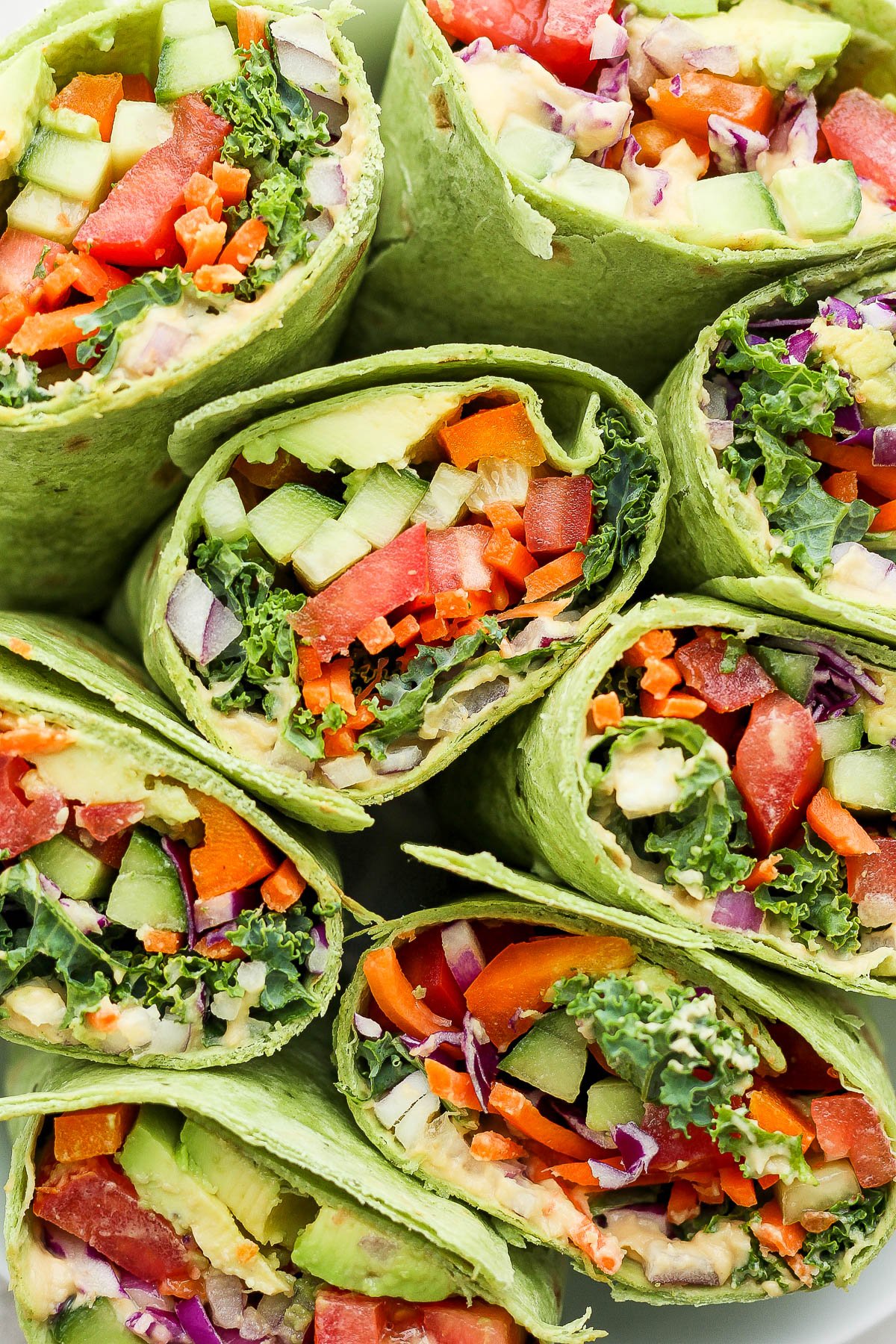
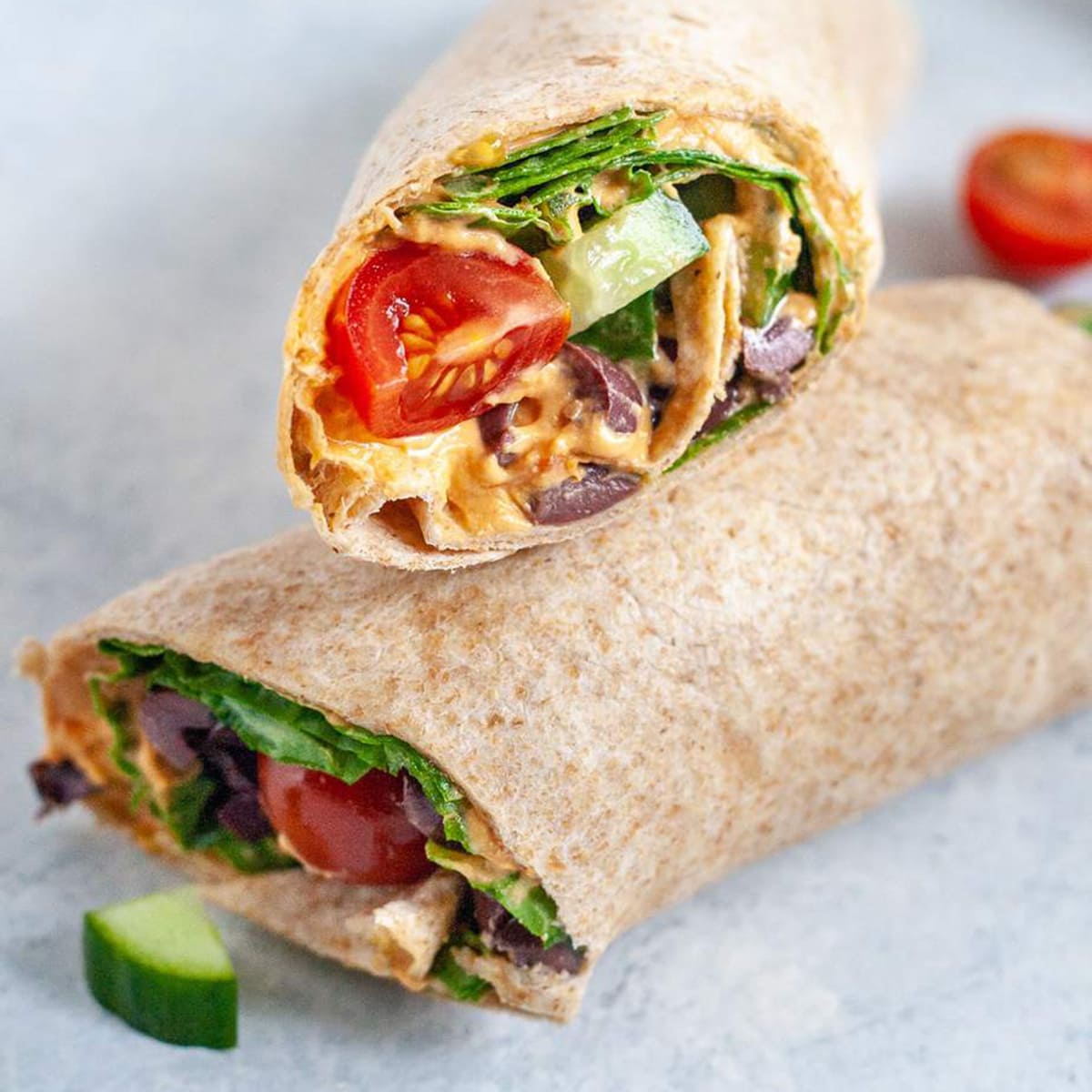
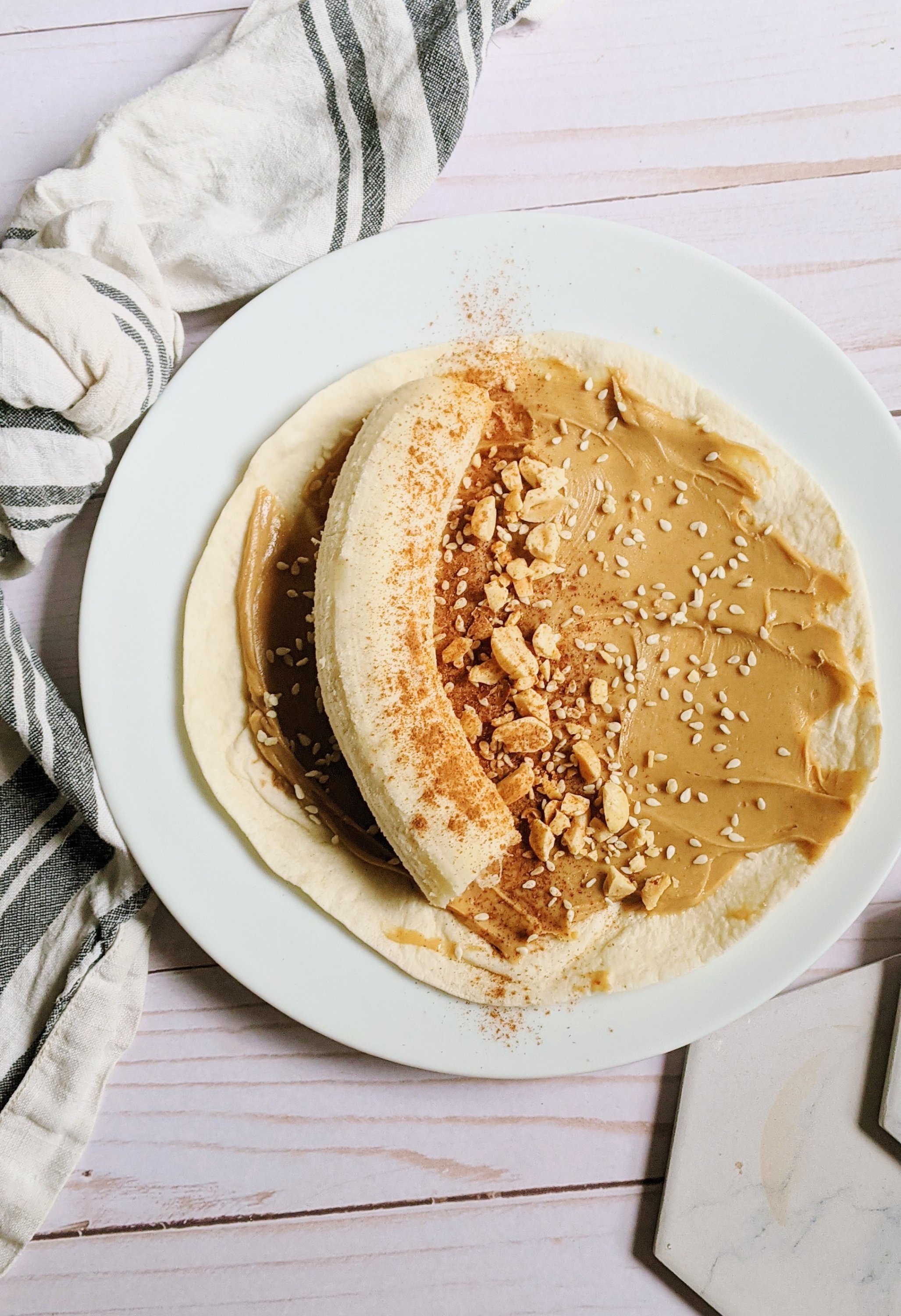
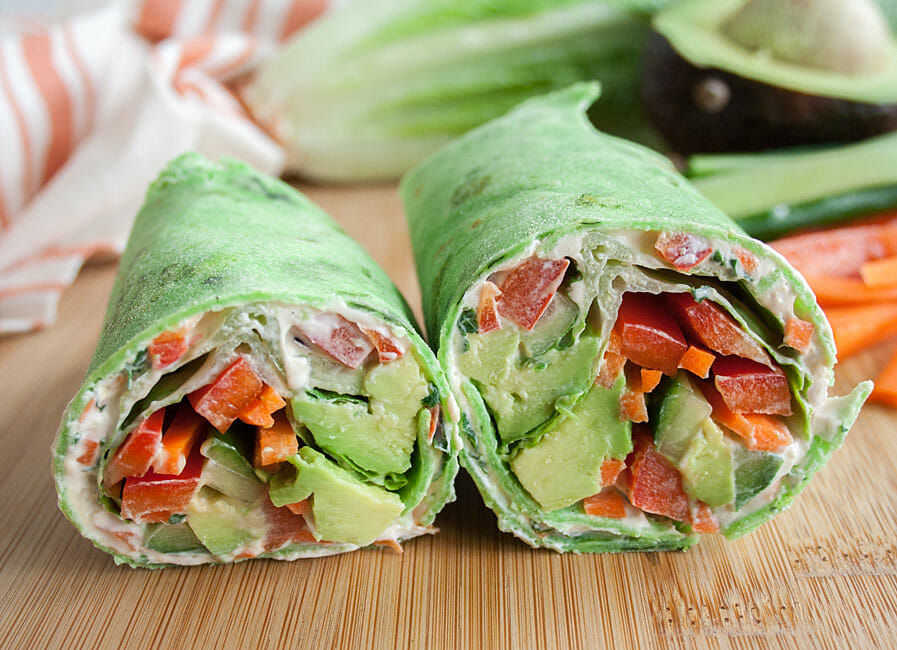
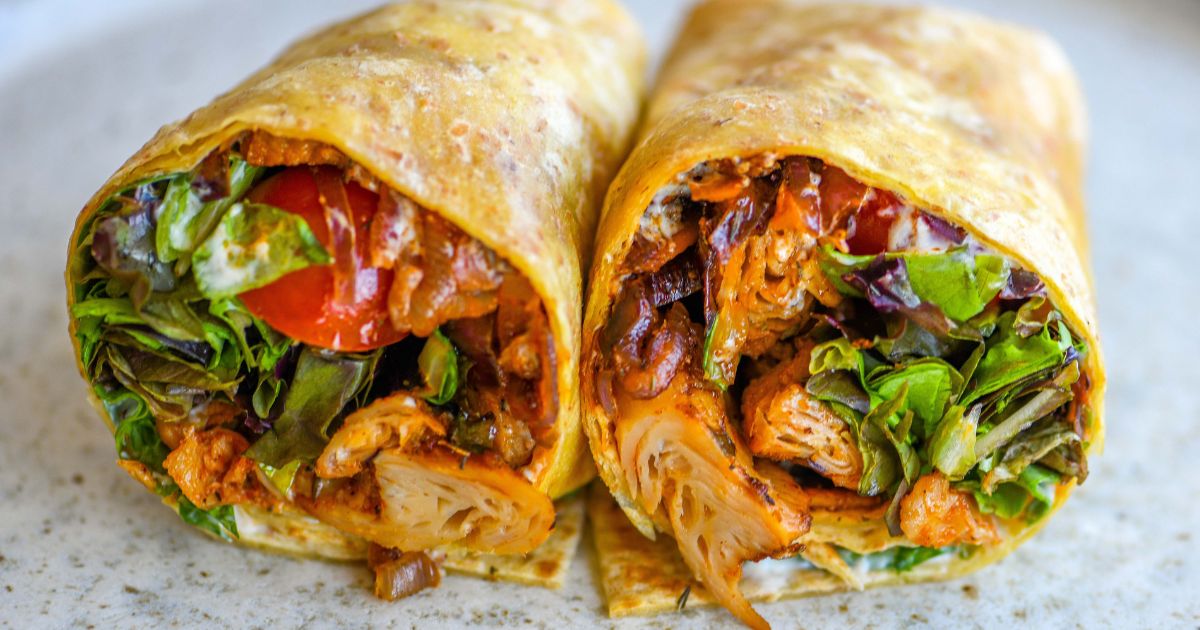
13. Quinoa Salad
Quinoa salad is a fantastic trail food because it's hearty, nutrient-dense, and easy to prep ahead of time. Quinoa itself is a complete protein, meaning it provides all nine essential amino acids, perfect for keeping your energy up on long hikes.
Combine it with beans for extra protein, add colorful veggies like bell peppers, cucumbers, or cherry tomatoes for crunch and freshness, and toss in herbs or a light vinaigrette to boost flavor without weighing it down.
Because quinoa salad can be eaten cold, it travels well in a sealed container and doesn't require reheating. To keep things fresh on warmer days, store it in a lightweight insulated bag or pair it with a small ice pack. You can even portion it into jars or reusable pouches for quick grab-and-go meals.
This salad not only fills you up but also provides a balance of carbs, protein, and fiber, helping you power through tough trails while keeping digestion easy and light. Quin-WOW your next hike with a salad!
5 Vegan Quinoa Salads
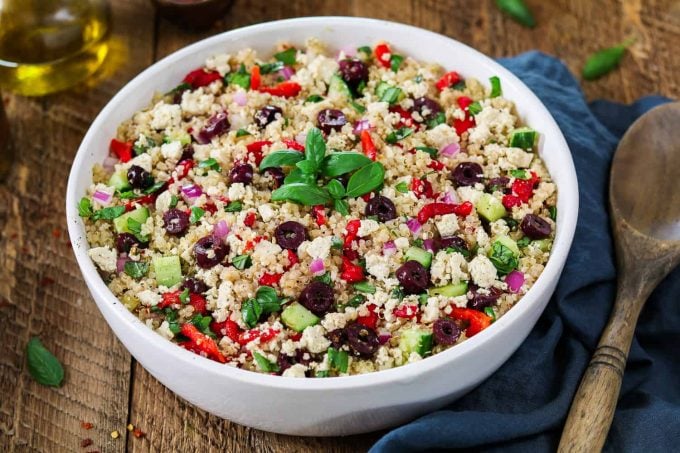
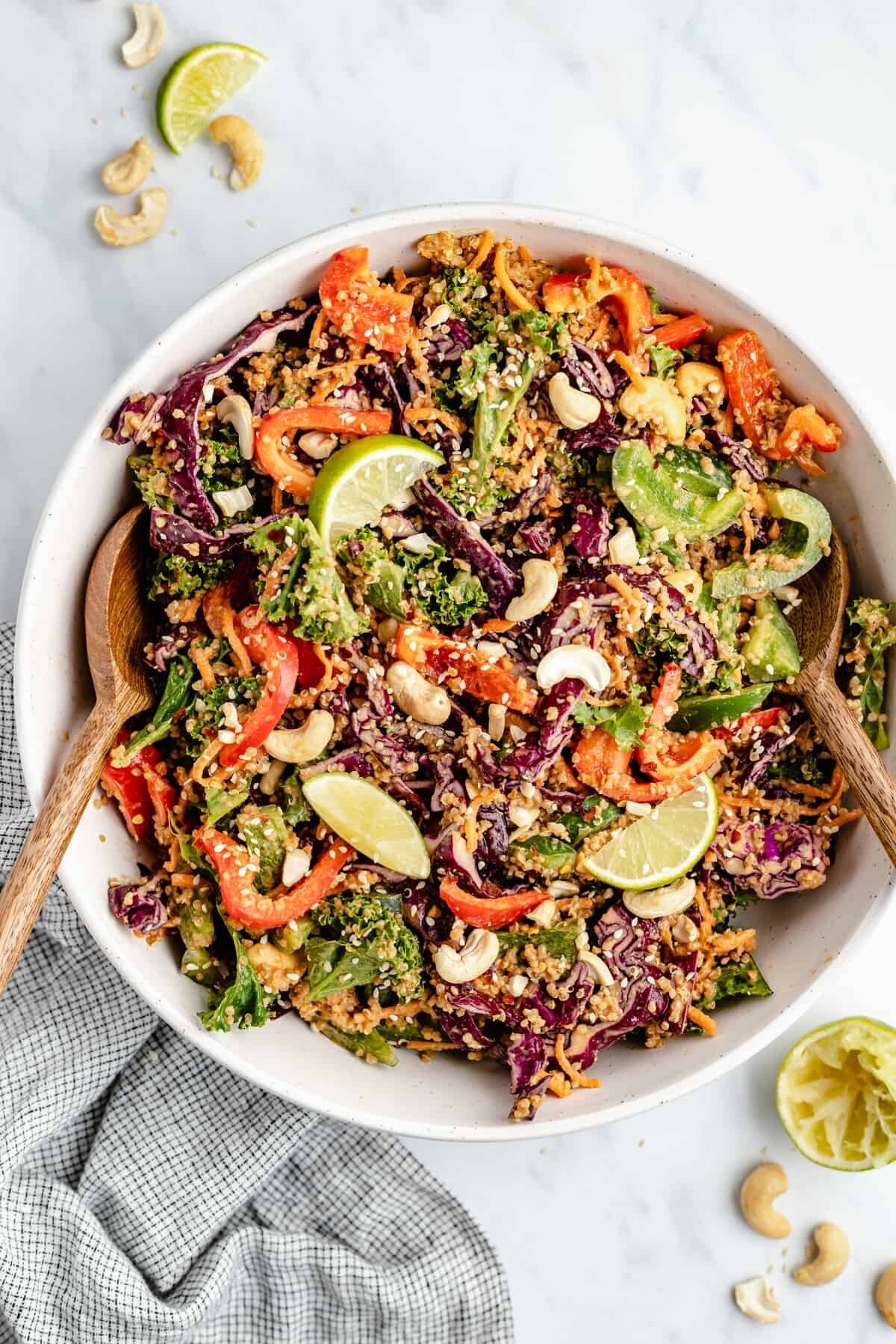
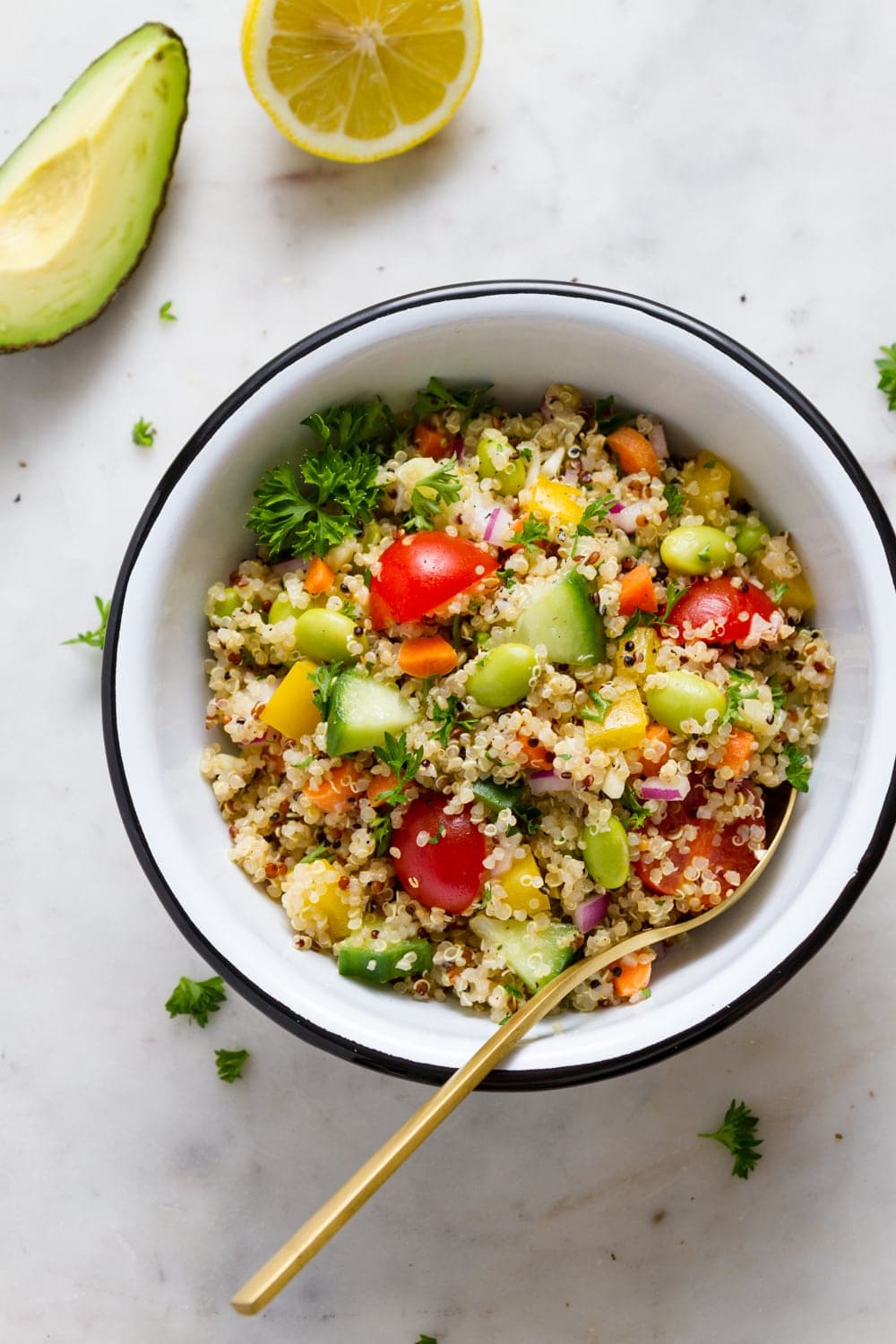
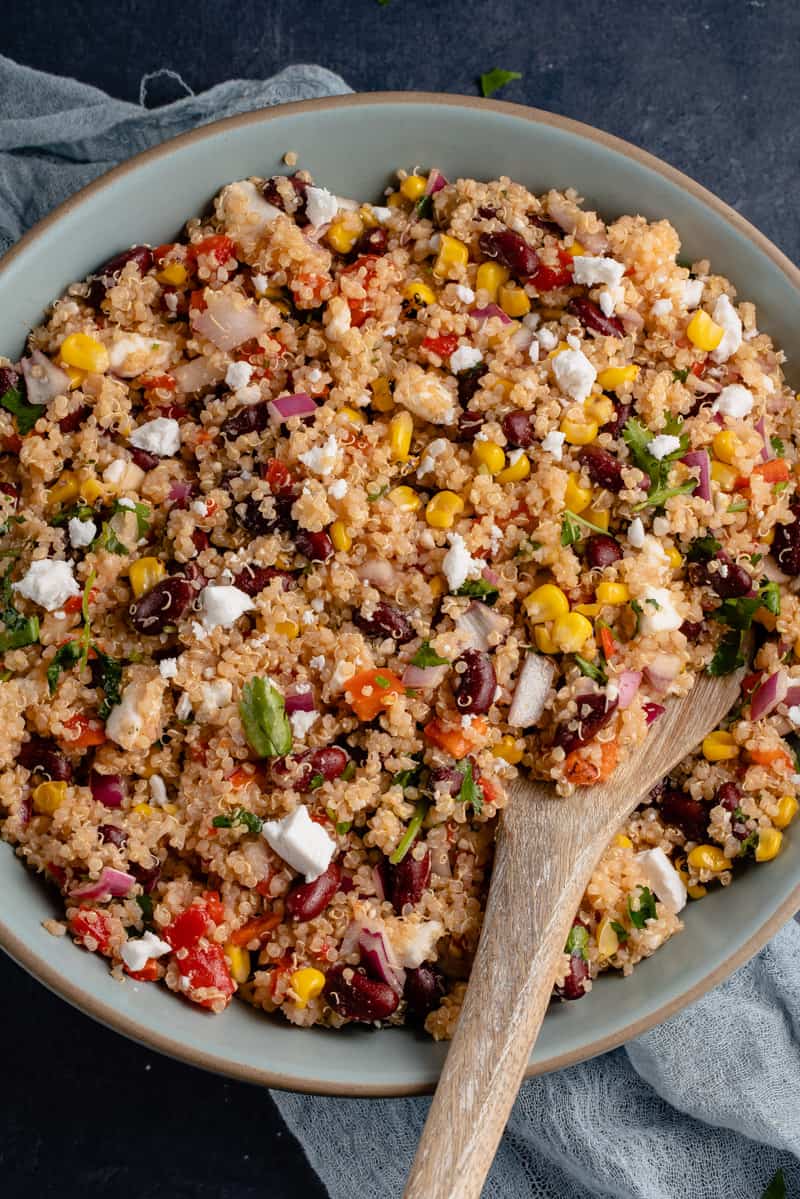
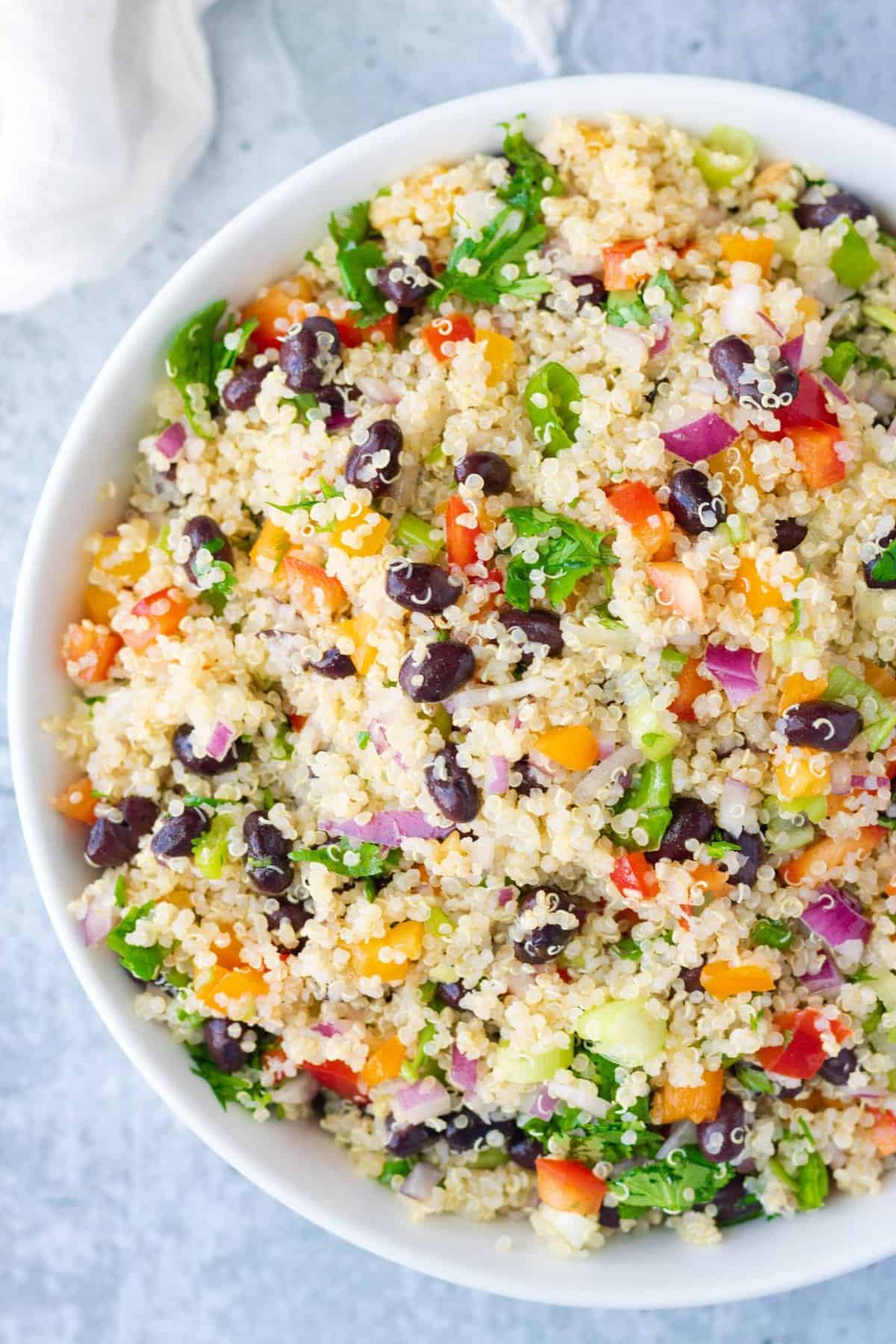
14. Rice Cakes
Rice cakes are a lightweight, versatile, and portable trail snack that can be transformed into a mini meal in seconds. Their neutral flavor and crunchy texture make them the perfect canvas for a variety of toppings.
Spread on some nut butter for protein and healthy fats, layer mashed avocado for creamy richness and heart-healthy fats, or top with hummus and veggies for a refreshing, fiber-rich snack.
Because they're dry and sturdy, rice cakes travel well without refrigeration and won't crush easily if packed carefully. They're also naturally gluten-free (if that matters for your diet) and pair beautifully with both sweet and savory ingredients, making them ideal for variety on the trail.
Stack it, spread it, snack it. Rice cakes are trail-ready and tasty!
5 Vegan Rice Cake Recipes
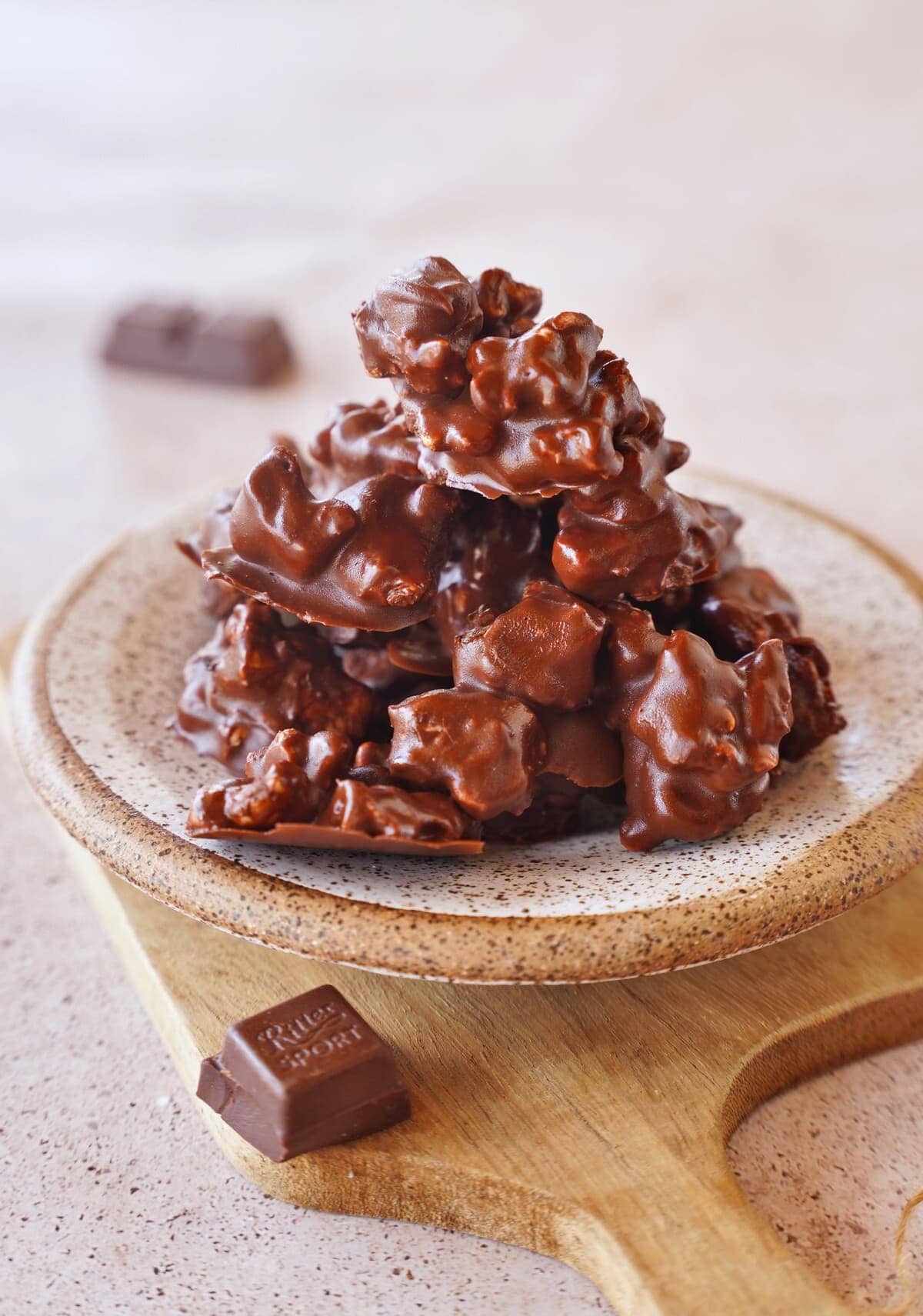
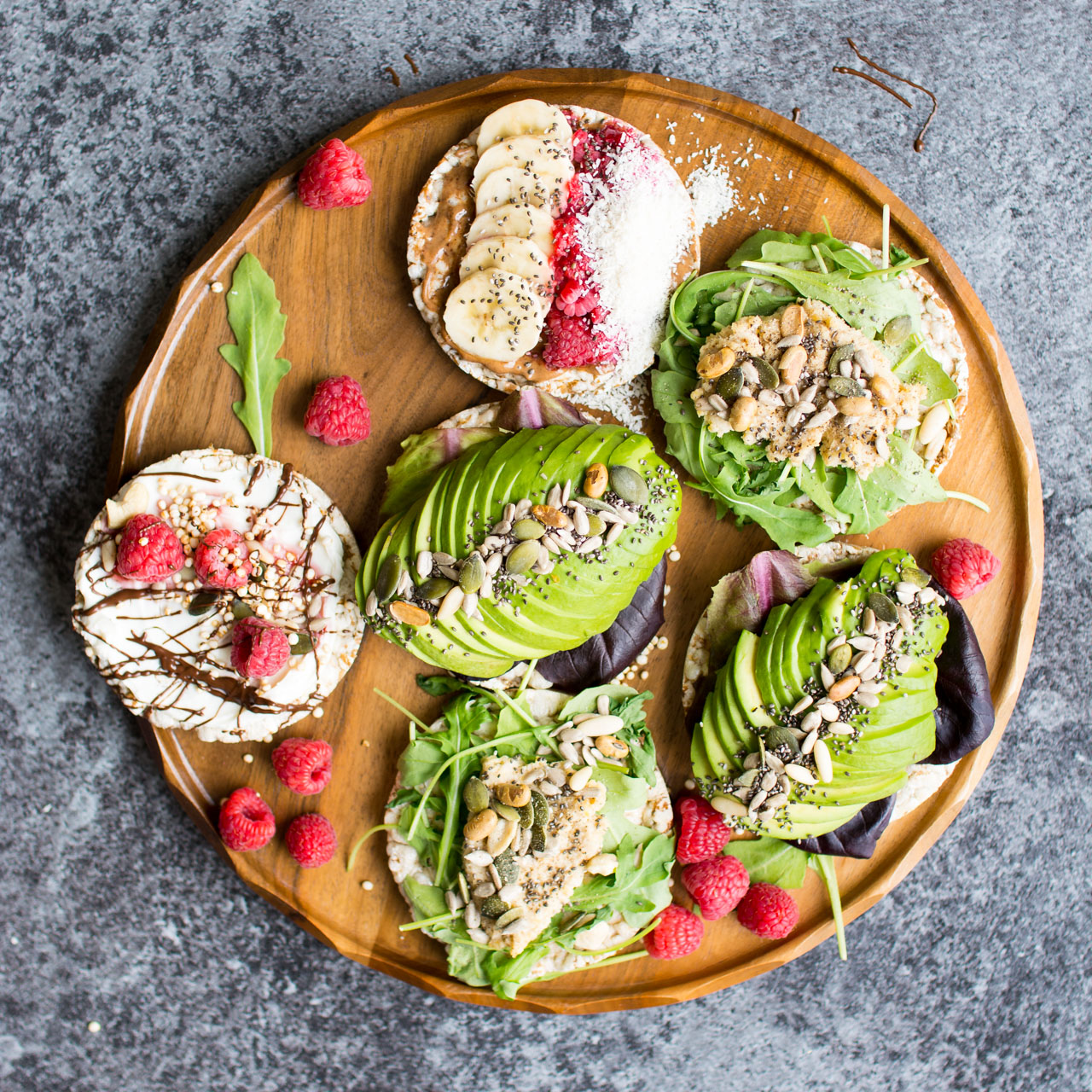

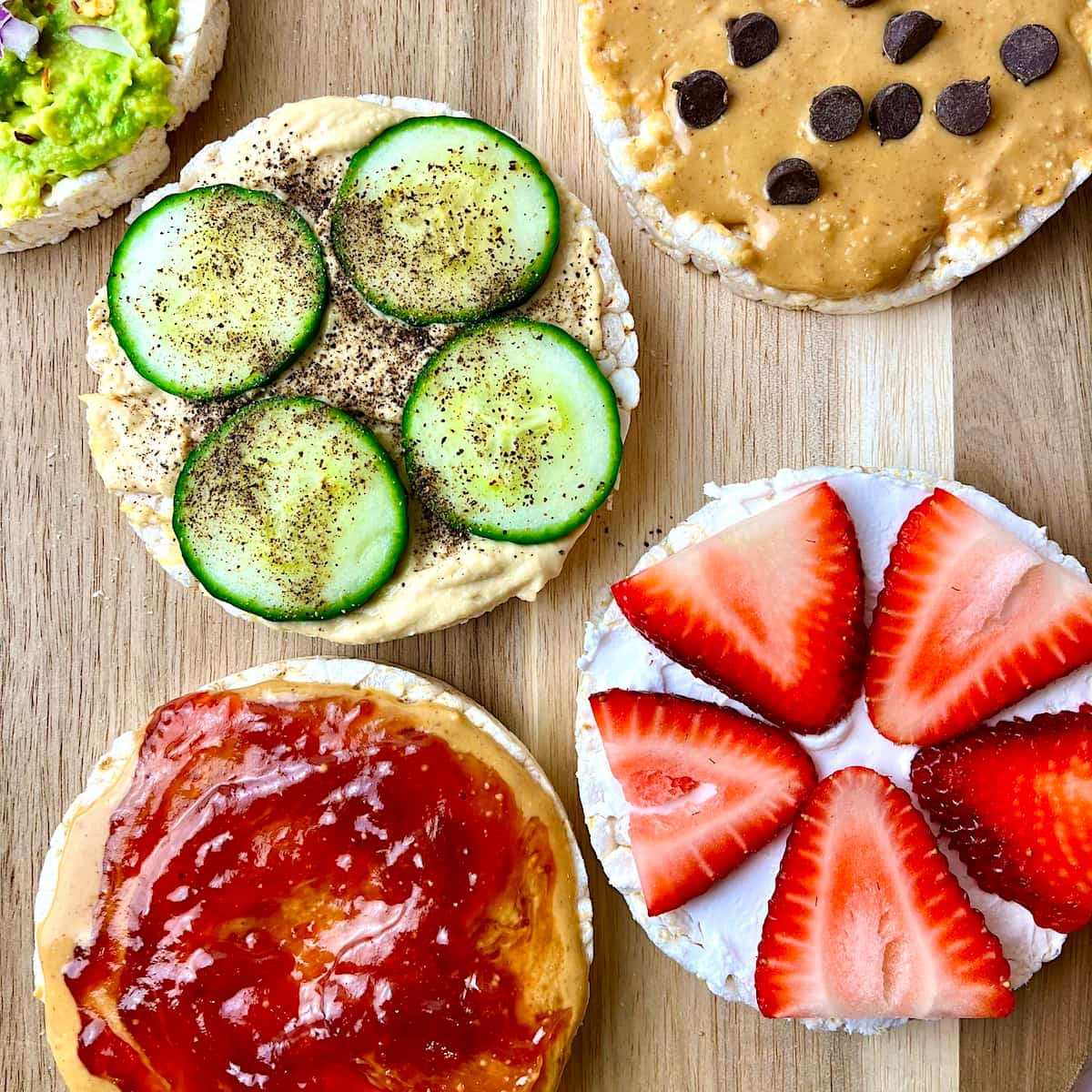

15. Lentil Salad
Lentil salad is a protein-packed, hearty, and satisfying option for the trail. Lentils provide plant-based protein, fiber, and complex carbs, giving you sustained energy for long hikes without weighing you down.
Combine cooked lentils with diced veggies like bell peppers, cherry tomatoes, cucumbers, or carrots for crunch and color, and toss with fresh herbs and a simple vinaigrette for flavor that travels well.
Because lentils hold their texture even when chilled, lentil salads are easy to portion into insulated thermos for grab-and-go meals for your next hike. Add extras like roasted chickpeas, seeds, or avocado (added just before eating) for a nutrient boost. This balanced combination of protein, fiber, and vitamins keeps you full, fueled, and ready to tackle the trail.
Lentil believe it. Pack a lentil salad on your next hike and power through mile after mile!
5 Vegan Lentil Salads
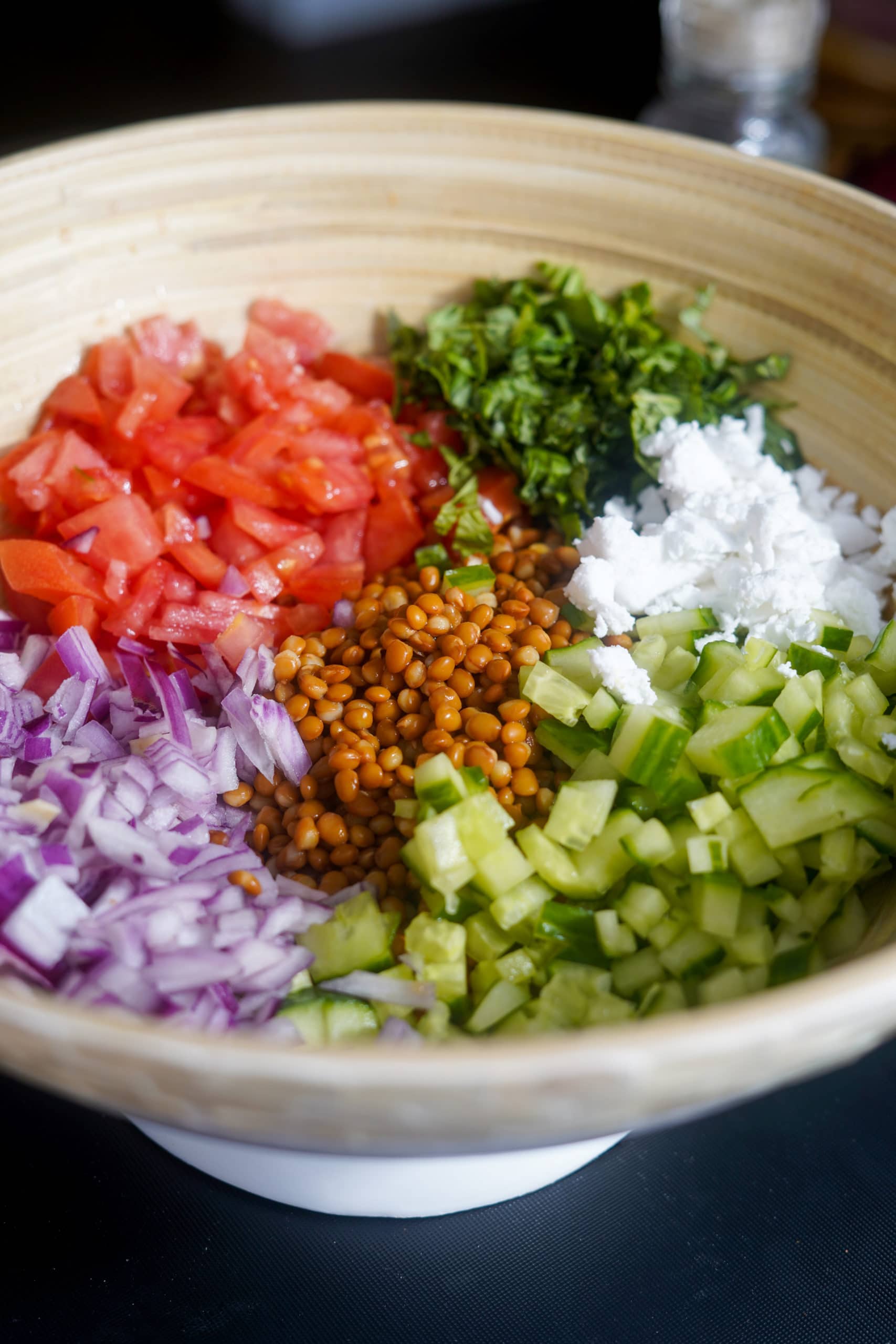

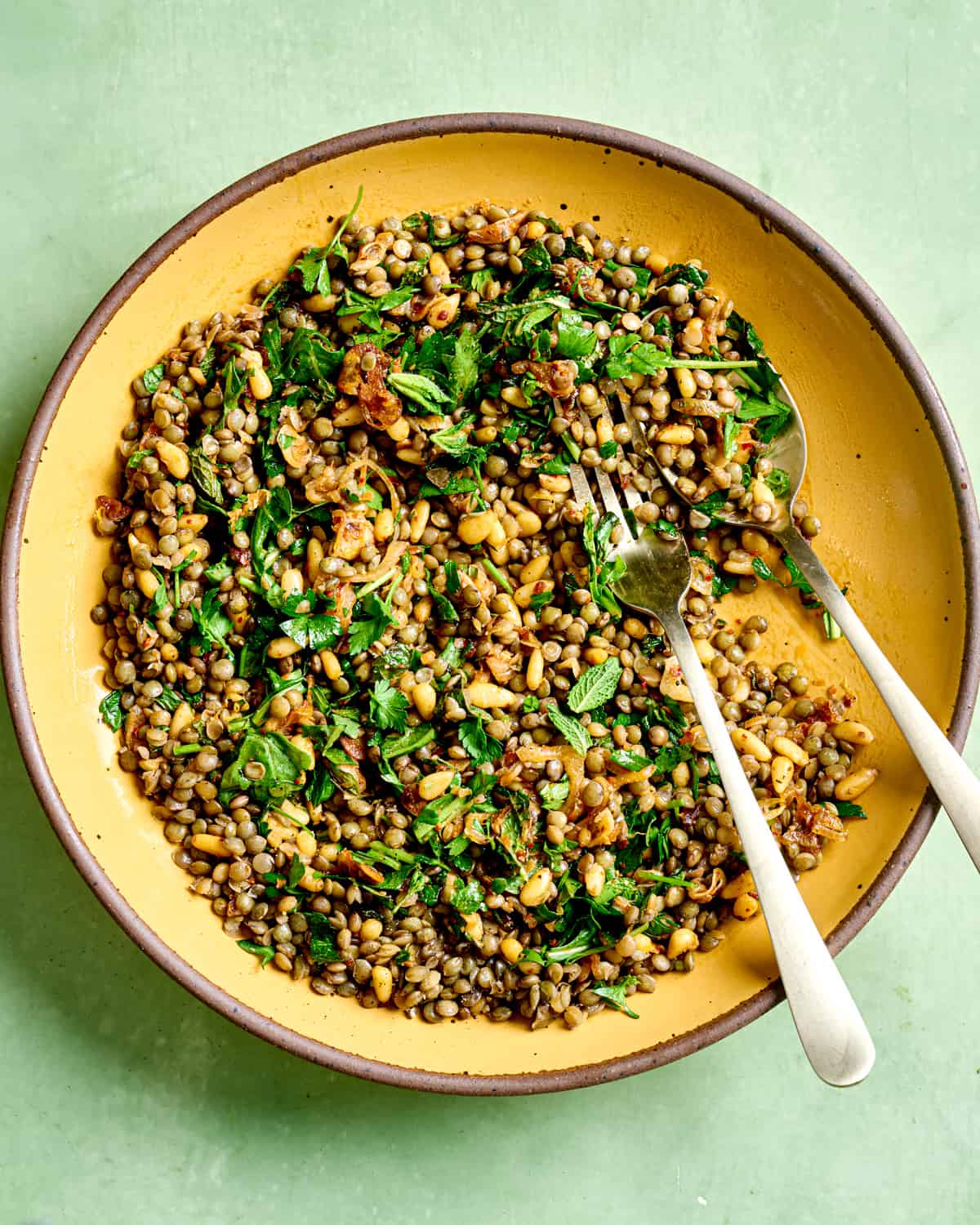
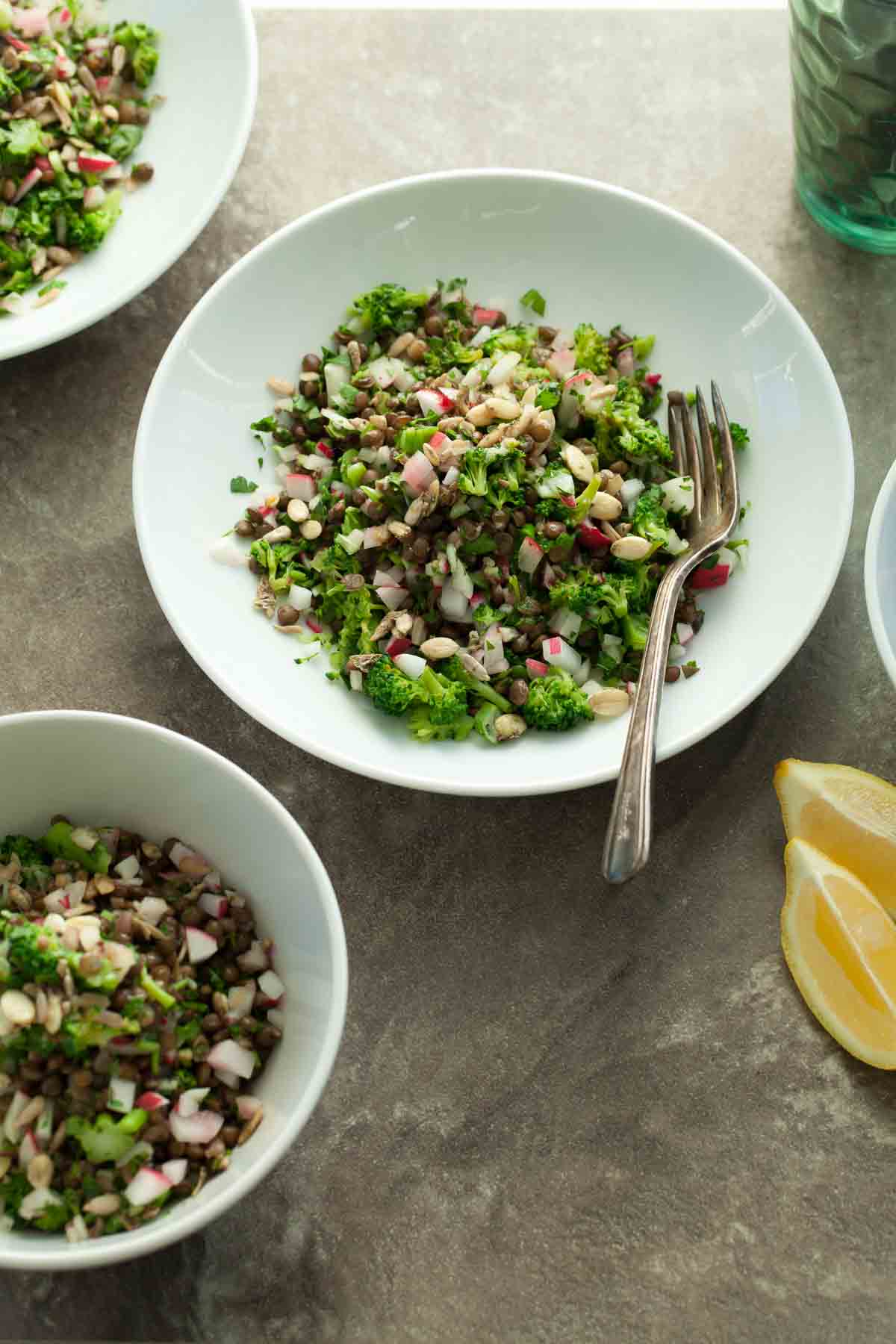
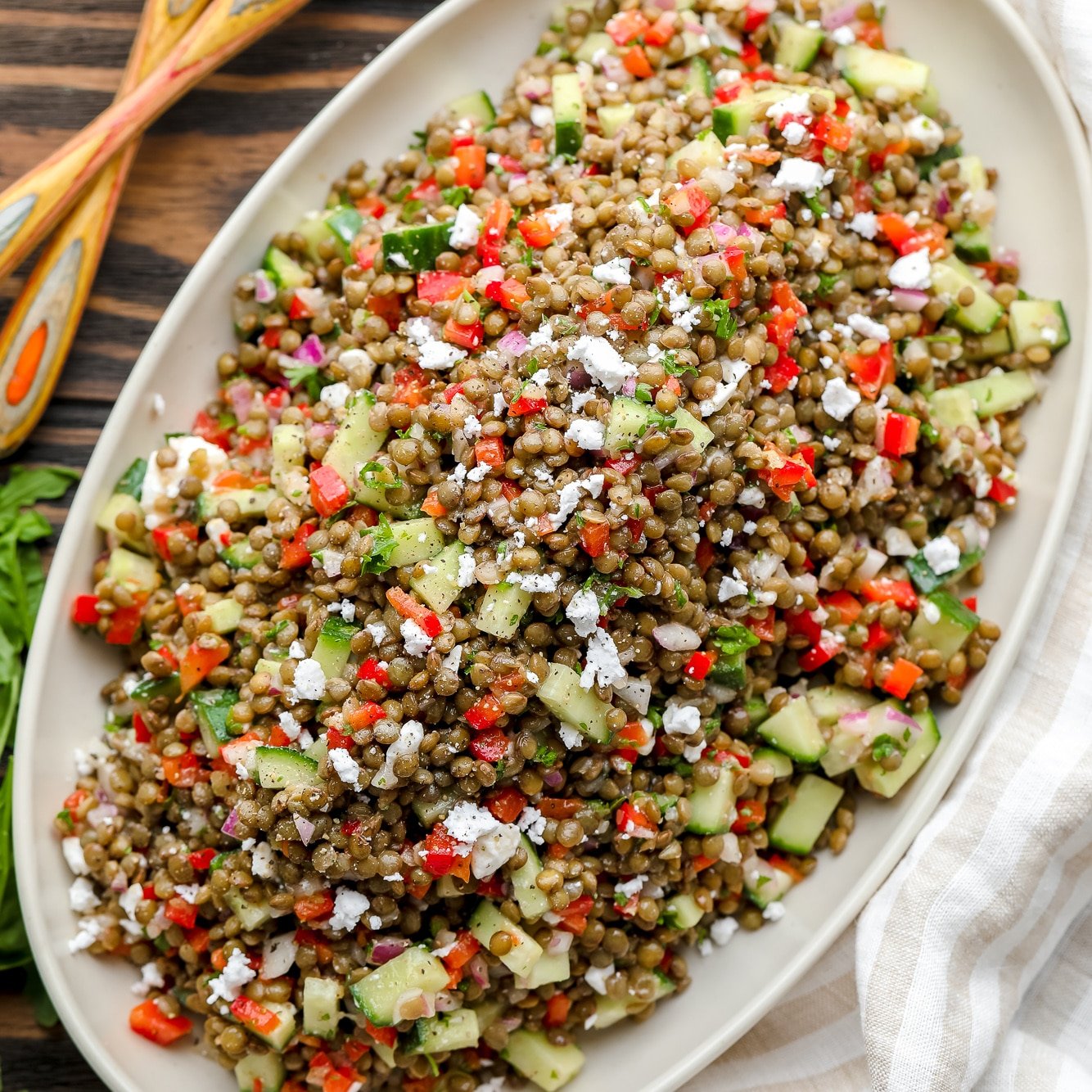
16. Soup
Soup might not be the first thing you think of for the trail, but a hearty vegan soup can be a game-changer, especially for chilly hikes or multi-day adventures. Lentil, minestrone, or vegetable soups are packed with protein, fiber, and nutrients to keep energy levels steady.
Prepare it ahead of time and put it in a lightweight, leakproof thermos or insulated container, so it stays warm until you're ready to eat. Note, for multi-day trips, instant soup would be a better option than a thermos of soup.
Not only does soup hydrate and nourish, but it also provides a comforting, warming snack or meal after a long stretch of hiking. You can customize it with beans, grains, or vegetables for added energy, and season it with herbs and spices to keep things flavorful.
Souper hike! Bring a warm cup of soup and fuel your veganventure in style.
5 Vegan Soup Ideas
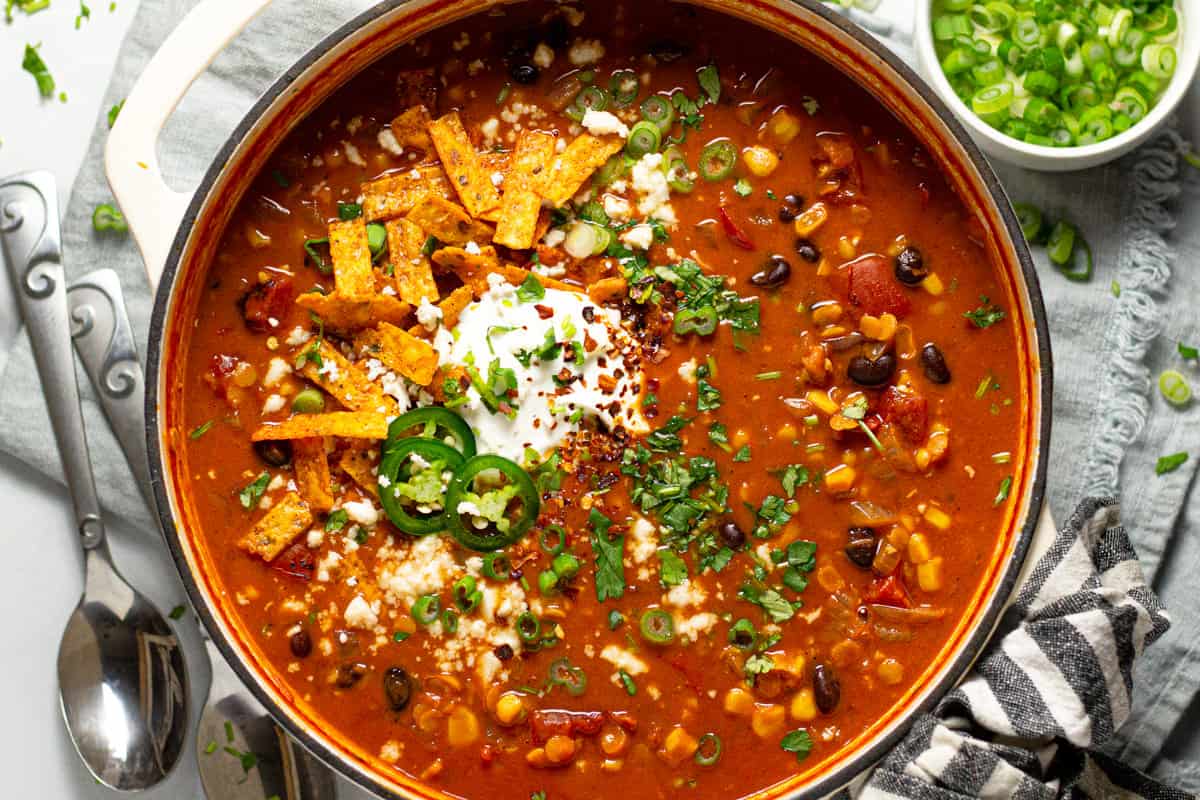
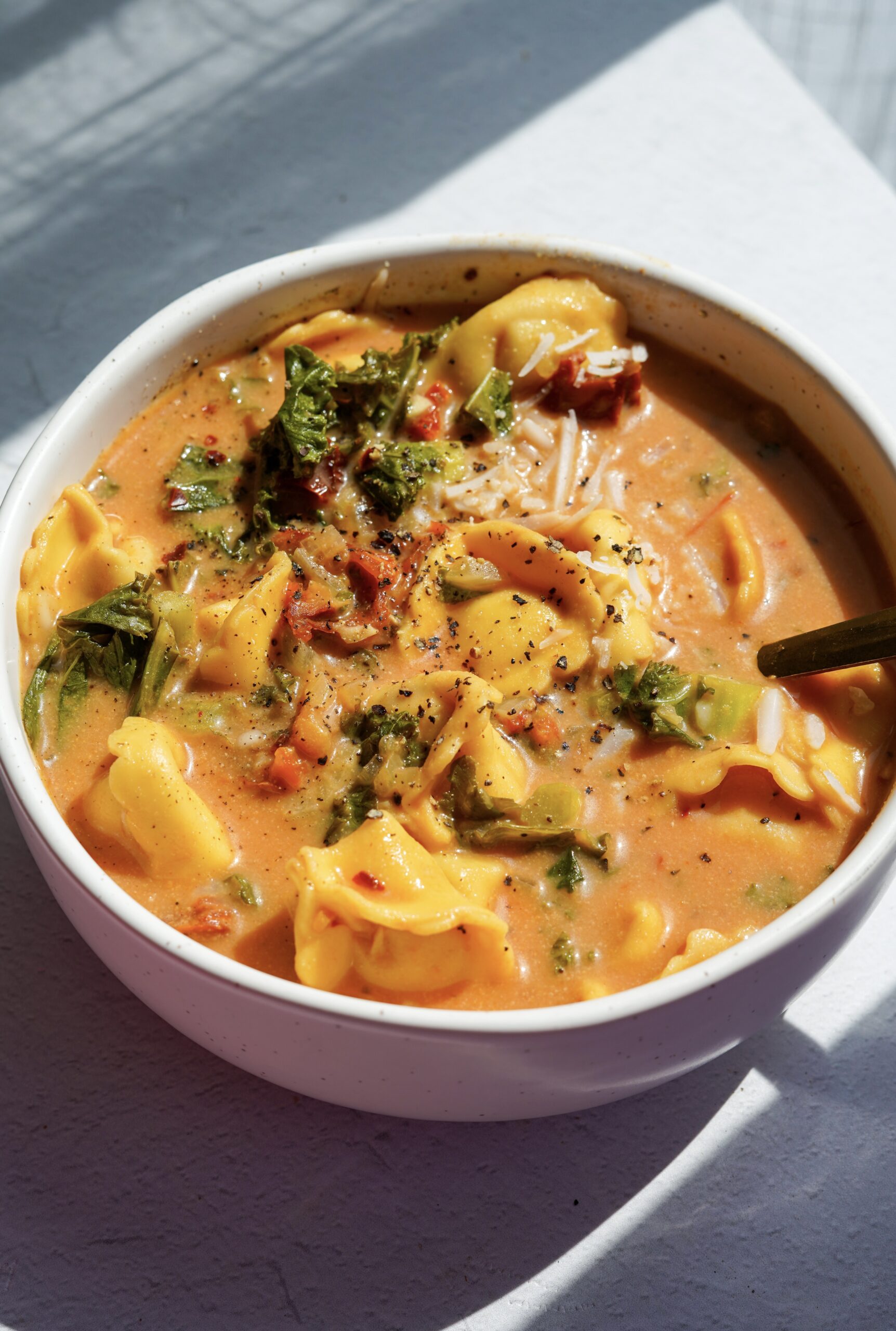
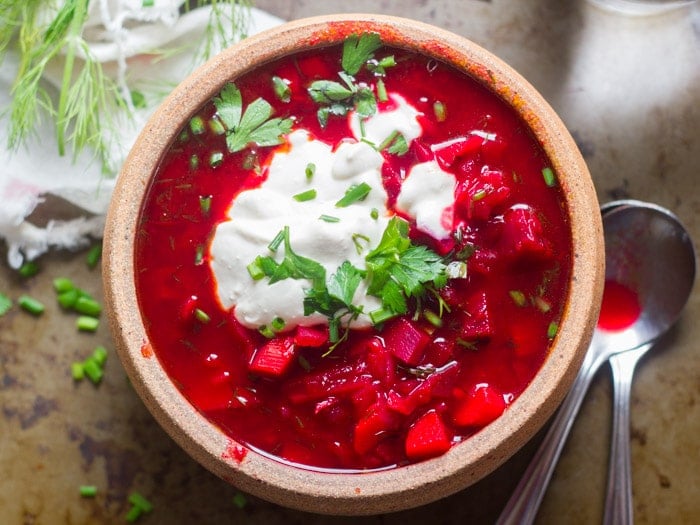

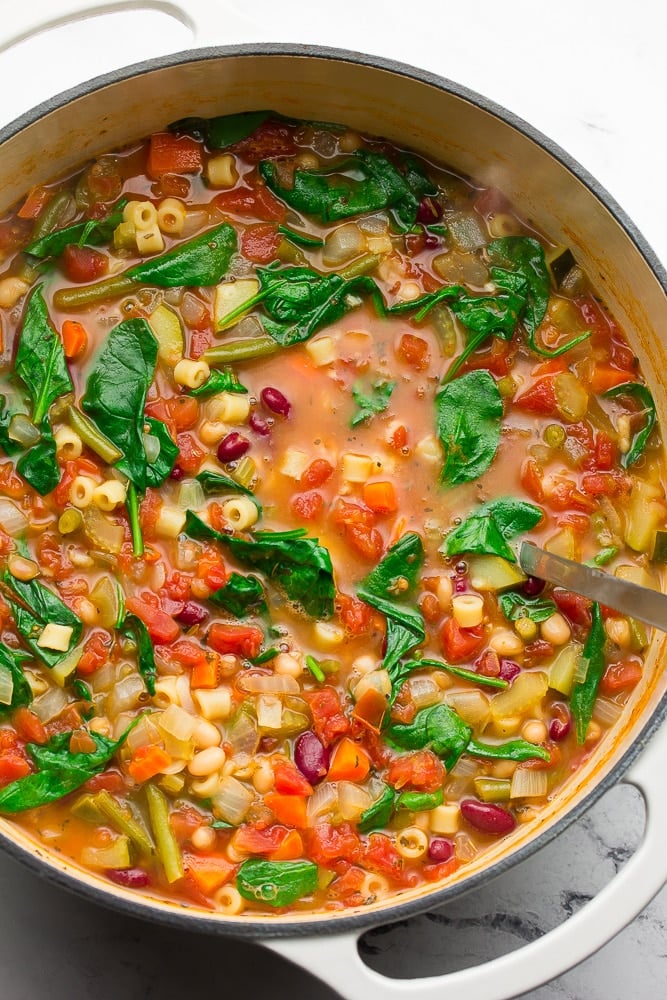
17. Stew
A hearty vegan stew is a warming, nutrient-packed meal perfect for longer hikes, cooler weather, or overnight backpacking trips. Packed with beans, lentils, vegetables, and whole grains like barley or quinoa, it provides sustained energy, protein, and fiber to keep you fueled mile after mile. Add herbs and spices—like thyme, paprika, or rosemary—for flavor that comforts as much as it energizes.
Stews can be prepared in advance and stored in lightweight, insulated containers to stay warm for hours. For multi-day trips, freeze individual portions or use vacuum-sealed packets, then reheat at the campsite or enjoy cold for a refreshing, hearty snack. Vegan stews are filling, versatile, and a cozy way to nourish your body on the trail.
Stew-pendous! Bring a bowl on your next hike and fuel up like a trail champion.
5 Vegan Stew Ideas

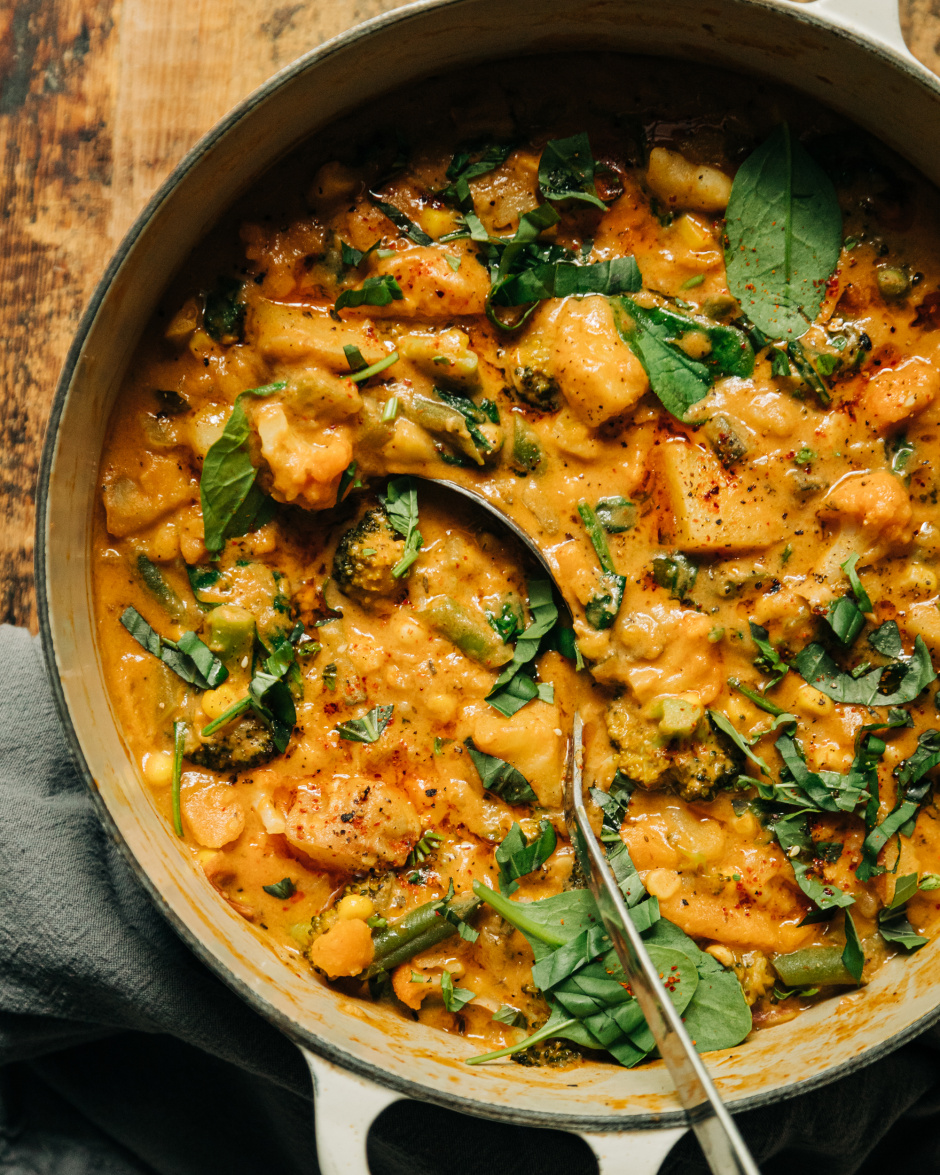



18. Chocolate
Chocolate is a classic trail treat that combines indulgence with functionality. Lightweight and easy to pack, it delivers a quick source of energy through its natural sugars and fats—perfect for an afternoon slump on a long hike. Beyond the calories, chocolate can provide a little mood boost thanks to its comforting taste and the feel-good compounds it contains.
For more variety and sustained energy, pair chocolate with nuts, seeds, or dried fruit to create trail-friendly bites that balance carbs, protein, and healthy fats. You can also break it into small pieces or bring individually wrapped squares so it's easy to snack on the move. Chocolate melts quickly in heat, so consider storing it in a cooler pocket of your backpack or in a small insulated bag on warmer days.
Fuel your adventure the sweet way. Grab some chocolate and keep hiking with a smile!
5 Vegan Chocolate Recipes

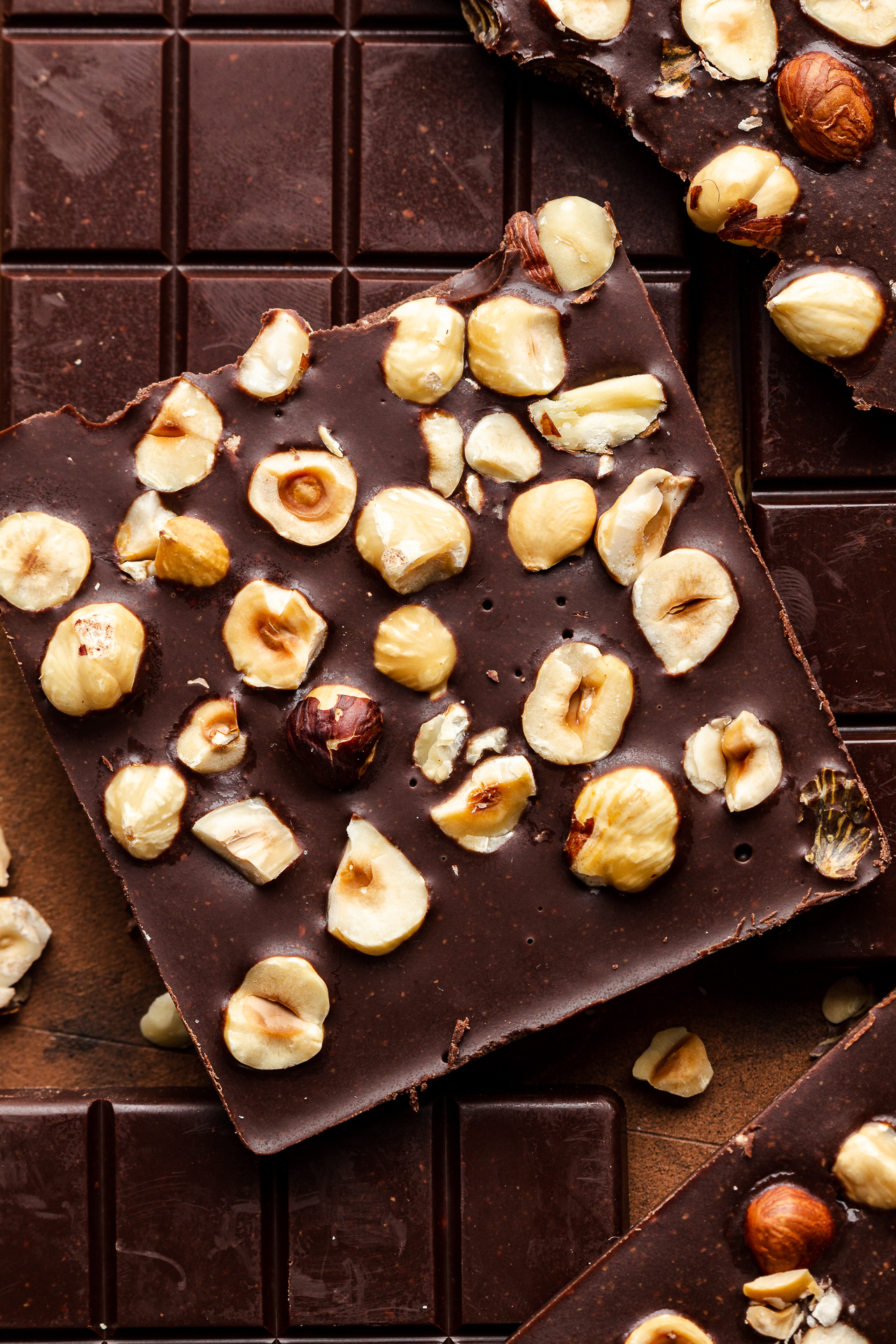

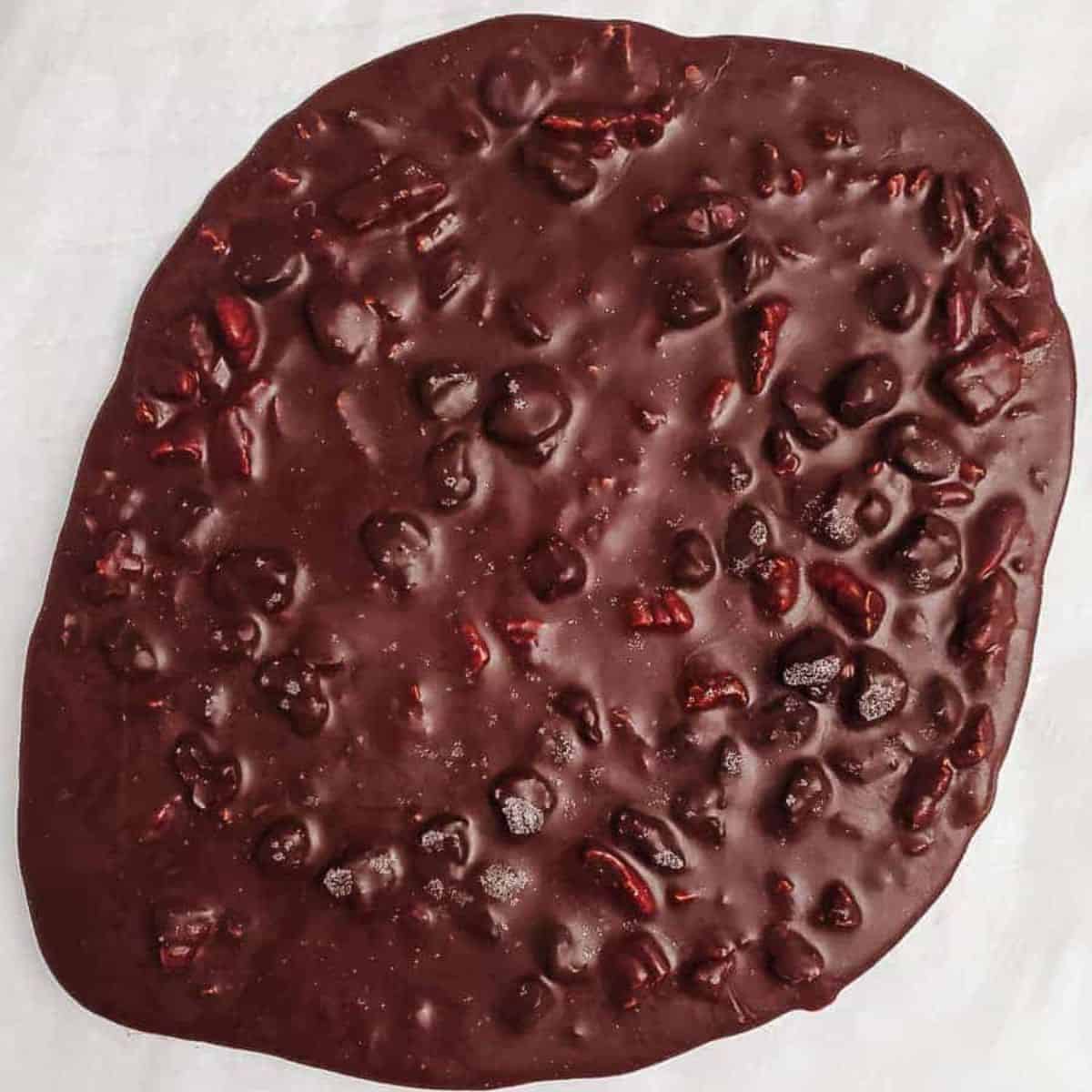

19. Fruit Leather
Fruit leather is a lightweight, portable, and naturally sweet trail snack that's perfect for hikers. Made by dehydrating pureed fruit, it packs concentrated energy, fiber, and vitamins into a thin, flexible strip that's easy to stash in your backpack. Unlike fresh fruit, it won't bruise or spoil, making it ideal for multi-hour or multi-day hikes.
Fruit leather is versatile. You can enjoy it on its own for a quick sugar boost or pair it with nuts and seeds for added protein and staying power. It's also an easy way to introduce variety to your trail snacks: try mango, strawberry, or mixed berry flavors for a colorful, flavorful boost.
Because it's mess-free and individually portioned, fruit leather is a fuss-free way to satisfy your sweet tooth while keeping your energy up. Roll into adventure. Pack some fruit leather and snack your way up the trail!
5 Vegan Fruit Leather Ideas
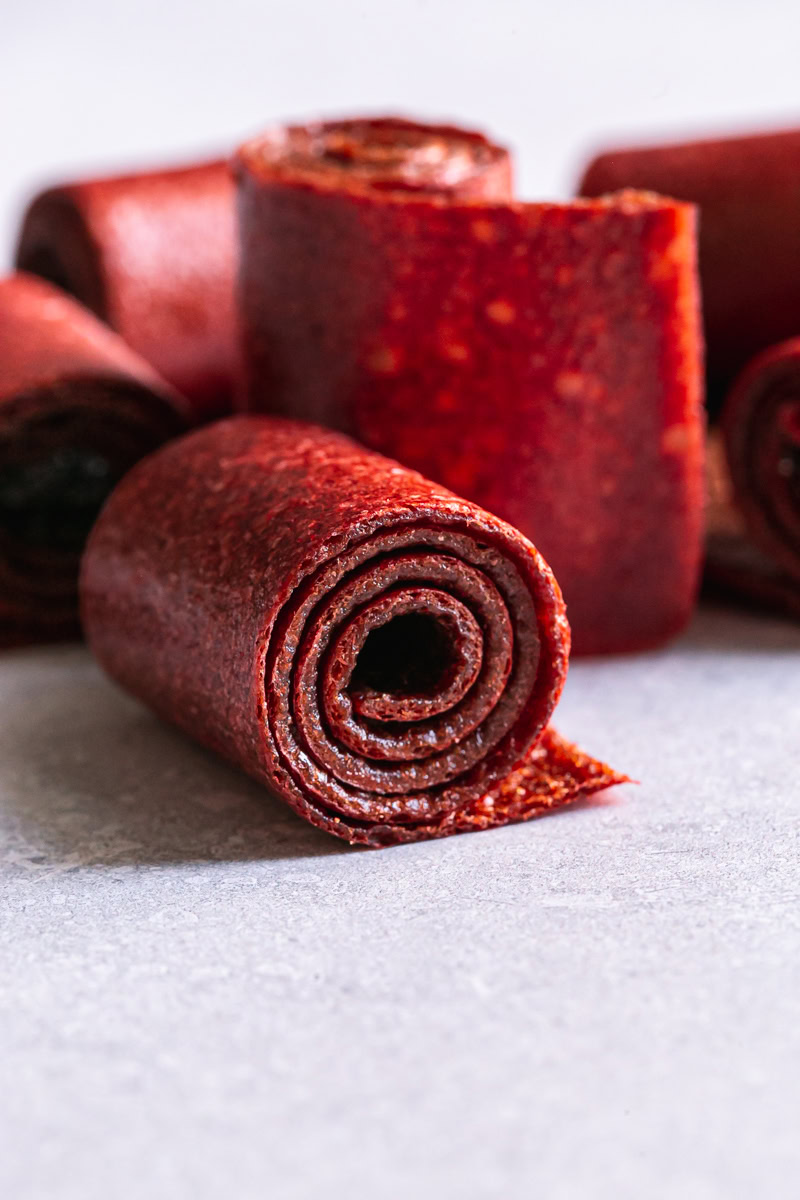
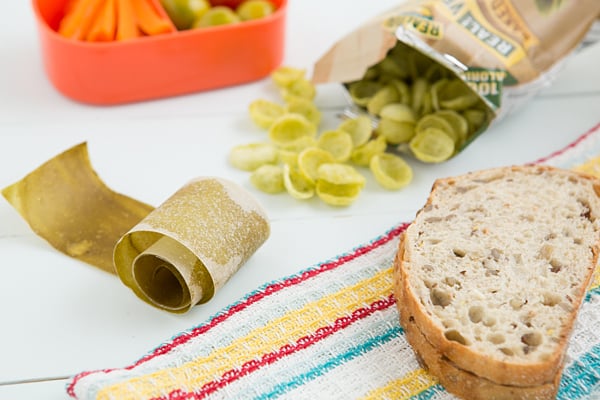

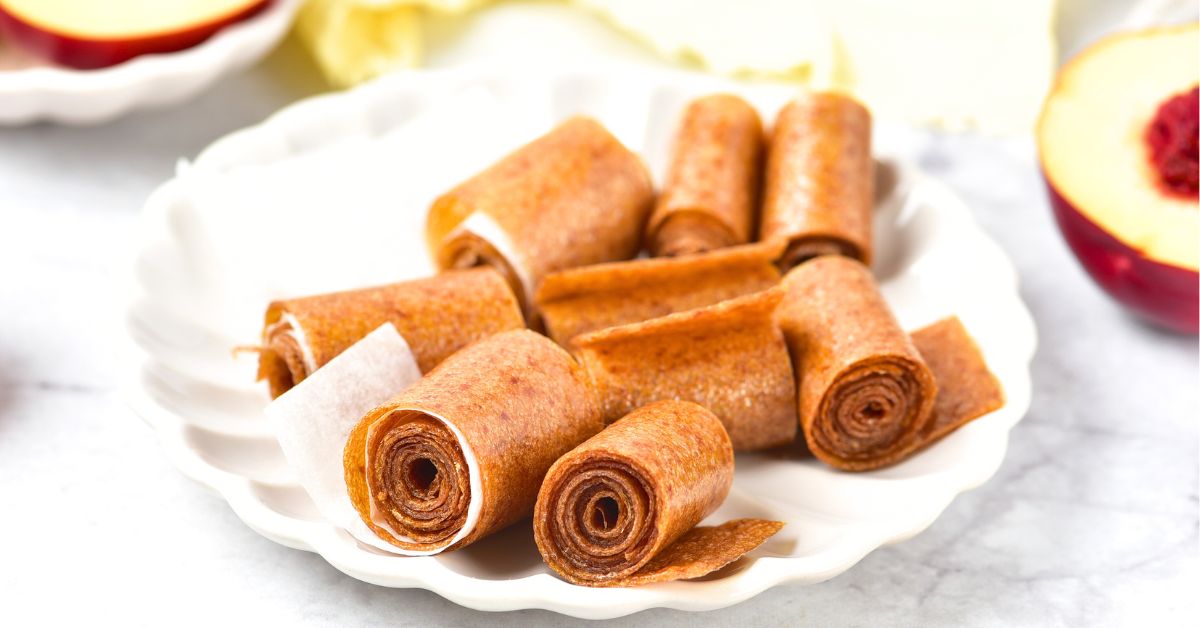
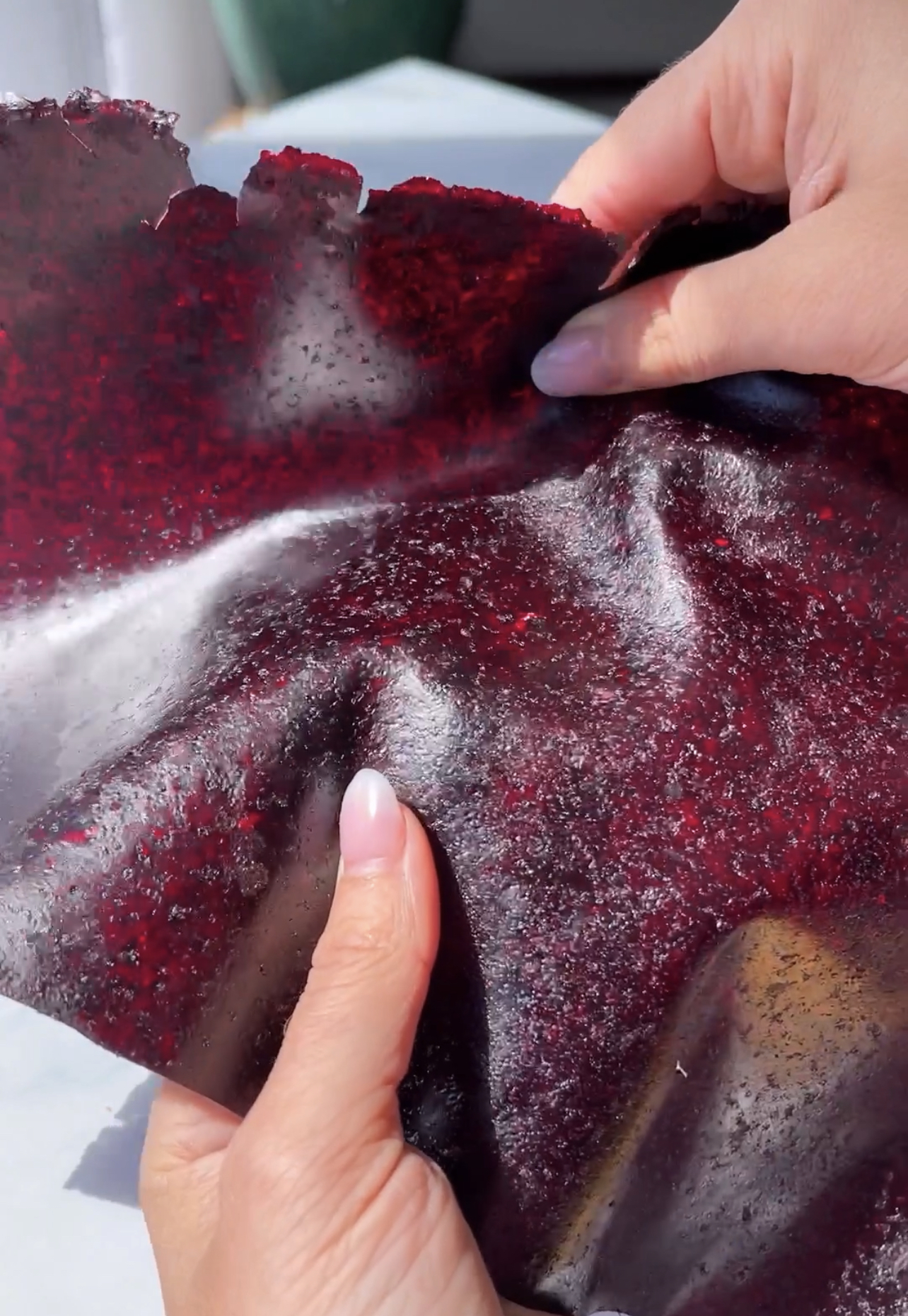
20. Nuts
Last but not least, nuts are a trail-essential powerhouse, offering protein, healthy fats, and fiber to keep you energized and satisfied on long hikes. Almonds, cashews, walnuts, pistachios—each brings its own flavor, texture, and nutrient profile, making them a versatile snack for every trail adventure. Their compact size and natural durability make them easy to pack and carry, and they won't spoil easily in your backpack.
Pair them with dried fruit, chocolate, or even a sprinkle of seeds for a homemade trail mix that balances quick energy with sustained fuel. Nuts are also great for keeping your blood sugar stable during challenging climbs, helping you avoid mid-hike crashes.
Go nuts on the trail. Grab a handful and power your adventure!
5 Vegan Nut Recipes
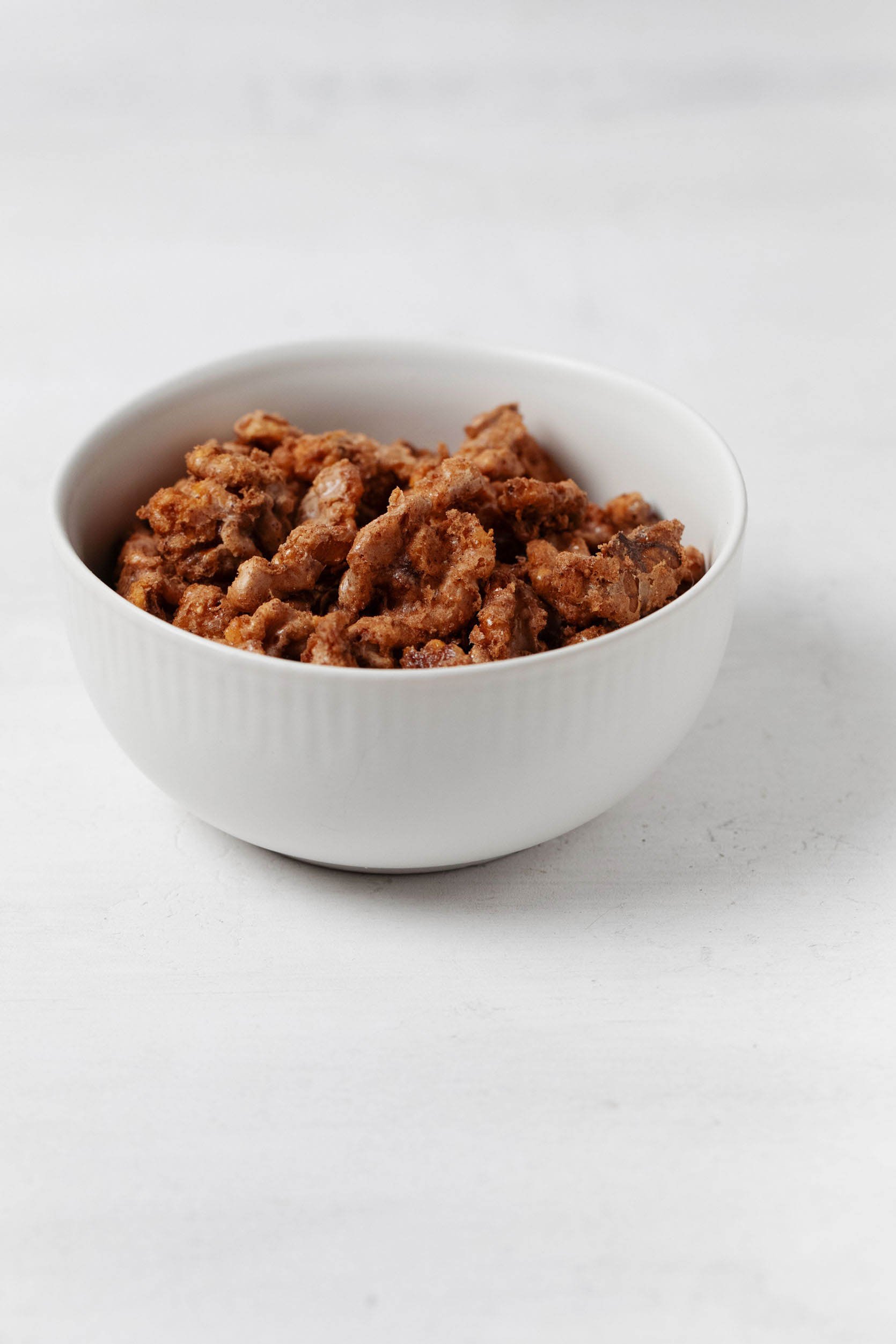
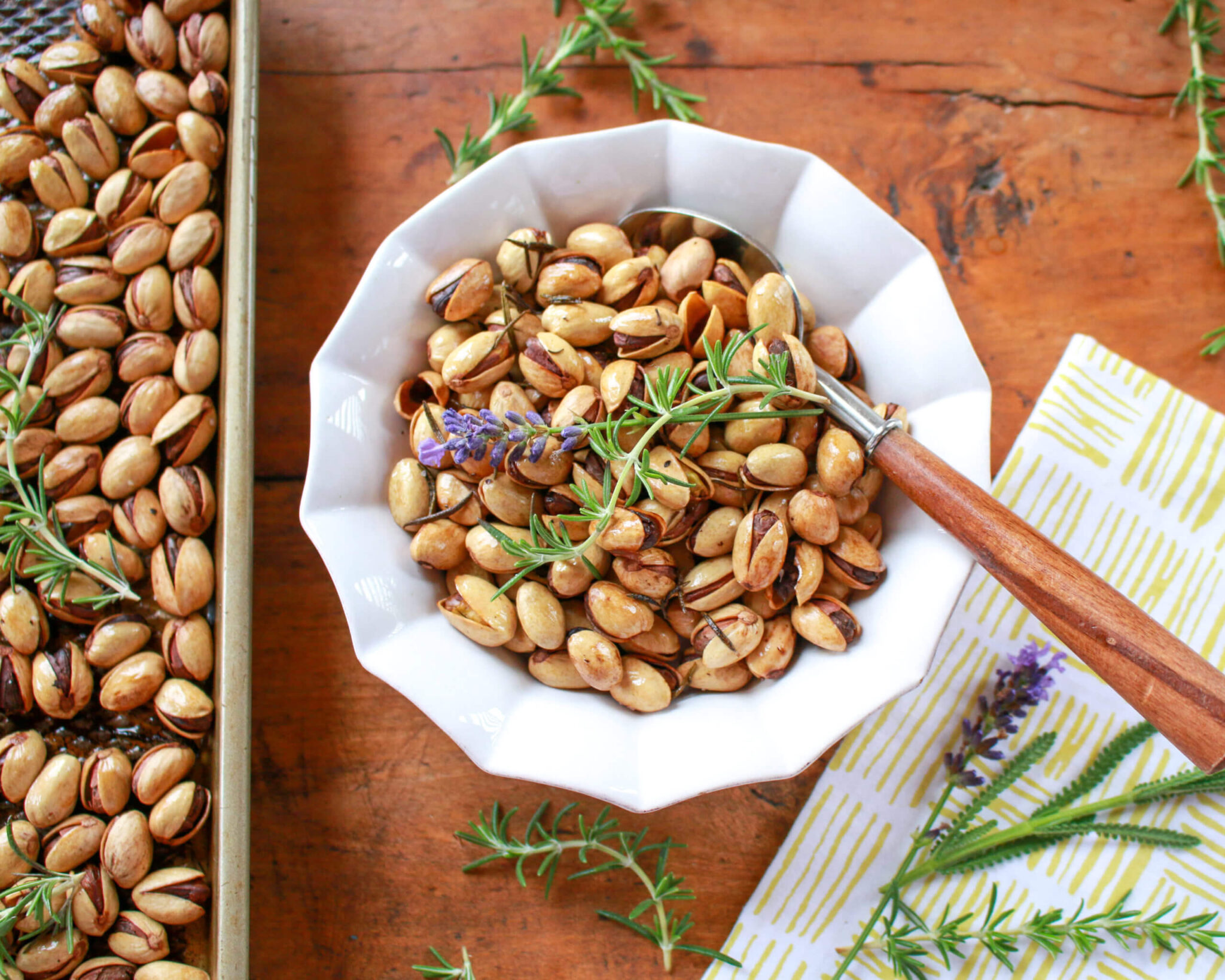
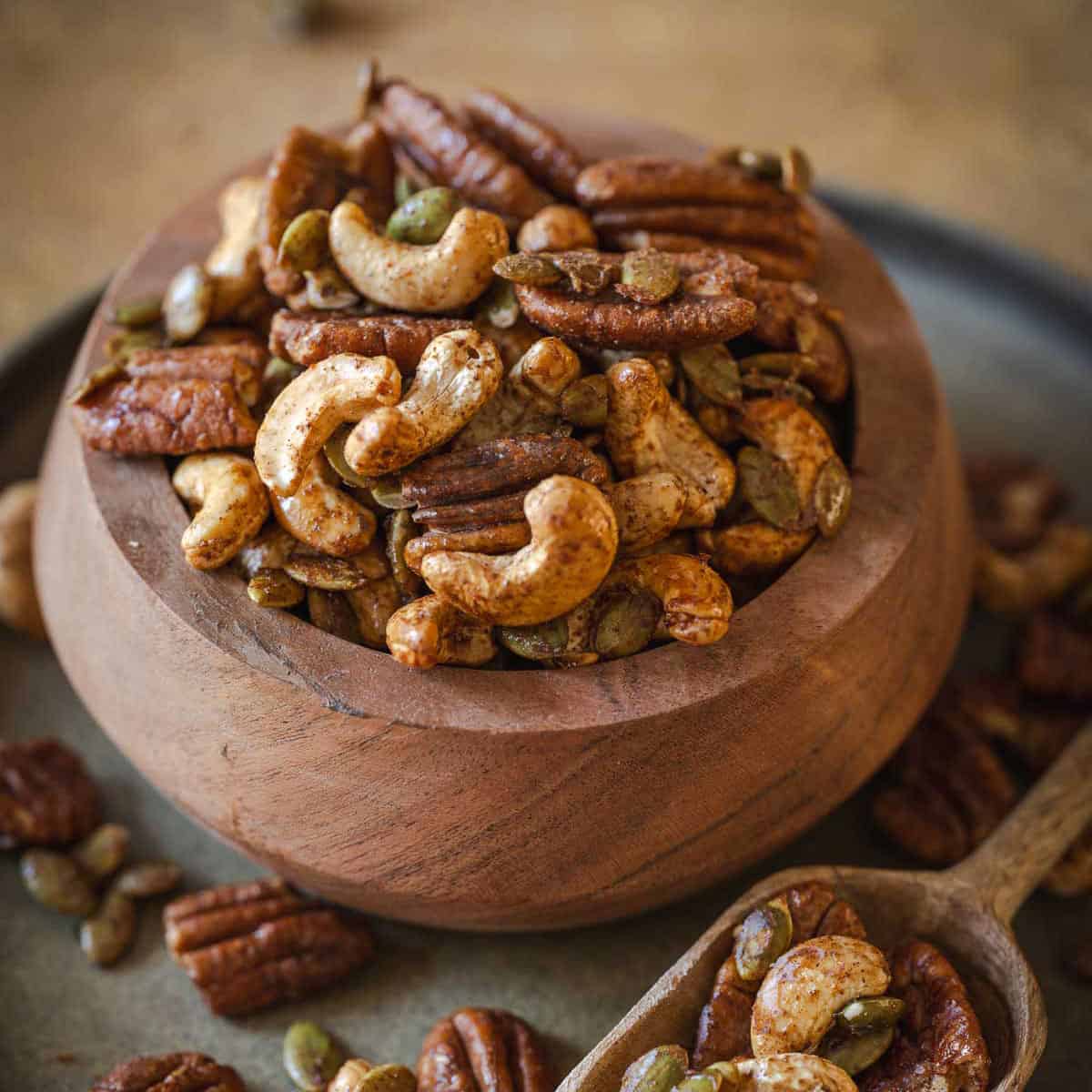
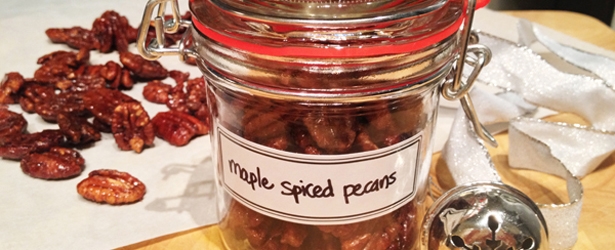
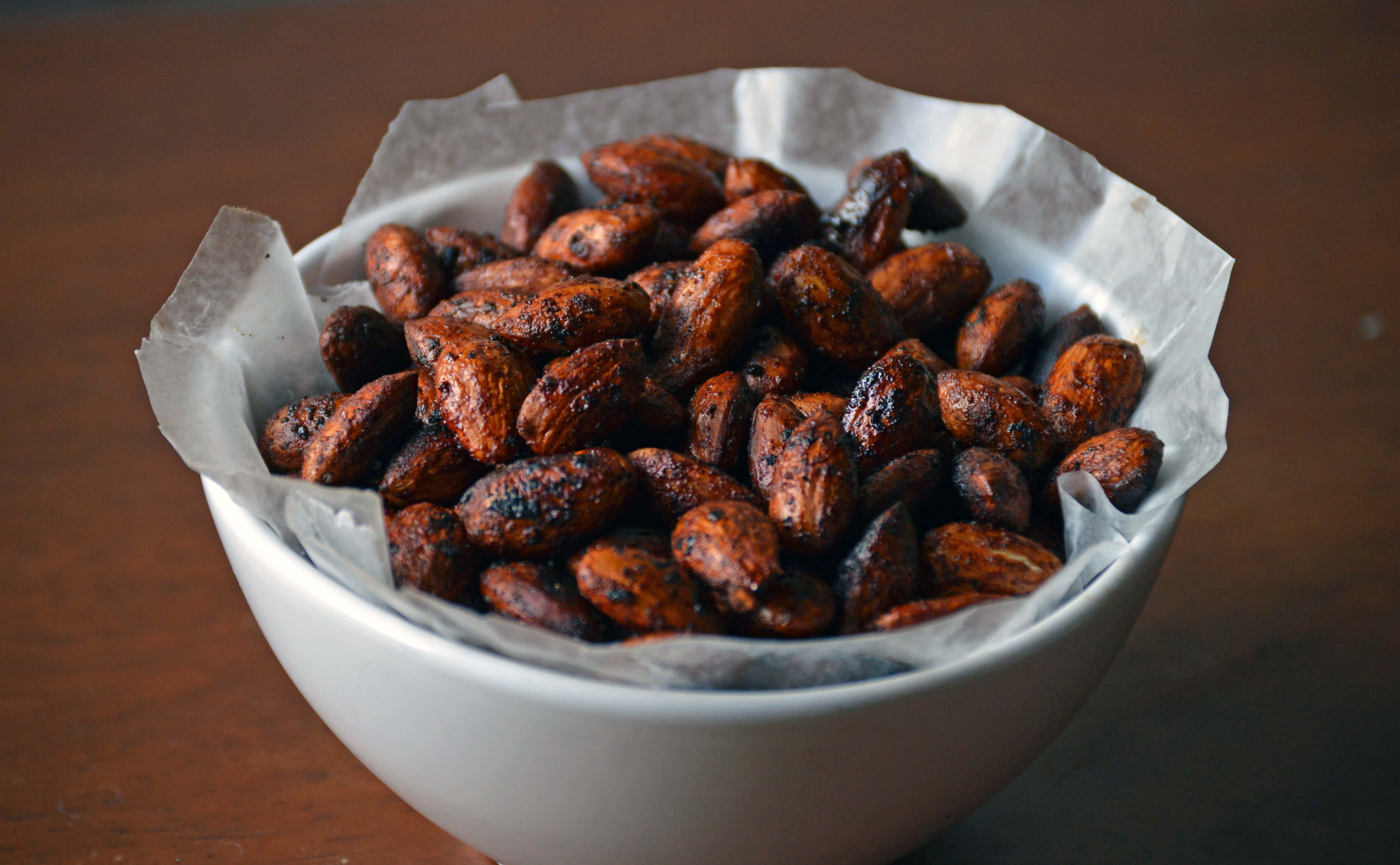

Trail-Ready: 20 Non-Food Items Every Vegan Hiker Needs
Heading out on the trail? It's not just about snacks! From safety gear to creature comforts, these hiking essentials will keep every vegan hiker prepared, comfortable, and ready for adventure.

1. Map and Compass
Even in the age of smartphones and GPS, a physical map and compass are hiking essentials you shouldn't overlook. Batteries die, signals drop, and apps can crash—but a trusty map and compass will never fail you. They allow you to plan your route, track your progress, and find your way back if you stray off the trail.
For vegan hikers exploring new parks or backcountry areas, having a map also helps you identify water sources, campsites, and wildlife habitats, so you can navigate responsibly. Pair it with a basic compass and a little practice beforehand, and you'll hike confidently, knowing you can always orient yourself—even when technology fails.
Don't get lost. Map your adventure the old-school way!

2. Vegan First Aid Kit
A vegan-friendly first aid kit is a must-have for every hiker, because accidents can happen even on well-marked trails. Stock it with essentials like bandages, antiseptic wipes, blister care, and any personal medications you might need. Make sure all items—like adhesive bandages, ointments, or pain relievers—are cruelty-free and vegan-certified, so you can care for yourself without compromising your values.
Beyond the basics, consider adding vegan-friendly electrolyte tablets or natural soothing balms for minor scrapes, sunburn, or insect bites. Keep everything in a lightweight, waterproof container that's easy to grab mid-hike. A well-prepared first aid kit not only protects your body but also gives you peace of mind, so you can focus on enjoying the trail.
Patch up, hike on, and stay cruelty-free!

3. Whistle
A whistle may seem small, but it's a vital piece of safety gear for any hiker. Unlike shouting, a whistle's sharp, consistent sound can carry over long distances, helping you signal for help if you get lost or separated from your group. It's lightweight, durable, and easy to attach to your backpack or belt loop, so it's always within reach.
For vegan hikers exploring remote trails, a whistle adds an extra layer of security without relying on cell service or GPS. Some hikers even carry a signal mirror or small flashlight alongside it for enhanced visibility. Whether you're navigating tricky terrain or just want peace of mind, a whistle ensures you have a quick and effective way to call attention in an emergency.
Blow your own horn. Safety first on every veganventure!

4. Headlamp or Flashlight
A headlamp or flashlight is essential for any hiker, whether you're starting early, finishing late, or navigating unexpected situations after dark. Headlamps are ideal because they keep your hands free for trekking poles, map reading, or setting up camp. A reliable flashlight is a great backup and can be shared among hiking partners.
Always pack extra batteries and check them before your trip. There's nothing worse than running out of light mid-trail. Choosing a durable, eco-conscious, or rechargeable model can align with sustainable values while keeping you prepared. Bright, reliable lighting not only helps you see the trail but also enhances safety by alerting wildlife and marking your position in low-light conditions.
Light up your adventure. Never hike in the dark unprepared!

5. Multi-Tool or Pocket Knife
A multi-tool or pocket knife is a versatile companion for any hiker, perfect for tackling small fixes and unexpected trail needs. Whether you need to tighten a loose strap, cut rope, open a snack, or prepare kindling for a campfire, a reliable tool can save time and hassle.
Choose a compact, durable option with multiple functions—like scissors, a small saw, bottle opener, and screwdriver—so you're prepared for a variety of situations without carrying extra gear.
Keep it safely sheathed in your backpack or on a secure belt loop, and make sure it's cruelty-free and responsibly manufactured to align with your vegan values. A trusty multi-tool gives you confidence and independence, letting you handle little challenges on the trail efficiently and safely.
Be prepared, fix it fast, and hike smarter with a multi-tool or pocket knife by your side!

6. Reusable Water Bottle or Hydration Pack
Staying hydrated is non-negotiable on the trail, and a reusable water bottle or hydration pack is an eco-friendly way to do it. Hydration packs are especially convenient for long hikes. They let you sip hands-free through a tube without stopping or digging in your backpack. A sturdy reusable bottle works well for shorter hikes or when you want to carry extra water in a bottle cage.
For vegan hikers, choosing BPA-free, cruelty-free, and sustainably made bottles keeps your adventure aligned with your values. Consider bottles with insulation to keep water cool, or packs that fit easily in your bag without bouncing.
Regularly refill at clean water sources, and bring a lightweight water filter or purification tablets for remote areas. Staying hydrated boosts energy, improves focus, and helps you enjoy every step of the hike safely.
Sip sustainably. Hydration is your trail superpower.

7. Water Filter or Purification Tablets
When hiking in areas where clean water isn't guaranteed, a water filter or purification tablets are essential for staying safe and hydrated. Filters remove debris, bacteria, and protozoa, while purification tablets kill pathogens, giving you peace of mind on remote trails.
Not all purification methods are vegan-friendly, as some tablets use animal-derived ingredients like gelatin or fish collagen in their production. Look for vegan-certified tablets or plant-based, cruelty-free filtration systems to stay aligned with your values.
Lightweight and portable, these tools are easy to pack and can make streams, rivers, or lakes safe to drink from, extending the reach of your hike without compromising health or ethics. Filter, sip, and stay vegan on the trail. Hydration meets conscience!

8. Sunscreen
Protecting your skin from the sun is non-negotiable on the trail, and choosing a vegan, reef-safe sunscreen ensures you're caring for both your body and the environment. Products like Blue Lizard offer cruelty-free formulas that are gentle on your skin while keeping harmful chemicals out of waterways.
Apply sunscreen generously to all exposed areas, and reapply every two hours or after sweating or swimming. Don't forget easy-to-miss spots like your ears, neck, and the tops of your feet. Carry a small, travel-friendly bottle in your backpack for quick touch-ups during longer hikes. Using vegan, reef-safe sunscreen not only prevents sunburn and skin damage but also helps protect the ecosystems you're enjoying on your hike.
Slather, hike, and shine. Your skin (and the planet) will thank you!

9. Sunglasses
Protecting your eyes from harmful UV rays is just as important as protecting your skin while hiking. Prolonged sun exposure can lead to eye strain, headaches, and long-term damage like cataracts or macular degeneration. A good pair of sunglasses blocks 100% of UVA and UVB rays, shields your eyes from glare, and makes hiking in bright conditions more comfortable.
Consider frames made from recycled or cruelty-free materials. Polarized lenses reduce glare on water or snow, while wraparound styles offer extra protection from wind, dust, and debris.
Sunglasses aren't just a fashion statement. They're a vital piece of trail safety gear that helps you see clearly and hike confidently under the sun. Shade your eyes, hike bright, and keep your vision trail-ready.

10. Hat or Cap
A hat or cap is one of the simplest yet most effective ways to protect yourself from the sun while hiking. It shields your face, ears, and neck from harmful UV rays, reducing the risk of sunburn and heat-related issues. Wide-brimmed hats provide extra coverage, while baseball-style caps are lightweight and convenient for quick hikes.
Look for cruelty-free, sustainably made hats, such as those made from organic cotton or recycled materials. Breathable fabrics and moisture-wicking designs help keep you cool, while adjustable straps ensure a secure fit during windy or rugged trail conditions. A hat not only protects your skin but also helps regulate body temperature and improve comfort on long, sunny treks.
Top it off. Shield your head, stay cool, and hike smarter!

11. Rain Jacket or Poncho
Weather can be unpredictable on the trail, and a lightweight, waterproof rain jacket or poncho is essential for staying dry and comfortable. Wet clothing can sap your energy, lower body temperature, and make even a short hike unpleasant—or unsafe. A good rain jacket is breathable yet waterproof, allowing sweat to escape while keeping rain out, while a poncho can cover both you and your backpack for extra protection.
For vegan hikers, make sure your jacket is made from recycled or cruelty-free materials. Avoid buying a coat with any animal-derived components like down feathers or wool. Features like adjustable hoods, zippered pockets, and roll-up designs make jackets or ponchos practical, packable, and easy to carry.
Staying dry keeps you energized, warm, and ready to enjoy the trail no matter the weather. Don't let anything rain on your parade. Bring your rain jacket and hike on!

12. Extra Layers
Even on warm summer hikes, weather can change quickly, especially at higher elevations. Packing extra layers—like a lightweight fleece, hoodie, or insulated jacket—helps you stay warm, dry, and comfortable when temperatures drop or winds pick up. Layering also allows you to adjust your body temperature throughout the hike, removing or adding clothing as needed.
Choose cruelty-free, sustainable materials such as recycled polyester, organic cotton, or synthetic insulation instead of down or wool. Pack layers that are lightweight and compressible, so they don't add unnecessary bulk to your backpack. Having extra layers can mean the difference between a chilly, miserable hike and a safe, enjoyable adventure from summit to trailhead.
Layer up. Stay cozy, adaptable, and trail-ready no matter the weather!

13. Trekking Poles
Trekking poles are a game-changer for hikers of all ages, providing stability, balance, and extra support on uneven terrain. By distributing some of your body weight to your arms, they reduce strain on knees and joints, making uphill climbs easier and downhill descents safer.
Beyond the physical benefits, trekking poles can enhance your hiking experience, helping you maintain a steady rhythm, navigate rocky or slippery sections, and even probe streams or muddy patches for safety. Many hikers find that using poles allows them to enjoy the trail more comfortably and confidently, whether they're tackling a challenging summit or strolling through a gentle forest path.
Pole your way to a smoother, safer, and more enjoyable hike, perfect for adventurers of any age.

14. Backpack with Comfortable Straps
A well-fitted backpack is one of the most important pieces of gear for any hike. It should be big enough to carry all your essentials—like food, water, extra layers, and safety gear—without being cumbersome or too heavy.
Comfortable, padded straps and an adjustable hip belt help distribute weight evenly, reducing strain on your shoulders and back, so you can hike longer without discomfort. Look for features like multiple compartments for organized storage, water bottle holders, and lightweight, breathable materials.
For vegan hikers, consider backpacks made from sustainable, cruelty-free materials like recycled nylon or polyester and without any animal products like leather or wool.
A good backpack isn't just about carrying gear. It makes your hike more enjoyable, efficient, and safe, keeping everything you need within easy reach while letting you move freely on the trail. Pack smart, hike comfortably, and let your backpack do the heavy lifting, instead of you.

15. Dry Bags or Ziploc Bags
Keeping your gear dry is essential on the trail, especially if you encounter rain, river crossings, or morning dew. Dry bags and resealable Ziploc bags protect electronics, maps, extra clothing, and snacks from moisture, ensuring your hike stays safe and comfortable.
Dry bags are lightweight, durable, and reusable, often made from waterproof materials that can handle rugged conditions.
Ziploc bags are convenient for smaller items, like phones, keys, or trail mix, and they're easy to organize and replace if needed.
Another option is reusable silicone food storage bags. They keep your valuables safe, and they help you stay environmentally conscious by reusing them instead of relying on single-use packaging.
Seal it, pack it, hike worry-free. Keep your essentials dry and your veganventure on track!

16. Biodegradable Toilet Paper and Trowel
Even on short hikes, bathroom breaks are inevitable, and responsible waste management is key to protecting the environment. A gardening trowel allows you to dig a small hole for human waste in areas without facilities, following Leave No Trace principles. Pair it with biodegradable toilet paper to minimize your impact on soil and wildlife.
Using these tools ensures that you dispose of waste safely and hygienically, keeping trails clean and natural for everyone. Lightweight and compact, a trowel and a roll of biodegradable toilet paper easily fit in your backpack.
For added convenience, you can also carry reusable wet wipes or hand sanitizer to maintain cleanliness without harming the ecosystem. Just make sure you discard any wet wipes into a plastic grocery or small garbage bag to throw away after you get back from your hike, instead of putting them in the ground.
Do your business responsibly. Protect the trail while staying fresh!

17. Reusable Utensils and Lightweight Plate or Bowl
If you're enjoying meals or snacks on the trail, having reusable utensils and a lightweight plate or bowl can make eating easier, cleaner, and more eco-friendly. Opt for durable, cruelty-free materials such as bamboo, stainless steel, or BPA-free plastic. These tools are lightweight, compact, and easy to pack, perfect for stirring soups, spreading nut butter, or enjoying a well-deserved lunch mid-hike.
Using reusable options not only reduces waste from disposable utensils but also makes it easier to enjoy your vegan meals in style. Many come with cases or straps for secure packing, keeping them clean and accessible when you need them. With these on hand, you can eat comfortably anywhere on the trail without leaving a trace behind.
Dine sustainably. Trail meals taste better when they're eco-friendly.

18. Camera or Smartphone
A camera or smartphone is perfect for capturing scenic views, wildlife, and trail memories, allowing you to relive your hike and share it with friends. Smartphones are especially convenient because they combine photography, GPS, and emergency communication in one device.
However, it's wise to download offline maps or trail apps before heading out, since service can be spotty or nonexistent in remote areas. Protect your device with a lightweight, waterproof case or dry bag to prevent damage from rain, mud, or drops. Smartphones and cameras align perfectly with eco-conscious gear when paired with reusable charging options like solar power banks.
Snap, explore, and navigate. Capture memories while staying on track.

19. Notebook and Pen
A notebook and pen are simple but powerful tools for any hiker. Use them to jot down thoughts, sketch landscapes, or track wildlife sightings along the trail. They're lightweight, don't rely on batteries, and allow you to document your adventure in a personal, tactile way.
A notebook can be especially helpful for vegan hikers become a space to record plant-based recipes, trail tips, or reflections on nature and sustainability.
If you feel inspired and want to share your experiences with the world, a notebook is the perfect first step. Many bloggers start by jotting ideas down on hikes before taking them online.
Write, sketch, and reflect. Your trail memories can become stories for the world to enjoy.

20. Vegan-Inspired Trail Book or Plant ID Guide
A vegan-inspired trail book or plant ID guide turns any hike into an educational and immersive adventure. Learn to identify edible plants, discover local flora, and gain insight into the ecosystems you're exploring.
These guides help you connect with nature, make sustainable and ethical choices, and even spot plants you might use in future vegan recipes or foraging adventures.
Keep a small book in your backpack or download a digital guide for convenience. Use it to mark interesting finds, take notes, and enrich your trail experience.
If you find these tips and tricks from my vegan hiking guide helpful, bookmark and share this blog post with fellow adventurers so more hikers can enjoy eco-conscious veganventures too.
Explore, learn, and share. Make every hike a mindful, vegan-friendly adventure!

Summary: What Every Vegan Hiker Should Know Before Hitting the Trail
- Plan Your Meals Ahead: Bring enough vegan snacks and meals that are calorie-dense, portable, and easy to eat on the move. Think trail mix, energy bars, fruit leather, and nut butter.
- Pack Non-Food Essentials: Safety, comfort, and convenience matter: map and compass, first aid kit, water filter, sunscreen, and extra layers are must-haves.
- Stay Hydrated: Carry a reusable water bottle or hydration pack and consider a vegan-friendly water filter or purification tablets for remote trails.
- Check Gear for Vegan Materials: Look for cruelty-free backpacks, clothing, and accessories, avoiding leather, wool, or down.
- Know the Trail: Study maps, download offline apps, and understand elevation, distance, and terrain to avoid surprises.
- Protect Yourself from the Elements: Sunscreen, sunglasses, hats, and rain gear will keep you safe and comfortable.
- Leave No Trace: Bring biodegradable toilet paper, a trowel, and reusable utensils. Pack out all trash, and respect nature.
- Add a Touch of Fun and Learning: Bring a plant ID guide, notebook, or camera to observe wildlife, track plants, and document your journey.
- Prepare for Emergencies: Pack a whistle, headlamp, multi-tool, and extra layers. Always tell someone your route and expected return.
- Enjoy and Share: Hiking is about connecting with nature and yourself. Share tips, photos, and vegan-friendly advice with your family, friends, and community to inspire others.

Compassion in Motion: 10 Vegan-Friendly Trails to Explore
Choosing plants for your hike is about more than just fuel. It's about living your values everywhere you go. Every wrap, trail mix, and muffin says, "I can adventure without harm."
Now that you know how to prepare for a vegan hike, here are 10 suggestions for your next veganventure hiking.

1. Zion National Park, Utah
Winter is a magical time to explore Zion, when snow lightly dusts the red rock canyons and iconic trails like Angels Landing and The Narrows. With fewer crowds, you can enjoy serene vistas, crisp air, and peaceful hikes that feel almost private. Trail conditions may be cooler and occasionally icy, so pack extra layers, sturdy boots, and trekking poles for safety.
Nearby towns like Springdale are increasingly vegan-friendly, offering cafés and eateries serving plant-based options, perfect for warming up after a chilly hike.
Winter in Zion is ideal for vegan hikers who want to blend adventure, tranquility, and conscious eating in one unforgettable getaway.
Bundle up, hit the trails, and snack vegan-style while soaking in epic views.
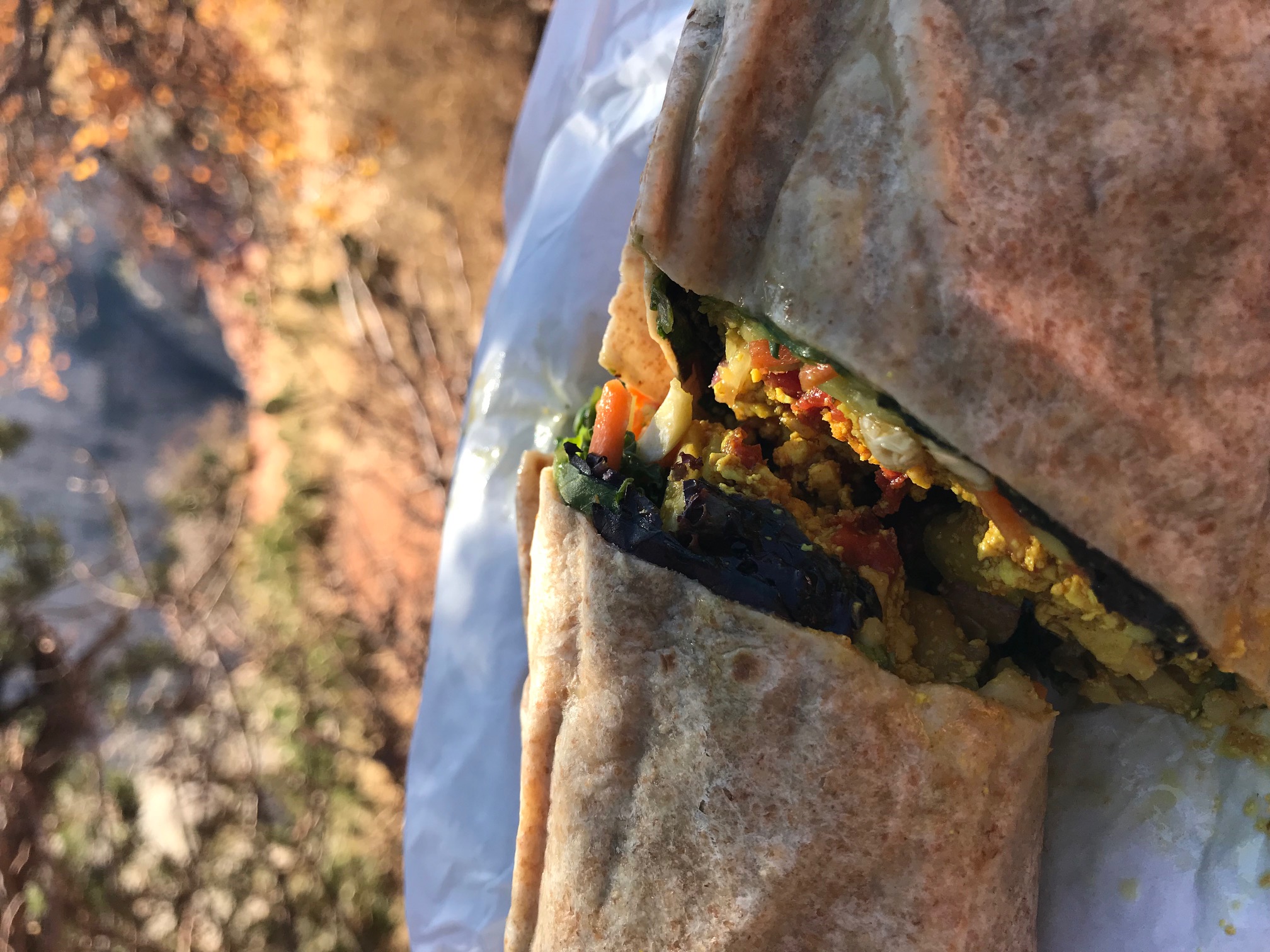
2. Bryce Canyon National Park, Utah
Winter transforms Bryce Canyon into a stunning winter wonderland, where its fiery red hoodoos are dusted with snow, creating dramatic contrasts perfect for photography and quiet contemplation. Trails like Navajo Loop and Queen's Garden offer peaceful hikes, with fewer visitors and crisp, refreshing air.
Evenings in Bryce are magical for stargazing, the clear winter skies make it one of the best spots in the USA to see constellations and the Milky Way. Some of the park's lodges and nearby towns now include plant-based meal options, so vegan hikers can enjoy a hearty, warming meal after a day on the trails, including Bryce, Bryce Canyon City, and Tropic.
Layer up, explore the wintery trails, and enjoy plant-based treats with Bryce's breathtaking hoodoos as your backdrop.
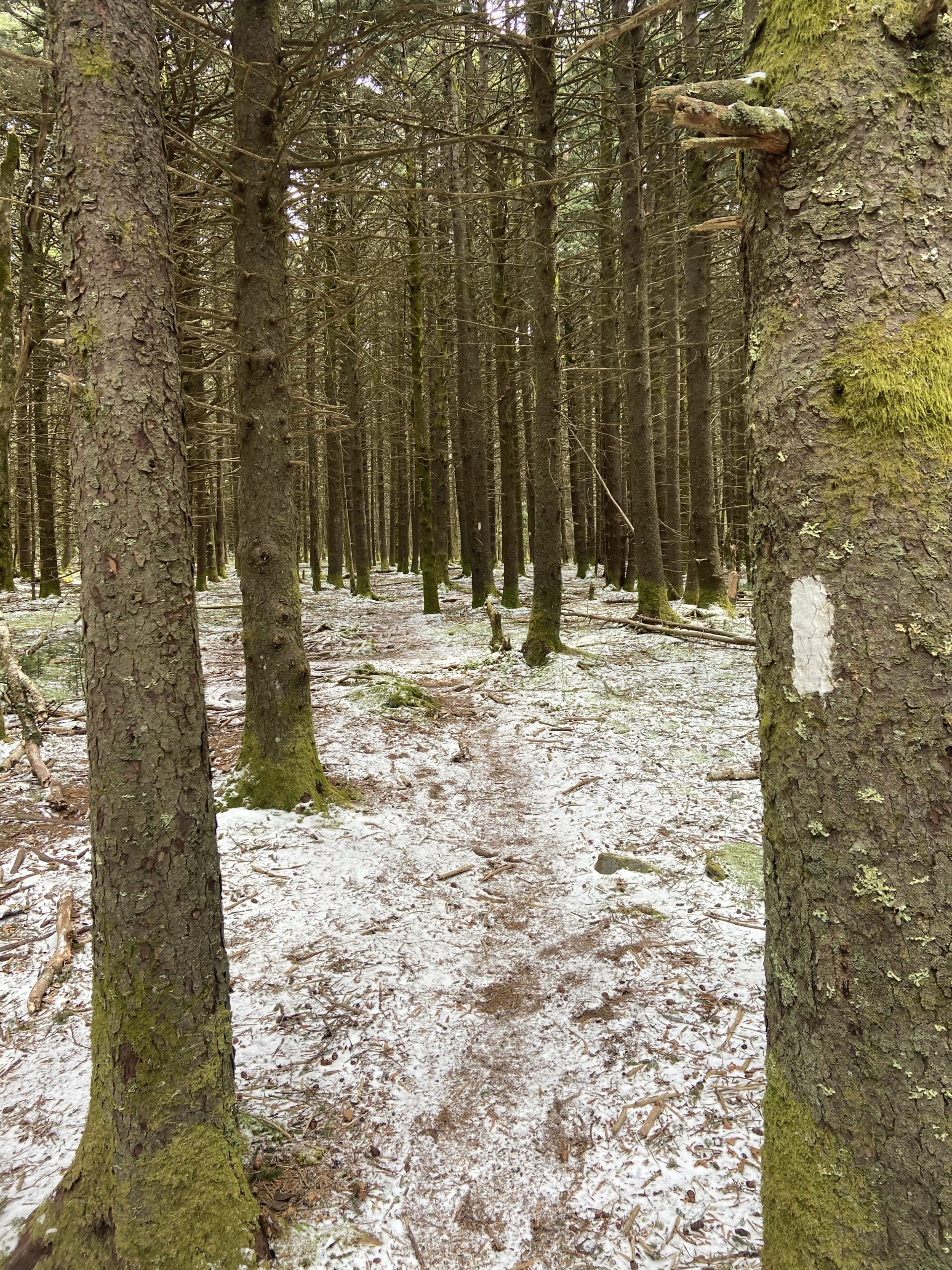
3. Shenandoah National Park, Virginia
The Shenandoah section of the Appalachian Trail is a lush, scenic escape featuring rolling hills, dense forests, and vibrant spring wildflowers. Hike iconic trails like Stony Man or Old Rag for breathtaking overlooks, babbling creeks, and abundant wildlife sightings.
Whether you're tackling a day hike or a multi-day trek, this section offers a moderate challenge with rich natural beauty, making it perfect for both new and experienced hikers.
Nearby towns are increasingly vegan-friendly, providing plenty of options to refuel after a long day on the trail, including but not limited to Harrisonburg, Sperryville, Luray, Front Royal, and Stanley.
Shenandoah's combination of accessible hiking, stunning scenery, and a growing vegan dining scene makes it a must-visit destination for ethical adventurers on the East Coast.
Trek through blooming forests, enjoy plant-based meals in nearby towns, and let Shenandoah's trails inspire your next hike!

4. Banff National Park, Alberta (Canada)
Banff National Park is a stunning alpine playground, and spring is the perfect time to explore as trails thaw and wildflowers begin to bloom. Hike to charming tea houses, soak in glacier-fed viewpoints, or wander along emerald lakes framed by snow-capped peaks. Spring offers fewer crowds than summer, making it ideal for photographers, nature lovers, and those who enjoy a peaceful trek through the Canadian Rockies.
The nearby town of Banff has a growing selection of plant-based dining options, from cozy cafés serving vegan breakfasts and pastries to restaurants offering hearty, locally-inspired plant-based meals, perfect for refueling after a day of alpine adventure.
Hit the trails, snap glacier views, and treat yourself to vegan delights in Banff.

5. Superior Hiking Trail, Minnesota
The Superior Hiking Trail winds along the rugged shores of Lake Superior, offering hikers a mix of boreal forest vistas, cliffside overlooks, and sparkling lake views. The trail is celebrated for its well-maintained paths, clear markers, and scenic campsites, making it accessible for both day hikers and multi-day backpackers. Whether you're tackling rolling hills, forested ridges, or lakefront stretches, the Superior Hiking Trail delivers a rewarding combination of challenge and natural beauty.
For vegan hikers, the nearby towns along the trail—like Duluth and Two Harbors—offer an increasing number of plant-based dining options. Packing portable vegan snacks for the trail is also a great way to keep energy levels high between towns.
Stroll through boreal forests, camp under the stars, and refuel with plant-based eats while soaking in Lake Superior's beauty!

6. Joshua Tree National Park, California
Joshua Tree National Park is a desert wonderland filled with iconic rock formations, rugged trails, and seasonal bursts of wildflowers. Hike through unique landscapes like Hidden Valley, Cholla Cactus Garden, or the challenging Ryan Mountain trail for panoramic desert vistas. The park's stark beauty, dramatic sunsets, and star-filled night skies make every hike a memorable adventure.
Nearby towns, including Joshua Tree Village and Twentynine Palms, offer vegan-friendly options where you can refuel with plant-based meals, smoothies, or snacks after a day of exploring the desert terrain. With proper hydration, sun protection, and cruelty-free gear, Joshua Tree is perfect for adventurers seeking both outdoor thrills and mindful, vegan-friendly living.
Climb rocks, spot wildflowers, and recharge with vegan delights while soaking in Joshua Tree's desert magic.

7. Great Falls Park, Virginia and Maryland
Just a short drive from Washington, DC, Great Falls Park is a perfect escape for hikers seeking dramatic waterfalls, rocky trails, and stunning fall foliage. Trails like River Trail and Billy Goat Trail offer breathtaking views of the Potomac River cascading over jagged rocks, making it a favorite spot for both casual walkers and avid hikers. Fall adds an extra layer of magic as trees burst into fiery shades of red, orange, and gold, creating picture-perfect vistas at every turn.
After your hike, nearby DC and the surrounding area, like Arlington and Alexandria, are rich in vegan-friendly cafés, markets, and restaurants, offering everything from hearty plant-based bowls and sandwiches to fresh juices and desserts. Great Falls Park is ideal for a day trip combining outdoor adventure with mindful, cruelty-free eating.
Hike the waterfalls, marvel at the fall colors, and fuel up with vegan eats just minutes from the city.
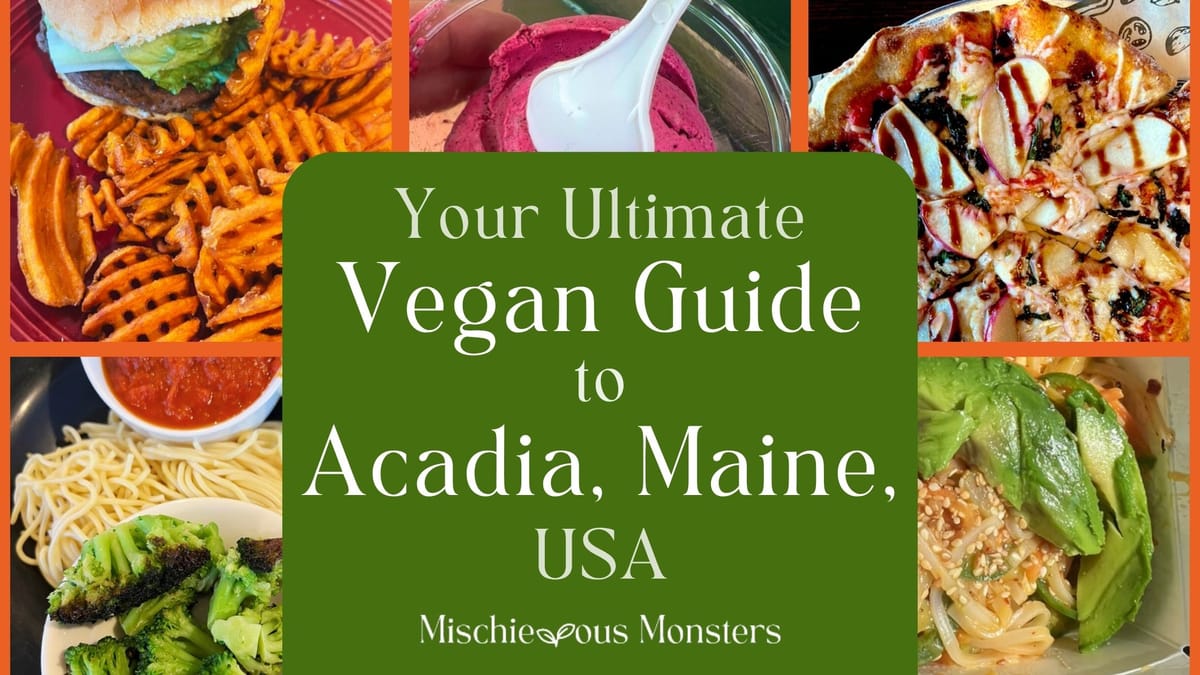
8. Acadia National Park, Maine
Acadia National Park is a coastal gem on Maine's Mount Desert Island, where rocky shorelines, dense forests, and scenic mountain trails create a hiker's paradise.
Fall is especially magical: maple and birch trees blaze with red, orange, and gold, contrasting beautifully with the deep blue Atlantic and rugged cliffs. Trails like Jordan Pond Path, Beehive Trail, and Cadillac Mountain offer panoramic ocean views, glacially-carved landscapes, and breathtaking foliage, making autumn hikes truly unforgettable.
Nearby towns, including Bar Harbor and Ellsworth, boast an expanding vegan-friendly dining scene. I had a easy time finding vegan food there, and I would like to go back to explore more of their options someday.
Trek through fiery foliage, watch the sunrise from Cadillac Mountain, and savor vegan delights in Bar Harbor for the ultimate autumn veganventure.

9. Glacier National Park, Montana
Glacier National Park is a crown jewel of the Rockies, offering alpine meadows, rugged mountain peaks, glacier-carved valleys, and sparkling turquoise lakes. Trails like the Highline Trail, Grinnell Glacier, and Hidden Lake Overlook showcase jaw-dropping views of glaciers, wildflower-dotted meadows, and possible wildlife sightings like mountain goats or bighorn sheep. In fall, the park glows with golden larches and crisp mountain air—perfect for both day hikes and multi-day backpacking trips.
After your adventure, nearby towns such as Whitefish and Kalispell are becoming increasingly vegan-friendly hubs. Hike through alpine wonderlands, gaze into turquoise lakes, and celebrate your adventure with plant-based eats in Montana's welcoming trail towns.

10. Channel Islands National Park, California
Known as the "Galápagos of North America," Channel Islands National Park offers an unforgettable mix of coastal trails, rugged cliffs, wildflower-strewn hillsides, and abundant marine life.
Accessible only by boat or small plane, these islands feel like a world away from the mainland, making every visit a true adventure. Spring and summer are particularly magical—island blooms, migrating whales, and nesting seabirds bring the landscape to life. Hike trails on Santa Cruz Island for panoramic ocean views, kayak through sea caves, or snorkel among kelp forests teeming with marine wonders.
After a day of exploring, nearby coastal towns like Ventura and Santa Barbara provide excellent vegan-friendly dining. These coastal hubs are the perfect places to refuel, relax, and reflect on your island adventure.
Sail to the islands, wander wild coastal trails, and recharge after a day of hiking with plant-based bites when you get back to your hotel.
Why These Trails Work for Vegan Hikers
Each of these destinations offers something special for the plant-powered adventurer:
- Seasonal Beauty: From snow-dusted canyons and spring wildflowers to fiery fall foliage and shimmering alpine lakes, these landscapes invite wonder all year round.
- Trail Variety: Whether you prefer a relaxed park stroll, a desert scramble, a lakeside trek, or a forest canyon adventure, there's a hike that matches your pace and spirit.
- Vegan-Friendly Support: Many of these regions are home to vibrant, eco-conscious communities and towns with plant-based dining—making it easy to refuel ethically after a day on the trail.
Together, they prove that hiking as a vegan is more than possible—it's deeply rewarding. By choosing trails that honor both nature and compassionate living, you're not just exploring the outdoors; you're building a lifestyle that celebrates connection, sustainability, and joy in every step.

Take the Trail, The Vegan Way
Hiking as a vegan isn't just about lacing up your boots and hitting the trail. It's about carrying your values with you into every step. From snowy canyon overlooks to wildflower-lined forest paths and fiery autumn ridges, these trails prove that nature pairs beautifully with a compassionate lifestyle.
With so many destinations offering both breathtaking scenery and nearby vegan-friendly bites, your next adventure can be as nourishing as it is inspiring. Whether you're journaling under the pines, fueling up at a plant-based café, or simply soaking in the silence of the mountains, you're part of a growing movement of hikers who tread lightly and live kindly.
If you would like some help planning your vegan hiking trip, please fill out the form below, and I would be happy to make your vacation dreams come true.
So pack your gear, pick your season, and get out there because the world is full of trails waiting to be explored the vegan way. Until next time!

More Outdoor Adventures
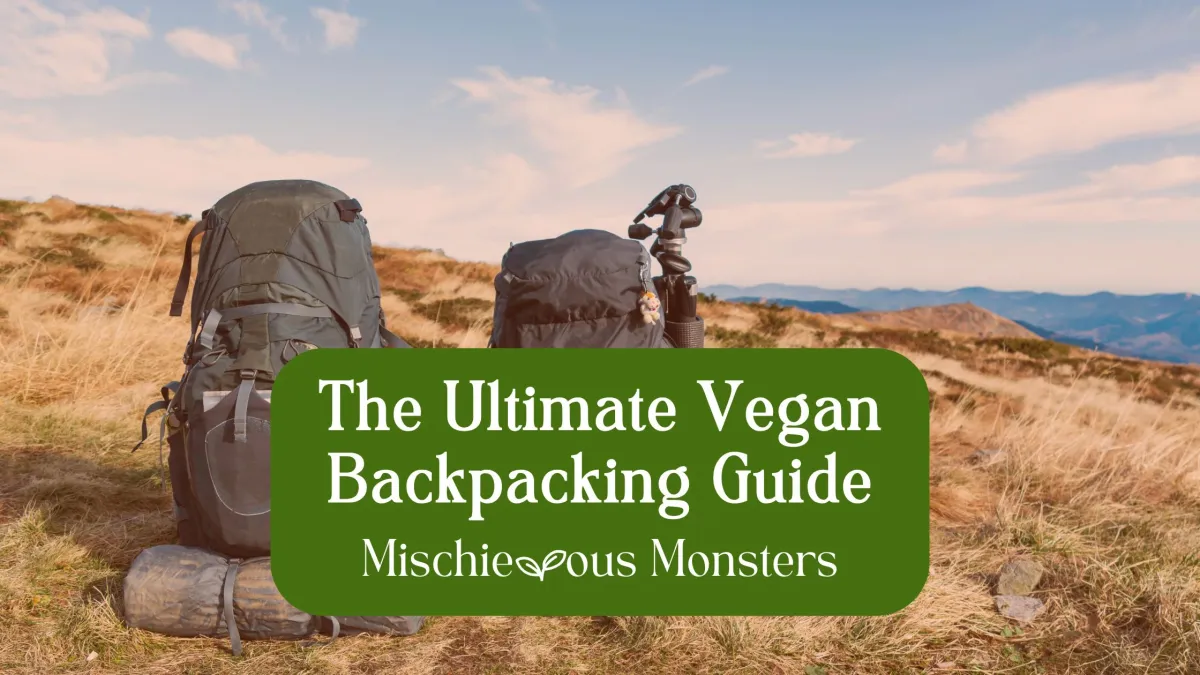

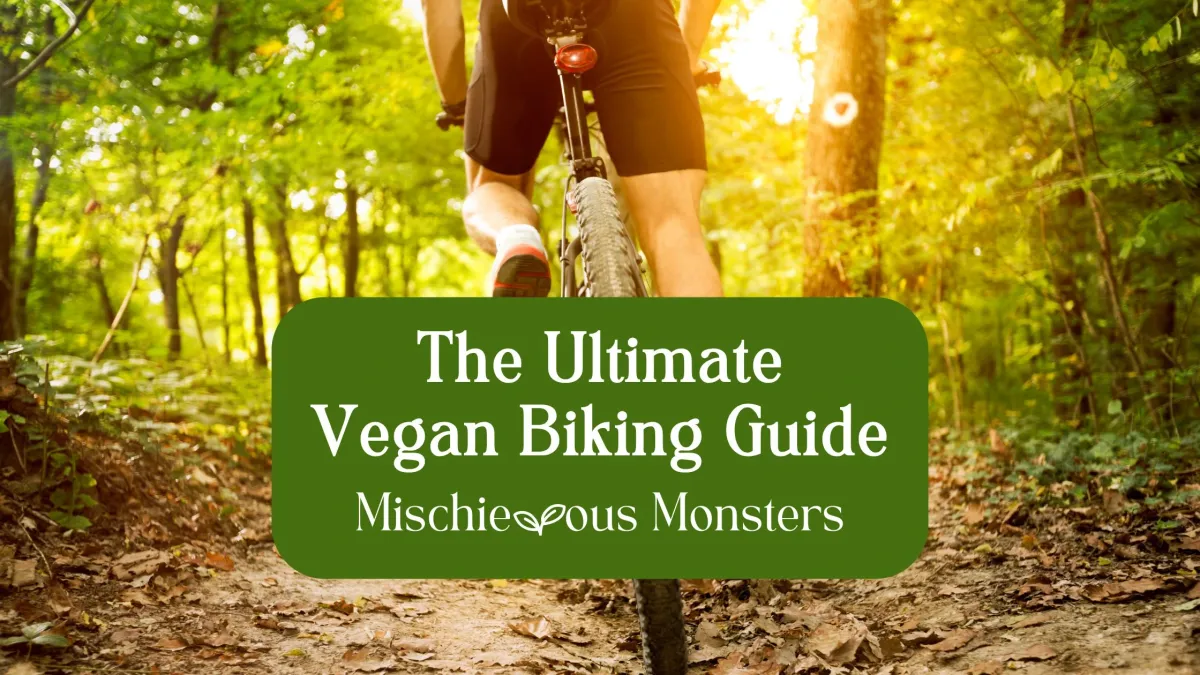
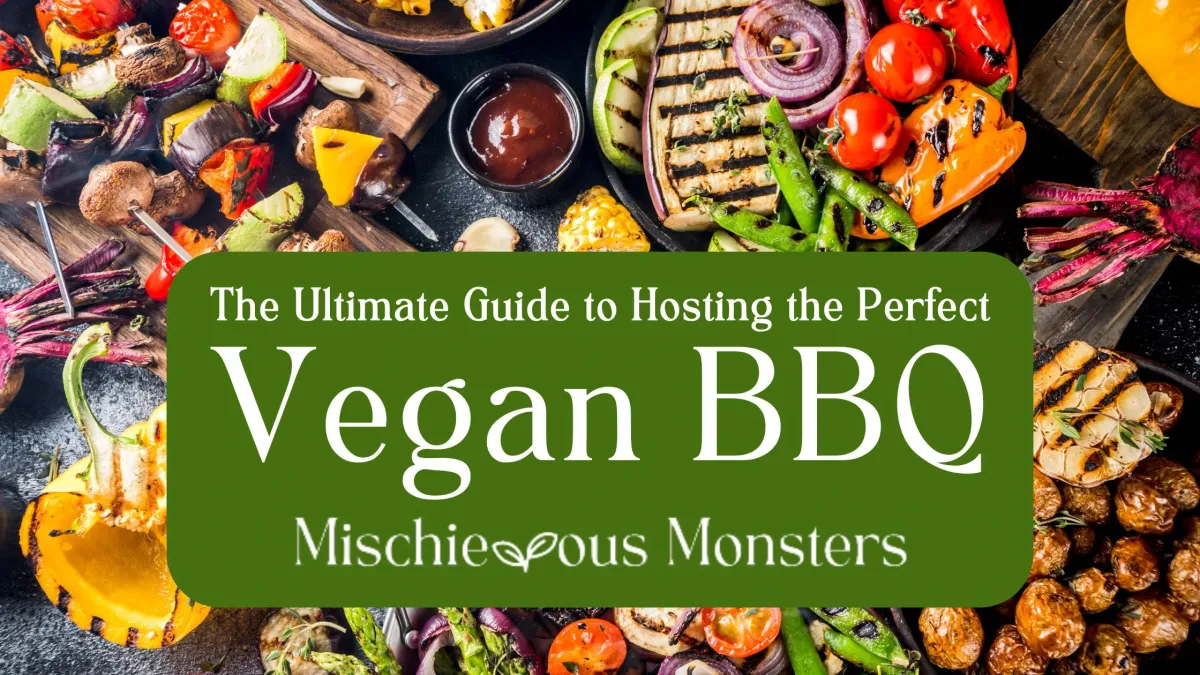
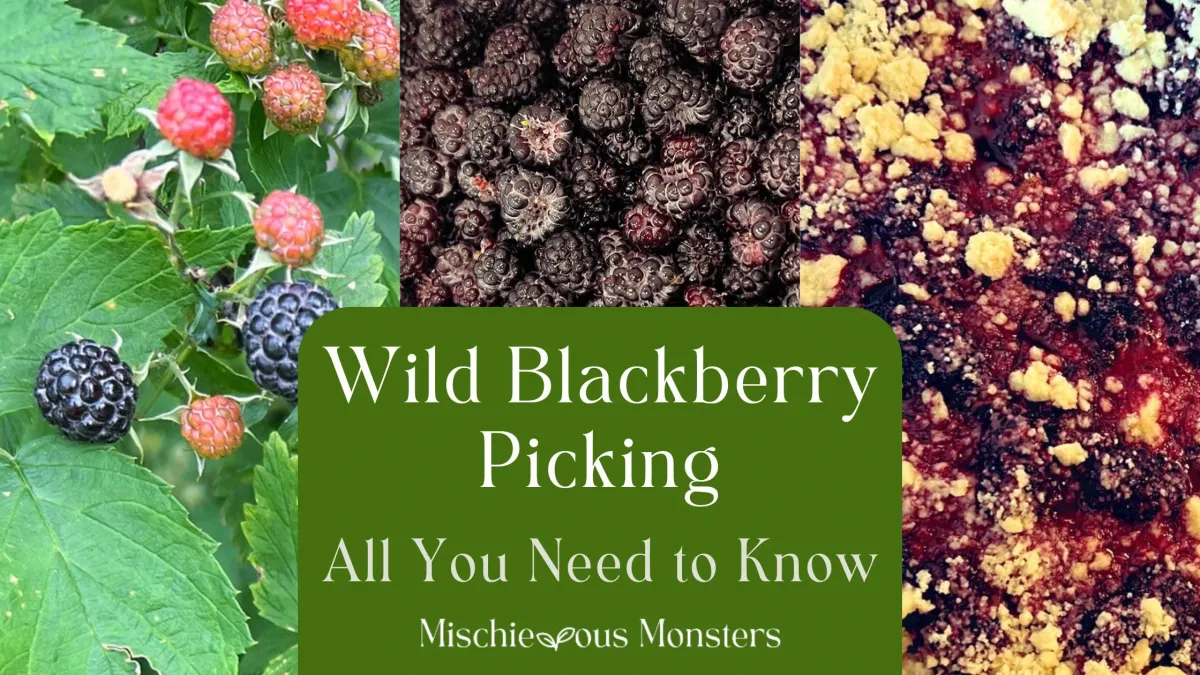
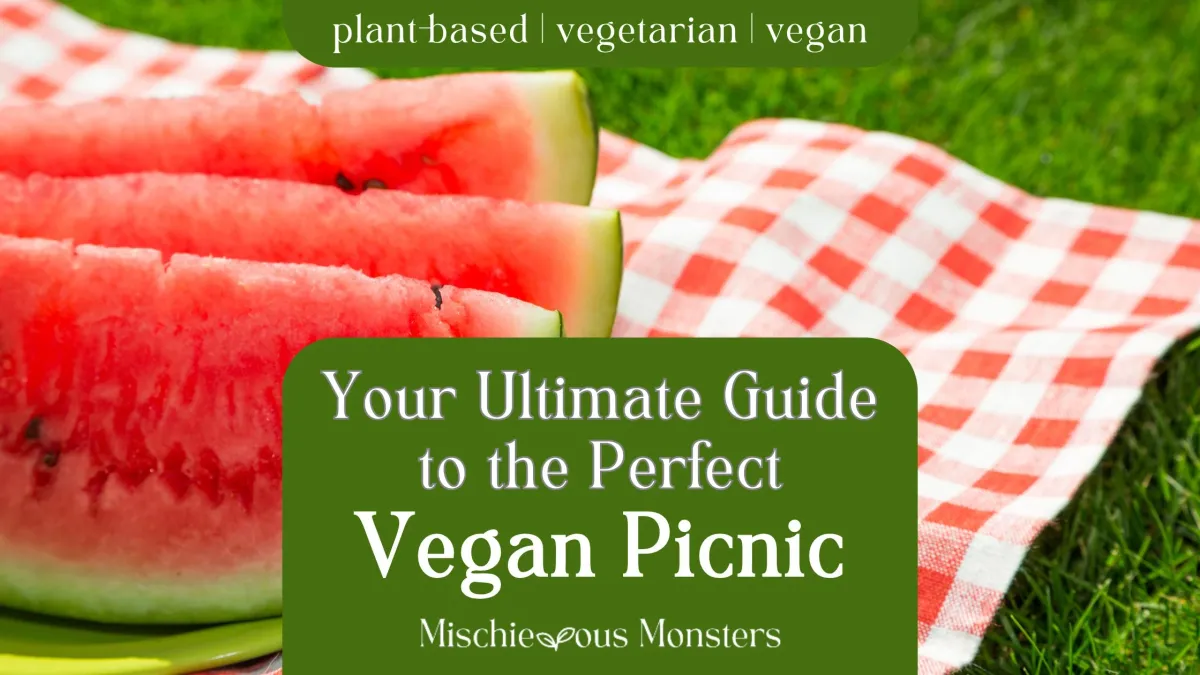
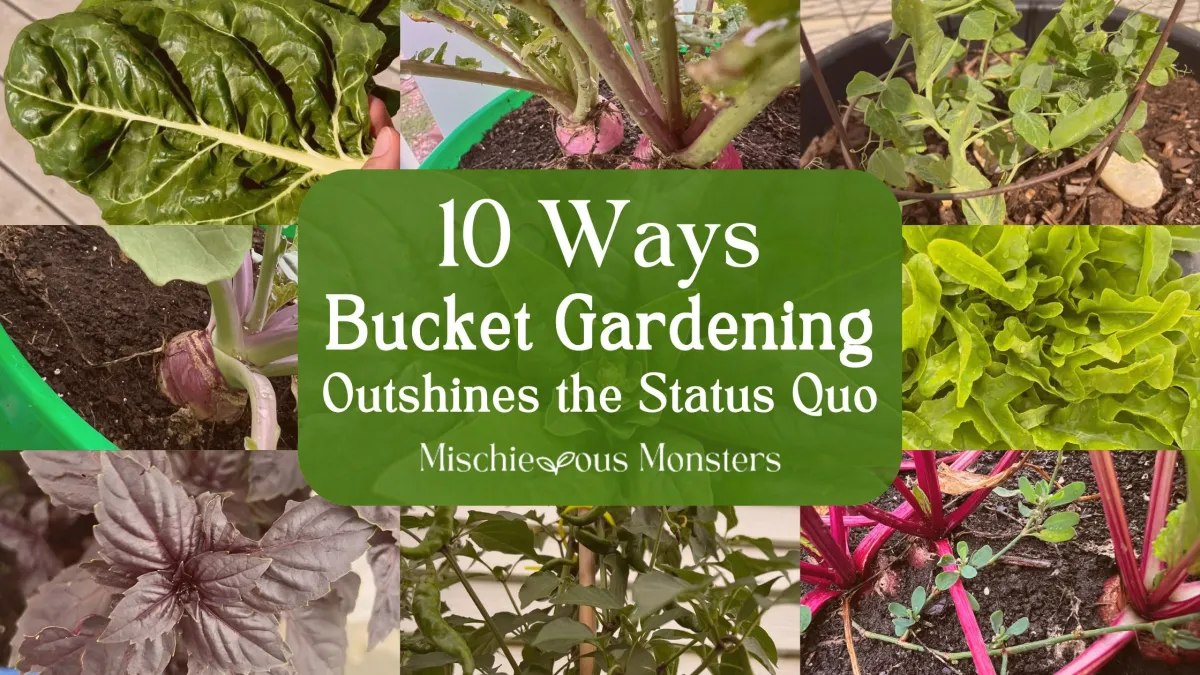
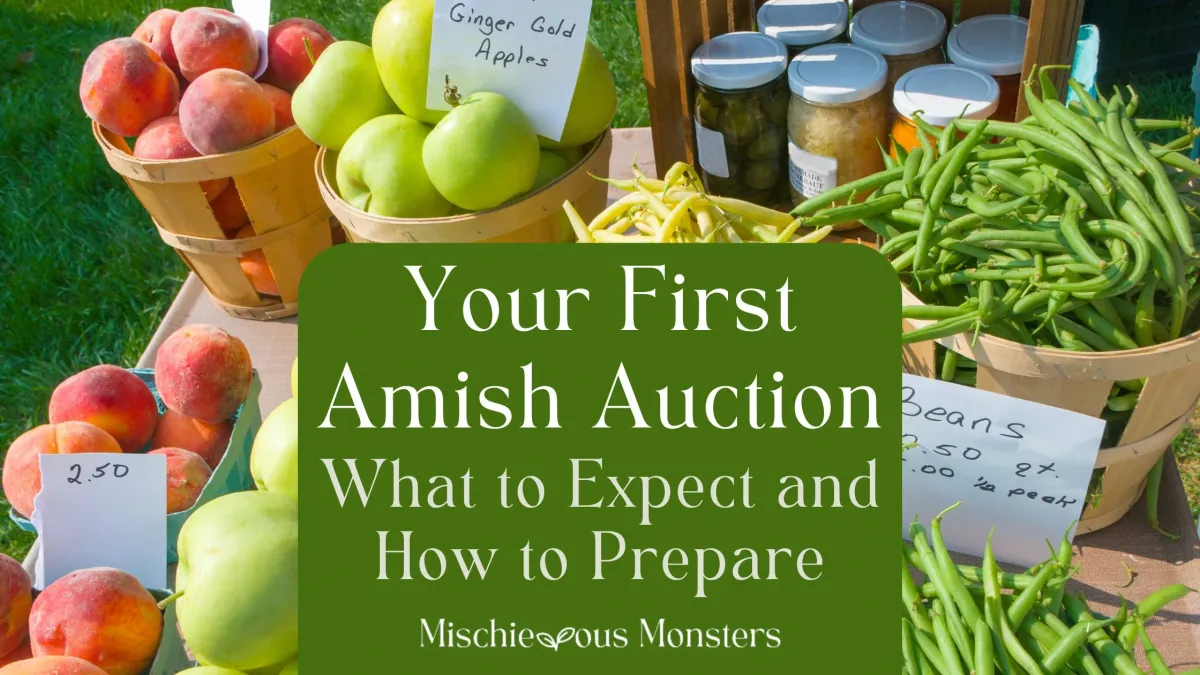

More Travel Inspo

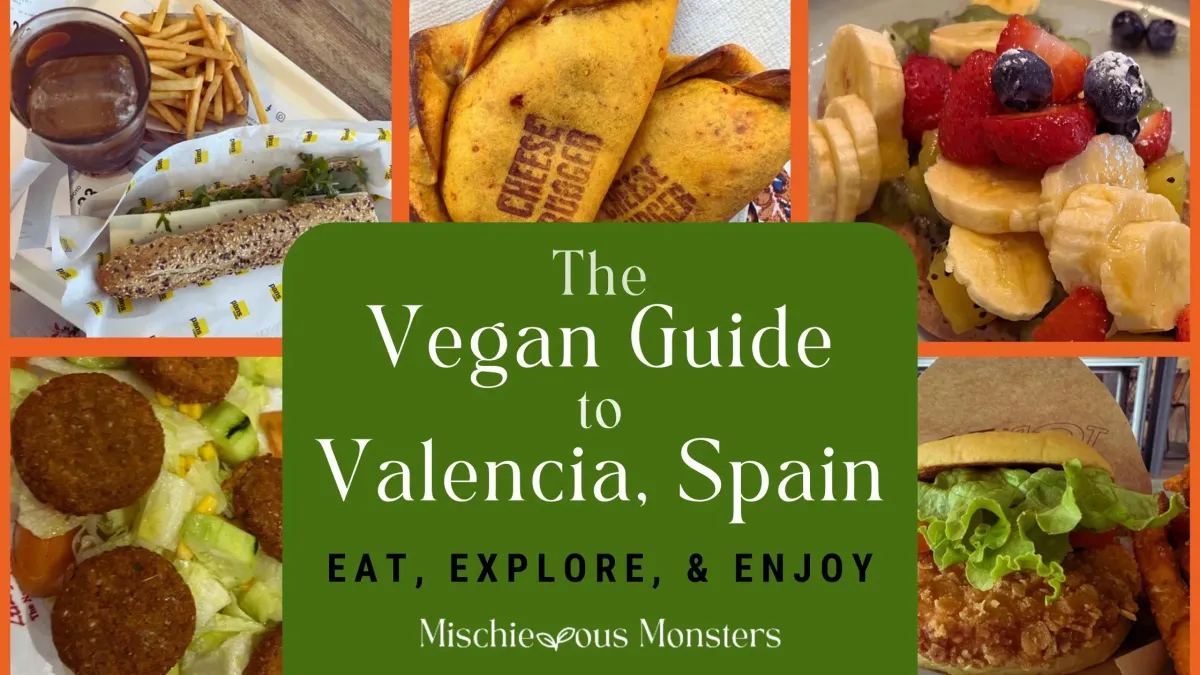
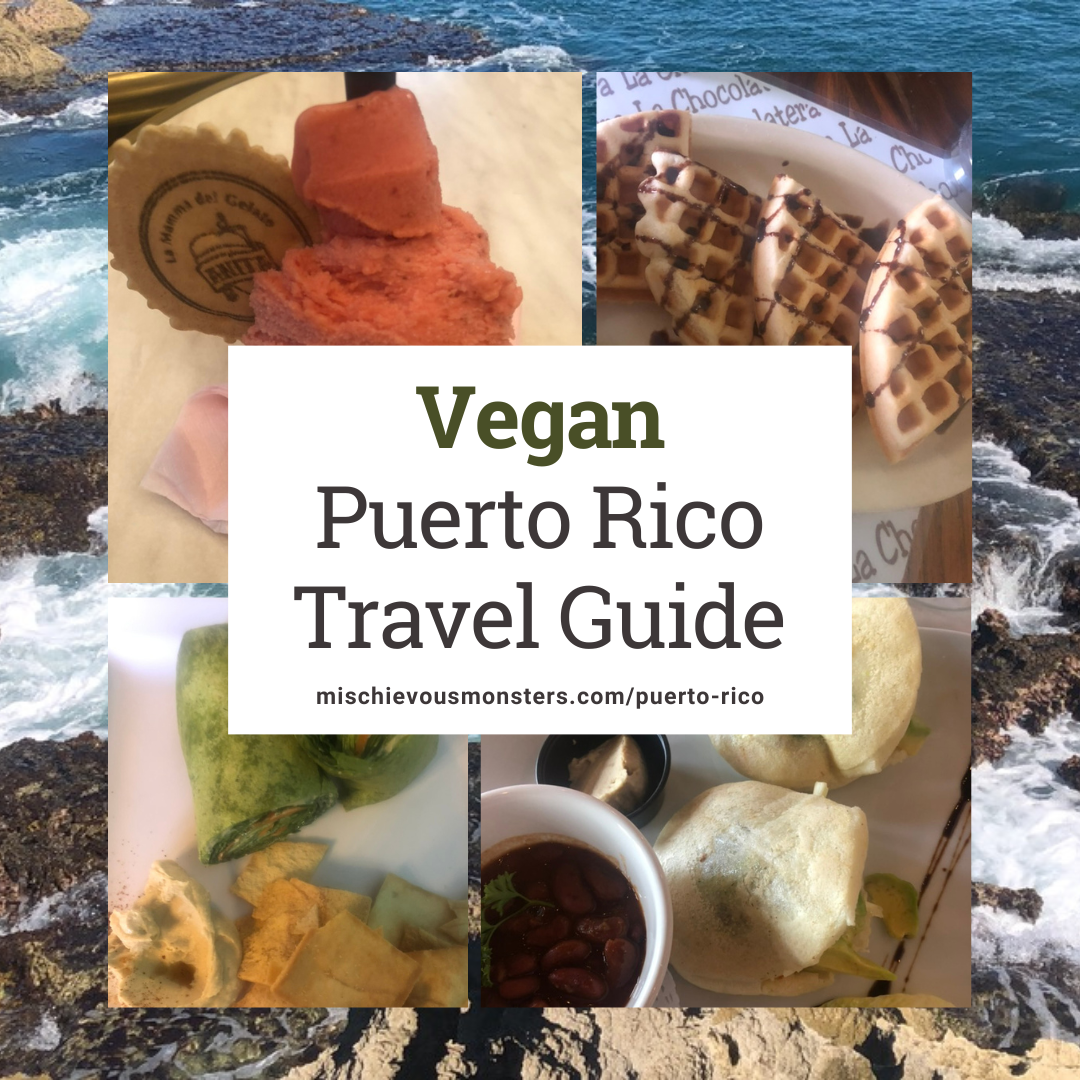
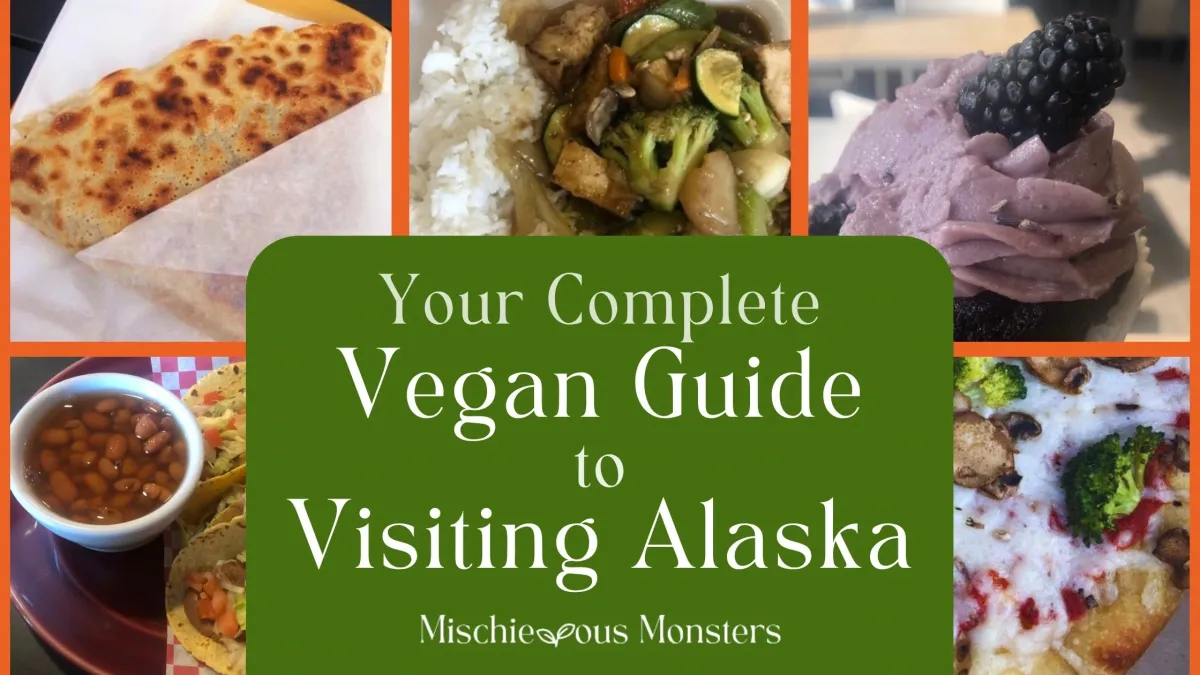

More Newsletters


























































